|
Michigan Composer & Public Educator Andrew David Perkins’ “TUEBOR SUITE” selected as winner of the 2023 American Bandmasters Association Sousa/Ostwald Award.
Perkins’ 2020 work for concert band was selected from 114 entries across 15 countries to receive the prestigious award. Fenton, Michigan, October 7, 2023 The American Bandmasters Association (ABA) has announced Andrew David Perkins (b. 1978), of Fenton, Michigan, as the recipient of the prestigious Sousa/Ostwald Award. Perkins’ composition “TUEBOR SUITE,” was selected after three rounds of review by the ABA committee from 114 entries across 15 countries. Established in 1956, the Sousa/Ostwald Award is among the most prestigious composition prizes in the United States. Composed in 2020, Perkins’ three-movement suite honors the rich agricultural, maritime, and lumbering history of the state of Michigan, incorporating the melodies of numerous folk-tunes. Perkins’ substantial suite was commissioned by a consortium of directors from across the state, to preserve and re-interpret the folk music of the Great Lakes State. “TUEBOR SUITE” will be recognized and performed in Washington DC at the annual American andmasters Association convention, March 8, 2024, by a joint service band composed of members of the US Military Premiere Ensembles. “I’m thrilled and honored that ‘TUEBOR SUITE’ was selected as this year’s recipient of the award,” Perkins said. “I’m a proud Michigander, and I’m so glad that our traditional folk songs are being recognized for their musical importance and historical value. Folk song suites are a staple of the wind band repertoire, painting pictures and telling stories of bygone eras. They help us understand what life was like for our ancestors, their traditions and values, their trials and successes, their hopes and dreams.” Composer, conductor, and music educator Andrew David Perkins holds an advanced specialist certificate in orchestration from the Berklee College of Music, a Master of Music degree from the University of Michigan, and a Bachelor of Fine Arts degree from Michigan State University. A graduate of Rochester Adams High School, he has been a finalist for The National Band Association Revelli Award, Merrill Jones Award, and The Ravel International Composition Prize, and was a quarter-finalist in 2017 for the GRAMMY Foundation Music Educators Award. Mr. Perkins is the winner of the 2018 National Band Association/Alfred Publishing Young Band Composition Contest, and the 2021 American Prize in Wind Band Composition. He resides in Fenton, Michigan with his family, where he composes, teaches public school music, and serves as the Music Director and Conductor of the Fenton Community Orchestra.
0 Comments
Here is the equipment I'm currently using. Scroll down for more thoughts about making a living as a composer...
Below is a pic of my current setup, after the move to an iMac w/ external data & backup: THOUGHTS FOR ASPIRING COMPOSERS:PART 1: AN ARGUMENT FOR MUSIC EDUCATION Although the equipment above is what I use to write, it is obviously not the only way to compose music. Many composers use pencil and staff paper, a piano, or their primary instrument/voice as tools. Formal study (college/university degree in theory/composition) can be a wonderful introduction into the world of composing music, but I often make the argument that earning a degree in MUSIC EDUCATION is a fantastic and practical path to learning composition. I'll continue my rationale below, but first... RANT: Historically, studying music took a wholistic approach, designed to develop well-rounded musicianship. Students learned to perform, conduct, compose, arrange, theorize, instruct, critique, etc. It is the (relatively) recent idea of specialization that has fractured musicianship into sub-disciplines, designed to maximize skills in one of these areas (music education, performance, theory/comp, therapy, etc). Today, when student musicians apply to colleges and universities, they are usually asked to commit to one of these "majors" or areas of concentration, in order to prepare the student for work in that particular field. The result of this model is that we are producing musicians who are very good at one musical discipline, and very inexperienced in the others, and, consequently, they tend to identify with the singular description of that specialization, instead of the wholistic identity of "musician," i.e., "I'm a composer," or "I'm a choral conductor," or "I'm a band director," and so on. Additionally, humans like to put people in boxes, or label them with a single descriptor, which compounds the issue, and in my opinion, discourages musicians to explore every area of their musical interest. This is a shame, because, as I'm about to explain, these disciplines are not as separate or fractured as the academic system makes them out to be. So why do I advocate studying music education as a path to becoming a composer? 1. INSTRUMENTAL METHODS CLASSES Music Education (specifically instrumental) is an incredibly deep, immersive course of study in orchestration. At nearly every major college/university, all instrumental music education majors will take methods courses in every family of instruments. Woodwinds, Brass, Percussion, Strings, Voice, and often Electronics. These methods courses teach you to understand and play the instrument at a basic level, and simultaneously teach you the strengths, weaknesses, advantages and limitations of each. You also learn the challenges of playing the instrument, and what might be appropriate for a beginning player versus an intermediate, advanced or professional player. Nothing beats getting your hands (and mouth or whatever) on the actual instruments. You also can learn so much about timbre, tone production, special techniques/effects, etc., without having to rent instruments and take private lessons. Gold mine. Also, it's fun to learn how to play instruments, period. The knowledge gained here will pay infinite dividends. 2. PERFORMANCE ENSEMBLES Music Education majors are usually required to perform in many diverse ensembles, from concert band to jazz ensemble, choral ensembles, marching band, studio classes, chamber groups, etc., exposing you to a wide variety of ensembles and the incredible literature written for them, teaching you how performing as an individual in such an ensemble works. This knowledge easily translates to orchestration and voicing (if you're paying attention to more than your part) and, more importantly, you are getting a masterclass everyday as you watch the conductor dissect the music and rehearse the ensemble. These ensembles also offer you the opportunity to observe other musicians do the things they do very well. Take notes. Most importantly, you will be exposed to fantastic literature for the ensemble in which you are performing. You will be developing your taste, your preferences, and hearing the music from inside the ensemble, not just from recordings or concerts. This is HUGE. I discovered Holst when First Suite was put on my music stand as a kid. Fall in love with finding new music, anywhere you can get it, especially in live situations, like ensemble rehearsals. 3. BUILDING YOUR NETWORK Music Education is a collaborative, communal experience. You will build lasting relationships with musician friends who will go on to be music directors and conductors. This is possibly the greatest advantage of a music education degree that an aspiring composer can take away, as these will likely be the people who program your music down the road. There is so much music being written and published, having a personal connection to the directors who are selecting music makes a huge difference. People like to work with their friends. Make friends. Be cool, be kind. Nobody wants to work with jerks. 4. SIDE (or main) INCOME Music Education degrees are designed to get you a job teaching music. As you may have figured out, jobs are important, and a job teaching music, either in private lessons, studio classes, or large ensembles in a school setting can provide a very decent living in most places. Very few composers make their entire living solely on income from commissions & music sales. Even with all of the various streams of income from composing (listen to "The Portfolio Composer" podcast immediately), most composers bring in some of their living income from other sources, within the music field or not. Public school teaching jobs don't pay incredibly well, but the health insurance is usually very good, and it is a very consistent income, affording you some free time to work on your craft. You need to support yourself, and teaching can pay the bills. 5. BUILT-IN SCORE STUDY Particularly if you end up teaching large ensembles in schools, score study can be invaluable not only to your students, but to you as you learn about orchestration and voicing. A by-product of score study in preparation for rehearsal is that you notice things like doublings, melodies & countermelodies, harmonic structure & support, form, timbral combinations, inherent balance issues, on and on. Reverse engineering great compositions is part of any degree in composition, so you might as well get paid to do it as a band or orchestra director. It will make you a better teacher, conductor, and composer. 6. ACCESS TO AN ENSEMBLE Be careful here, as you never want to "use" your students in ANY way... but it is often very appropriate to put new music in front of your school band or orchestra for sight reading practice. As the director, you have the option to read your own compositions with your ensemble, to get realistic feedback about how well something works (or doesn't). Again, you need to be judicious with this, and only do it if it's appropriate and about the students in your ensemble first, never at the expense of more important curricular goals or use of rehearsal time. After a concert is a great time to do this. When I was a HS band director, I made a point to never sight read or program more than one of my pieces per year (and some may have even felt that was too much). On the other hand, a director who is also a composer/arranger can be invaluable to a program, providing the students with myriad opportunities to be creative in class, develop their own musical ideas, etc. Take a balanced approach and keep the big picture in mind of course, but its worth pointing out how convenient it is. 7. ECONOMY This is a touchy subject, but I'll try to state my biased opinion as simply as I can: You can be composer with a music education degree. You can not be a teacher (in a public school, in most states) with a degree in composition. A degree in music education can lead directly to a job as a music educator more so than a degree in composition can immediately lead to earning a living from composing. That being said, under no circumstances should you get a music education degree if you absolutely don't want to teach! If the only thing you want to do in the world is compose, and go to graduate school to compose more, then by all means, explore that path. The same goes for a degree in performance, you can't teach with it, but you can get a gig with an ed degree and chops. Again, these are just my opinions, don't @ me. 8. BUILT-IN INDUSTRY CONNECTION As a music educator, you are automatically connected to the industry. You are invited to conferences, masterclasses, clinics, etc. You receive magazines and newsletter from music publishers and other composers, you are connected to institutions of higher learning (both from graduate degrees and from interacting on behalf of your students), and it's part of your everyday life. You're connected to an incredible group of music educators who love making and teaching music, to students who will evangelize your works (if they like them/you!) and to a community whose entire purpose is to connect with each other through the wonderful gift of making music together. Composing is largely a solitary thing, alone with a computer, piano or staff paper, and having a "day job" that keeps you connected to real people is a nice balance. Also, kids are wonderful, kids in music are the best. They inspire. There are obviously many, many ways to express yourself through music, and I'm not discouraging anyone from doing it their own way. I've found that my career as a music educator and conductor have fostered and supported my career as a composer, and vice versa. As I said earlier, the wholistic approach to musicianship is ancient, and while not everyone MUST develop every area of interest, I'm certain that there are benefits to doing so. PART 2: TAKE ACTION You could sit here reading about being a composer, or you could be composing music. Only the latter will make you a composer, so get on it. You don't need permission, or a degree, or anyone's approval. You don't even need expensive equipment, computers, instruments, etc. Depending on what you're writing, you don't even need other people to perform it. Just start. Here's how: 1. START SMALL It's probably (absolutely) a poor choice to let your excitement or ambition convince you to attempt an entire symphony as your first opus. Even the greatest composers in the history of the world started small, writing for piano or their primary instrument only. If you play a monophonic instrument like clarinet or trumpet, try writing something for one or two clarinets or trumpets. Then go a a trio, then a quartet or quintet. Then try changing the voicing, clarinet & alto sax, or flute & oboe. Beg your friends who play those instruments to read the (short!) piece. LISTEN TO THEIR FEEDBACK and don't blow them off. Even if you have access to a large ensemble, be careful about jumping right into a big, long, full ensemble work. If it goes terribly, it can be really disheartening, so it's better to start small, have little successes and failures, and grow from there. Walk before you run, run before you jump hurdles. SPOILER: Your first works will likely not be amazing... that's just how it works. Don't be discouraged, your skills will catch up with your taste eventually. 2. TRY EVERYTHING For a long time, I thought that scoring film would be the most amazing, life-affirming career possible. After actually scoring films, and realizing the incredible complexity, restrictions, heartbreaks, and frustrations that can accompany the thrill, I realized that writing for concert ensembles was much more satisfying for me. It's OK to try things and change your mind. But you have to try them first, otherwise it's all conjecture. Don't say no to an opportunity just because it isn't exactly what you think you want to do forever. 3. STEAL EVERYTHING (most of it is free anyway) We live in an age where nearly EVERY piece of information is available, for free, with an internet connection. With enough time and discipline, you can exhaustively research Rhythm, Melody, Harmony, Tempo, Texture, Timbre, Dynamics & Form, and still have barely scratched the surface. You can listen to ensembles of every possible combination, performing music of unimaginable variety. You can reach out across the planet without leaving your home or public library, to communicate with other musicians, teachers, performers, etc. to learn, collaborate, do commerce and so on. There really is no obstacle but the time that you make for it, and the determination you have. Yes, it is wonderful to be lucky enough to afford a formal education (and there is a huge piece about class and privilege that I'm not addressing here), but my point is that most of the excuses for not living out your dreams are in your head. 4. GO FOR THE "NO" My Dad always told me to ask for a better price on something because "all they can say is no." This has always been great advice in many areas of my life, including my career as a composer. When you're reaching out to friends, colleagues or even musicians that you don't know personally, remember to be courteous, respectful, and simply offer what you have. If they're interested, they will respond, but be prepared to hear "NO" a lot, or more likely, nothing at all. Musicians are busy people, and there is a great deal of music out there already, so don't take it too personally. It might not be a good fit for their ensemble, their current programming choices, their budget, or their taste. Make absolutely certain that you have some kind of audio preview (even a midi mockup) and score to share with them, or you won't be taken seriously at all. This is where the personal relationships can really have value, as it is much more likely that someone who knows you from social/academic circles will take your email or call and respond positively. This is not always true, and don't be offended if your friends aren't into your music, it's not personal. Composers sometimes have a hard time with this (we're pretty thin-skinned as a demographic...) as do most artists. Remember, all they can say is no, or nothing at all, and that's OK. 5. GET A MENTOR (or fifty) While it's true that every shred of human knowledge is available on the internet, there's nothing like another human being who can give advice, feedback, encouragement, congratulations, consolations, and so on. I'm always amazed when I think about the wonderful music educators, directors, and friends who gave me a chance and told me they believed in me when they absolutely didn't have to. People who care about you can give necessary feedback in a constructive way, without crushing you. They can also open doors for you by giving your work a "stamp of approval" or serving as an advocate, either by programming your works or encouraging other to do so. They can give you fresh ears on music that you're too close to. Most importantly, they are the people with whom you will share music making, which is exactly why you're into this in the first place. Don't be afraid to ask someone to take a look and listen to your work. It can be scary, especially if you respect them tremendously, but it's worth it. This is also true in the area of music publishing and business. Other composers have been absolutely invaluable to me as I began to self publish my catalog, work with distributors, negotiate commissions, etc. Again, all they can say is no. 6. DON'T GIVE UP (but do take breaks) Making a living as a composer is a long-term investment and a life-long pursuit. I often remind my self that many of the composers I admire wrote their best work in their 60's and 70's. Not everything you write will be amazing, and you don't have to release everything you write. Try not to compare your music or your career to others, every one of us has a unique voice and different path. Big projects take time, be patient. Also, fast music is written very slowly, don't be discouraged by how much longer it takes to write a million notes versus a thousand. Sometimes you need to step back and take some time away from the project, or work on something else entirely. This is also why it's nice to have a different "day job," so that you're able to walk away from the project without the threat of foreclosure or starvation looming. PART 3: WRITING/ENGRAVING PROCESS Every composer works differently, and many composers have many different processes. Here is what I usually do: 1. Sketch. This is sometimes done on the piano, but almost always it's me singing into my iPhone voice recorder. I have dozens of little voice memos of ideas, and I'll keep adding ideas as they come. This way I can get it down as fast as I can sing it. 2. I'll mockup the sketch ideas in Logic X. This is also where I edit and shape the form, and sometimes come up with the actual structure or the work. Often this mockup process will be 99% exactly the orchestration and voicing in the final work. The main reason I love working in Logic is because of the sample libraries that I use (listed above), and how accurately they represent what it will actually sound like. Much of it is trial and error, and I love the discovery of timbral combinations I stumble upon in this process. 3. Transcribe, note for note, from Logic to Sibelius. Sibelius is where I have built my templates for scores & parts, and from there I export PDFs, assemble with Preview, and send to the print house (Subito does an amazing job) or directly to musicians as digital delivery. I'll also send the PDFs to my proof reading team, where they will inevitably find errors, and I'll make edits before sending to distributors like JWPepper, Stanton's or Midwest Sheet Music. Here is a YouTube video I made about this process: After an incredible premiere with John and the GLHS Wind Symphony last month,, CLUTCH. has a handful of exciting performances coming up in the next few weeks. Rob Ash and the Ann Arbor Huron HS Symphony Band will close their program with it at the Michigan Music Conference in Grand Rapids next week, and I visited rehearsal this past Wednesday night. The group sounds fantastic, and it was a pleasure to spend some time discussing music with Rob & Bob Reynolds. Jeff Heisler is playing the Maslanka Sax Concerto with them, and it was awesome to hear him play. If you're going to be at the MMC, you should check out Huron's performance at 4 on Friday in DeVos Hall.
I'm very pleased to announce that "UNTIL THE NIGHT COLLAPSES" has been selected as a semi-finalist in the 19-20 Band/Wind Ensemble professional composition division of The American Prize national non-profit competitions in the performing arts! I'm incredibly grateful to Dr. Michael Thomas King & Dr. Bruce Moss, and the Bowling Green State University Concert Band for their fantastic performance and recording of the work. The piece was dedicated to the students, parents & staff of Marjory Stoneman Douglas HS in Parkland, Florida, and their Director, Mr. Alex Kaminsky. It is equally important to recognize the members of the commissioning consortium, whom through their support made manifest the urgent message that bi-partisan action on common sense gun reform must be taken: Dr. Michael Butler, Director of Bands - University of Wisconsin, Stevens Point Brad Davis, Director of Bands - Flushing High School Wind Ensemble Brad Farynairz, Director of Bands - Woodhaven High School Bands Russ Hilton, Director of Bands - L’Anse Creuse High School Bands Bill Petersen, Director of Bands - Freeport High School Symphonic Band James Ross, Director of Bands - East Kentwood High School Bands Mark Stice, Director of Bands - Okemos High School Bands John Szczerowski, Director of Bands - Grand Ledge High School Bands David Uhrig, Director of Bands - Rochester High School Wind Ensemble Here's the link to the announcement: http://theamericanprize.blogspot.com Here's the link to my post from the premiere at BGSU: UNTIL THE NIGHT COLLAPSES (World Premiere) A few weeks behind on posting this, but December is nuts. The World Premiere of CLUTCH. at Grand Ledge was an absolute blast. These awesome kids completely embraced the piece, and put their soul into the performance. I've found a dear friend and champion of my music in the brilliant conductor John Szczerowski, can't thank him enough for commissioning this piece and investing so much into it's realization. I'm looking forward to continuing our professional collaborations, and making music and memories together for a long, long time. BUCKLE UP!
The ASCAP Plus Awards program rewards ASCAP writer members of children's music, concert music, jazz and musical theatre with a value beyond the scope of performance surveys (those who make a contribution to the music scene but make less than $25,000 per year in royalties from performances.) I'm very pleased to share that I've received this honor for the third consecutive year. The award covers work created and performed in 2018 which included THE RAPTOR RIDES THE WHALE, PRAYERS IN VILLEFRANCHE (String & Brass Band transcriptions), KODACHROME, UNTIL THE NIGHT COLLAPSES, and RUSHLIGHT.
Thanks to the many directors and colleagues who commissioned and programmed these works, both RAPTOR and COLLAPSES were consortium commissions and were only realized through the brilliant work these supportive directors and talented ensembles. Through its annual ASCAP Plus Awards program, ASCAP compensates those writers whose works are substantially performed in venues and media outside its surveys. An independent panel reviews the applications and makes cash awards to deserving members as well as writers whose works have a unique prestige value. I'm thrilled to share that GRADIENTS has been selected as the winner of the 2019 National Band Association/Alfred Publishing Composition Contest. My deepest gratitude to the commissioning consortium who brought this piece to life: Matt Baker, Cooper Middle School Bands, Benjamin Baldwin, Holly High School Bands, Kevin Culling, Chippewa Middle School, Jake Greenwood, Leslie Middle School Bands, Spencer Nesvick, Houston Middle School Bands, Joshua Roltsch, Fowlerville Junior High School Bands, Sean Spicer, Lake Fenton Middle School Bands, Jeff Stimson, Parker Middle School Bands, Heather Wiggins, McBain Rural Agricultural School Bands. Special shout out to Jed Maus for his incredible performance of GRADIENTS at The Midwest Clinic last December! New Music Review featured in THE INSTRUMENTALIST MAGAZINE: "This creative and innovative new selection is best suited to middle school and high school ensembles, and plays at the more difficult end of grade 2.5. The composer suggests that an industrious band director working with science and math departments cold develop this composition as a successful interdisciplinary tool." More than one person have asked about my writing process, and since I'm transcribing CLUTCH right now, here's how I do it: I’m excited to share that I have again received an ASCAP Plus Award! The ASCAP Plus Awards program rewards ASCAP writer members of children's music, concert music, jazz and musical theatre with a value beyond the scope of performance surveys (those who make a contribution to the music scene but make less than $25,000 per year in royalties from performances.)
The Plus Awards are generally small monetary awards, but they are prestigious and highly competitive. This is my second award and it is quite an honor. The award covers work created and performed in 2017 which included ASYLUM, GRADIENTS, & NOBLE GASES. Thanks to the many directors and colleagues who commissioned and programmed these works, as well as the Royal College of Music, London for the premiere performance and recording of NOBLE GASES. Through its annual ASCAP Plus Awards program, ASCAP compensates those writers whose works are substantially performed in venues and media outside its surveys. An independent panel reviews the applications and makes cash awards to deserving members as well as writers whose works have a unique prestige value. 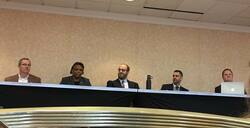 MMC 2019 is a wrap, huge congrats to Eric Crimmins and the Lake Orion Scripps Middle School band for their killer performance of THE RAPTOR RIDES THE WHALE! I also had a great time at our session with Dr. Michael King, Dr. Arris Golden, Dr. David Biedenbender, and Mr. Mark Stice, "Art at your Fingertips: Collaboration with Composers for school ensembles." I never get tired of joining forces with the many wonderful, dedicated & passionate music educators in our great state! See you in 2020. I'm thrilled to share that ASYLUM recently was selected as a Finalist for the 2018 NBA Revelli Award! (Congrats to Wayne Oquin for his winning entry "Song for Silent Voices," it's absolutely gorgeous.) Thanks to Rachel Linsmeier, Mark Stice, Michael Thomas King, David Thornton and Kevin Sedatole for bringing the piece to life! You can listen to the recording with Kevin and the Interlochen World Youth Wind Symphony below: I'm super excited to announce that "ASYLUM" has just been selected as a semi-finalist in the 18-19 Band/Wind Ensemble professional composition division of The American Prize national non-profit competitions in the performing arts! THANK YOU Kevin Sedatole and The Interlochen Center for the Arts World Youth Wind Symphony for an incredible performance and recording! Here's the link: http://theamericanprize.blogspot.com
Thursday night was the world premiere of UNTIL THE NIGHT COLLAPSES, performed by the Bowling Green State University Concert Band under the direction of Dr. Michael Thomas King. The piece is dedicated to the students, parents & staff of Marjory Stoneman Douglas HS in Parkland, Florida, and their Director, Mr. Alex Kaminsky was in attendance, having spent the day talking with the BGSU students and Ohio music educators about his experiences with the recent shooting in Parkland. Commissioned by an incredible consortium of ten directors across the midwest, this was the first of many premiere performances coming up in the next few months, and it was a profoundly moving experience. I can't say thank you enough to the directors in addition to Dr. King and Dr. Bruce Moss who made this possible, including:
Dr. Michael Butler, Director of Bands - University of Wisconsin, Stevens Point Brad Davis, Director of Bands - Flushing High School Wind Ensemble Brad Farynairz, Director of Bands - Woodhaven High School Bands Russ Hilton, Director of Bands - L’Anse Creuse High School Bands Bill Petersen, Director of Bands - Freeport High School Symphonic Band James Ross, Director of Bands - East Kentwood High School Bands Mark Stice, Director of Bands - Okemos High School Bands John Szczerowski, Director of Bands - Grand Ledge High School Bands David Uhrig, Director of Bands - Rochester High School Wind Ensemble Alex made it clear that he and his students are embracing and living out the words of Leonard Bernstein, "This will be our reply to violence: to make music more intensely, more beautifully, more devotedly than ever before." My hope is that this piece can in some way contribute to healing, and begin more conversations about our uniquely American problem. My deepest gratitude to Mr. Kaminsky for engaging with all of us with this work and beyond. I'm looking forward to hearing his ensemble perform in Chicago in a few weeks. Dr. Michael Thomas King and Dr. Bruce Moss graciously invited me to visit Bowling Green State University this week, to spend time collaborating on several of my works for wind band. In my brief time there, several things made an impression on me: 1. BGSU is clearly a place where new music is respected, promoted and honored. 2. The quality of the ensembles and rehearsal atmosphere reflects a strong tradition and legacy of excellence. 3. Mike King is a legitimate PRO. In the short time I was on campus, I saw him rehearse the Academy Band, University Band, Concert Band, Wind Symphony and Marching Band, meet with students and colleagues, make time for score study and rehearsal prep, and still make it a priority to show Natalie and I around campus & town. He also planned our entire itinerary, and I stole a half-dozen rehearsal strategies from him too. I'm both incredibly proud of him and honored that he is doing such great with with BGSU and the wind band repertoire.
The University Band is programing THE RAPTOR RIDES THE WHALE and PRAYERS IN VILLEFRANCHE, and the Academy Band is doing a great job with RAPTOR as well. Mike is guest conducting the Concert Band, who will be performing the world premiere of UNTIL THE NIGHT COLLAPSES in a few weeks. It was just fantastic to work with Mike and the ensemble, creating a clear interpretation of the piece. It's a complex, heavy work that I think is the most important thing I've written, and Mike has really dedicated himself to crafting the performance. Bruce has invited Alex Kaminsky (DOB @ Marjory Stoneman Douglas HS in Parkland FL, to whom the piece is dedicated) to join us for the premiere, and I think it is going to be a deeply moving and meaningful event. I cannot possibly express my gratitude to Dr.'s Mike & Bruce, and to the consortium of directors who commissioned the work. Recordings from the BGSU ensembles coming soon! The Midwest Clinic requires composers and publishers whose works are being performed to either advertise in the program or be an exhibitor with a booth. Jed Maus & the Keller MS Wind Ensemble are performing GRADIENTS (Woooooo!) and I def didn't want to be tied to a table in a booth... so here's my ad. (Credit Stice for the QR code idea.)
As with all technology, things began to fail on my 2009 Mac Pro tower, starting with the dedicated PCIe SSDs for streaming virtual instruments. I also couldn't run a current operating system, and there were so many bugs that I finally bit the bullet and migrated to a new machine.
I'm a big fan of buying slightly older equipment, as the depreciation is so crazy after a year or so. After way too much consideration, I went with a 2017 iMac Quad-Core 4.2 GHz with 64GB Ram (maxed out). It has a 500GB SSD boot drive dedicated to OS and Apps. My 3TB Raid Data drive is connected via Thunderbolt 3 and housed in a OWC enclosure along with the 2TB Backup Time Machine. I took those drive directly out of the old Mac Pro and plugged them into the enclosure... and it all worked. Just a little bit terrifying to move precious data like that. I'll definitely be starting a Smartypig for a new machine in about seven years, my guess is that by then, everything will be SSDs. The only downside to this move was losing my ability to write for a few weeks, and pushing back the planned release of HORROR VACUI, but whatevs. Gear. It was a real pleasure to hear the WMU Wind Symphony perform ASYLUM today, with my friend and mentor Scott Boerma conducting. Scott has been someone I have looked up to since undergrad, having performed his arrangements & compositions at MSU and in drum corps. When I was finishing my graduate degree at Michigan, Scott was on my thesis defense panel, and his masters thesis was a component of mine. He is a consummate musician, and an incredibly warm and charismatic leader and person. I was absolutely honored to hear his interpretation of my work. The musicianship of the WMU Wind Symphony is just ridiculous. They programmed David Blon's transcription of Jennifer Higdon's "Machine," the Holst "First Suite" conducted by WMU Emeritus DOB Robert Spradling, "Aspen Jubilee" by Ron Nelson, and Paul Dooley's INSANELY COOL work "Masks and Machines" along side "ASYLUM" and nailed everything. A huge thank you and congrats goes out to Scott and all of the fine musicians who performed today.
A few weekends ago I had the incredible experience of visiting the Interlochen Arts Camp to work with Kevin Sedatole and the World Youth Wind Symphony on "ASYLUM." This opportunity was uniquely special for me, having spent two summers as an Interlochen camper in high school. It was there that I made the decision to follow a career path in music, and being back there decades later as a guest composer was incredibly rewarding. The calibre of these young musicians is just unreal, and their nuanced performance reflected it. They responded to Kevin's expressive interpretation immediately and with a depth that I was not expecting. While I was impressed by their technical and ensemble clarity, I was even more affected by how musical and emotive their playing was. It reminded me of why I wanted to be there as a teenager, and how I felt like I had found my tribe. Natalie got some great shots from the rehearsal (below the video) too. It was great to spend some time with Kevin making music, and sharing my inspiration for the piece with the kids. It was also fantastic to briefly visit with Mike Kaufman, Matthew Schlomer and Jennifer Jolley at rehearsal. My friend James Gross came up from Blue Lake for the gig, as well as the MSU graduate conducting "Rat Pack" Branden Steinmetz, Travis Higa, Tyler Austin and Hunter Kopcyznski. Great to see Steve Davis as well, he puts together an unbelievable experience for the WYWS every summer. The spirit and intention of the place is alive and well; It continues to draw people near who deeply love and value music and art. I was absolutely honored to be part of it all once again. A HUGE thank you to Kevin for the invitation and moving performance! A few weeks late with this post, but what a fantastic experience this was! Chris Takis and James Gross recently invited me to visit and hear their outstanding ensembles. Grosse Pointe South HS is one of several institutions this year who have invited me to participate in a mini-residency (programming several of my works with different ensembles), and I couldn't be more honored. The bands, under the baton of my friend and fellow MSU Spartan Marching Band alum Chris Takis programmed GRADIENTS, ALCATRAZ and they were part of the commissioning consortium for THE RAPTOR RIDES THE WHALE. I got to work for a bit with their percussionists and they were full of enthusiasm for the special effects. On the orchestra side, my friend James Gross programmed PRAYERS IN VILLEFRANCHE and it was just lovely. It was the first performance of the strings only arrangement of the work, and they did a beautiful job.
Aside from living the dream of composing music and hearing it performed well, the best part of wearing the composer hat is being able to re-connect with friends and colleagues, and make new connections in the process. Ensemble music brings people together in the best way, working together to bring a common vision to life. No competition, no ratings, simply the active, collaborative creation of new art with people who share a passion for music. Thanks Chris & James! Wednesday night I visited the BHHS orchestra rehearsal and worked with them on RUSHLIGHT, which will premiere in a few weeks. Scott Wolf has done a fabulous job preparing these fine student musicians, and it was a pleasure to help them contour their performance and interpretation of the work, and to talk about the inspiration for the piece. Thank you again to Alan Posner, Scott Wolf and everyone in the Bloomfield Hills community who supported this commission to honor Bob Ambrose and Dave Reed. I'm excited for May 20!
Yesterday I visited a rehearsal at Lake Fenton Middle School with my good friend and fellow Spartan Bone Sean Spicer. Sean is absolutely killing it at LFMS along with Ryan Gonder (another very good friend and fellow Spartan Bone... whatup with Spartan Bones and amazing music educators?) and the word that I left the rehearsal with was "authenticity." They're doing everything right, scheduling, teaching, creating culture with their band program. I'm super proud to have these guys in my backyard (literally) and very grateful that Sean joined the GRADIENTS consortium last summer. It was a treat to guest conduct at the concert last night too. THANK YOU Sean!
I had an incredible day visiting the concert ensembles at Grand Ledge HS under the baton of John Szczerowski. GLHS is one of several institutions this year who have invited me to participate in a mini-residency (programming several of my works with different ensembles), and their program is, in a word, exemplary. John is honoring the rich tradition at GLHS of producing high calibre ensembles and programming quality literature, and I was honored to hear three of my pieces among them today, GRADIENTS, CONSPIRACY THEORIES, and THE RAPTOR RIDES THE WHALE, of which they are members of the commissioning consortium. It was a blast to hear his groups perform my pieces and have a chance to take them through some interpretive turns. As I expected, these groups were well prepared (HUGE Kudos to Tavia Zerman!!!) and focused. They take music-making very, very seriously, but were not afraid to have fun with it either. John has also commissioned me to compose a fanfare for his top group, and CLUTCH will be in collaborative development over the next year. GLHS will perform my music on May 9th and 14th, 2018. Don't miss it!
The second of two visits to GRADIENTS Commissioning ensembles today was to Leslie High School, under the superb direction of Jake Greenwood. Jake is a fellow Spartan (dang if MSU doesn't churn out the exceptional music educators...) and has been at Leslie for 8 years. I was honestly blown away by their execution of this piece today. The Leslie HS Band was a joy to conduct, we spent the entire clinic working on advanced musical concepts, playing with the musical interpretation of 'Gradient', which we were able to do because their performance was nearly flawless (and I'm picky). Not only did they nail the piece, they were SILENT and focused throughout warmup and during our work together. This group is disciplined, talented and well-coached. Nothing but positive things going on in Leslie and there is a lot to be proud of. Congrats to Jake and the ensemble, and THANK YOU for supporting the production of this work!
(Bonus: Jake emailed last week asking if there was anything I needed for today's clinic, to which I sarcastically replied "nothing beyond the requisite bottle of Möet on ice, a selection of silk robes from which I will choose one to wear during the clinic, and a small chorus of sycophants to nod in agreement with my every word." They called my bluff. I love Band kids.) The first of two visits to GRADIENTS Commissioning ensembles today was to Fowlerville Junior High School, under the direction of Josh Roltsch. Josh and Bill Vliek (Go Green my dudes) have done a great job with this program, and the 8th grade band has been working hard over the last few weeks on this piece. It was clear to me that these kids are engaged and that the program is well staffed & supported. I'm very thankful that instrumental music is so important to Fowlerville, and that Josh jumped on the opportunity to support the production of the new work. Nice work Gladiators!
|


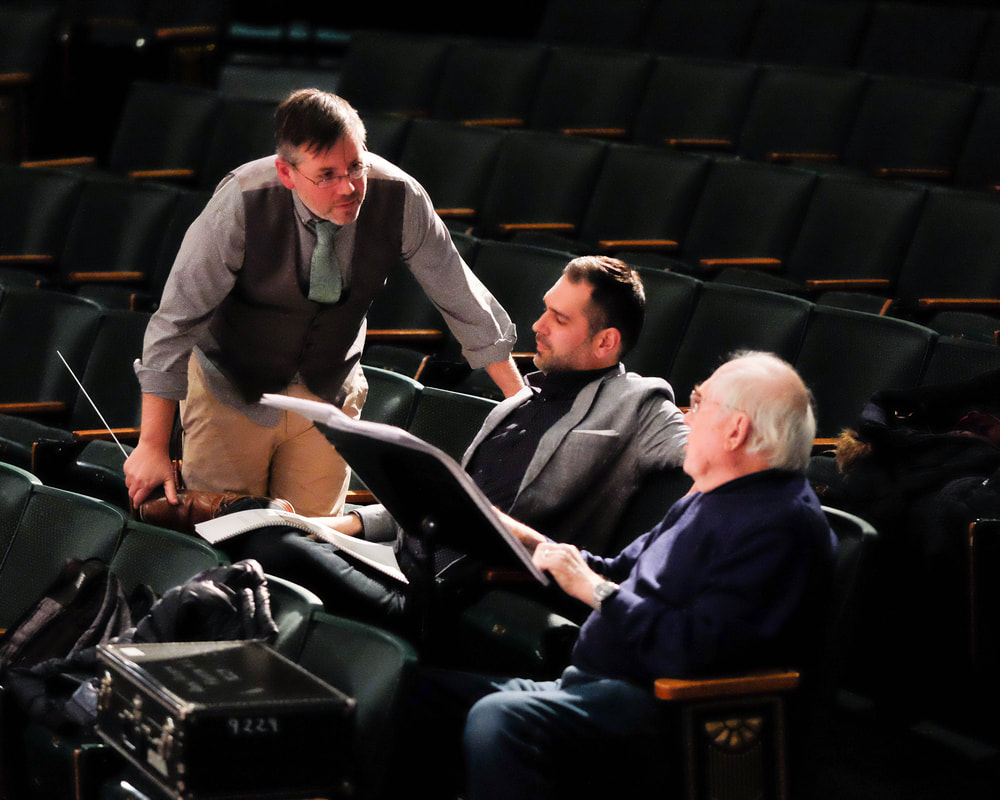
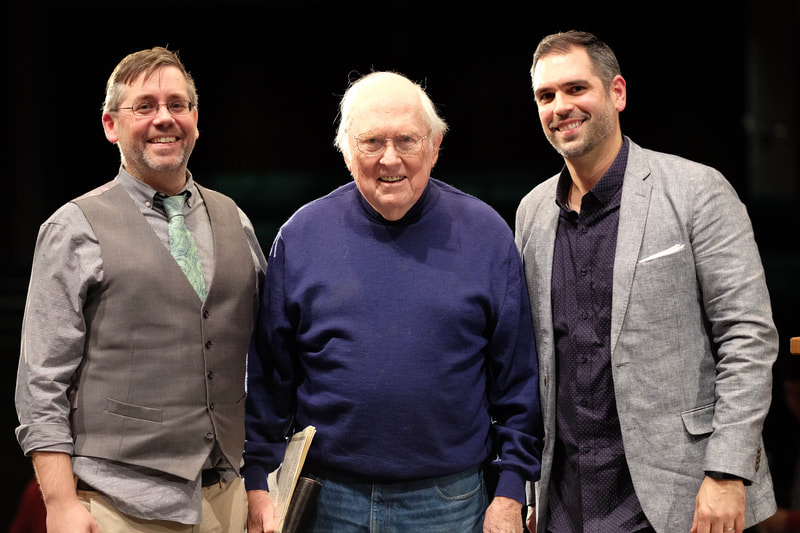
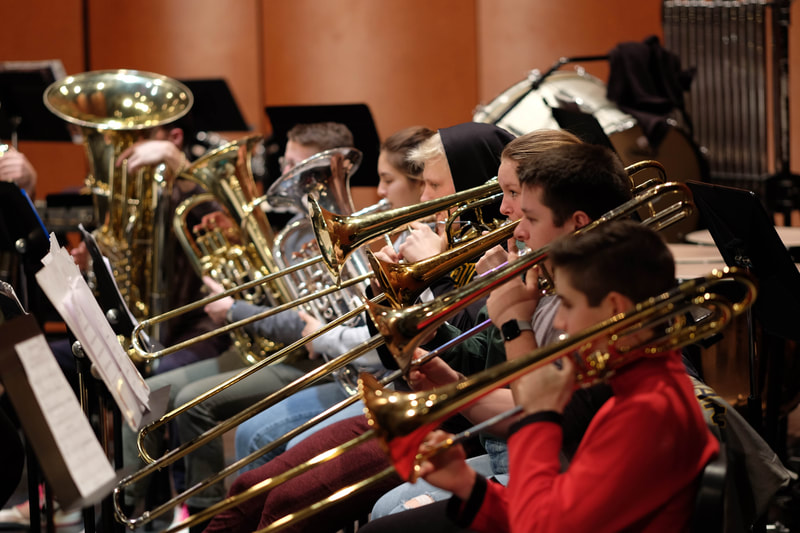
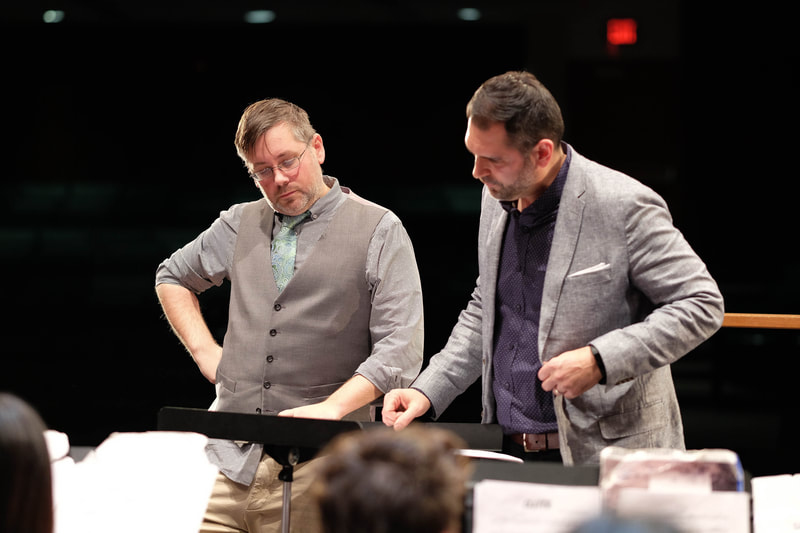
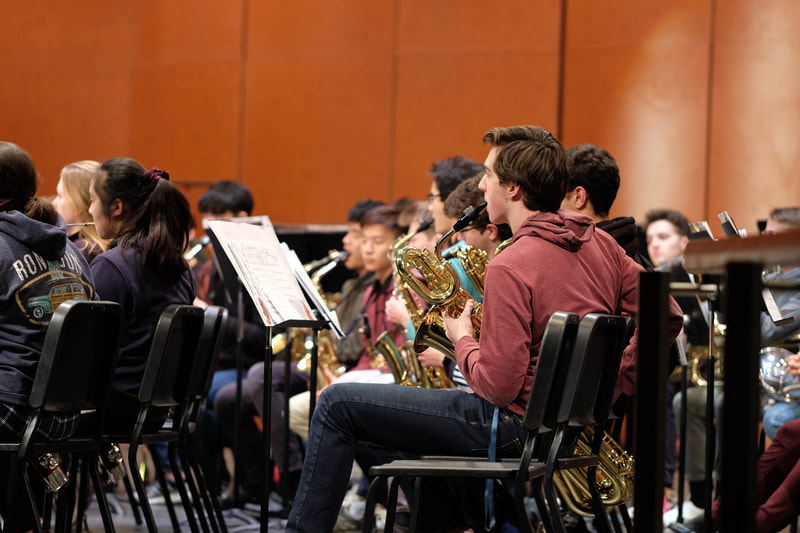
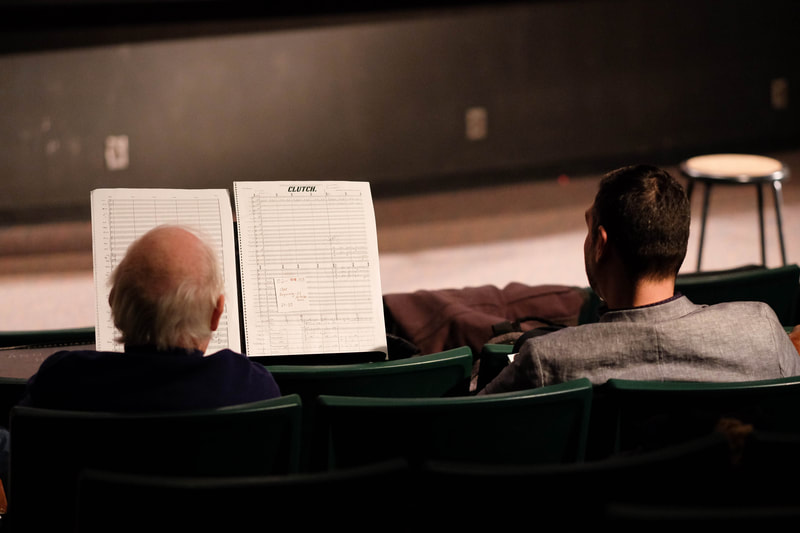
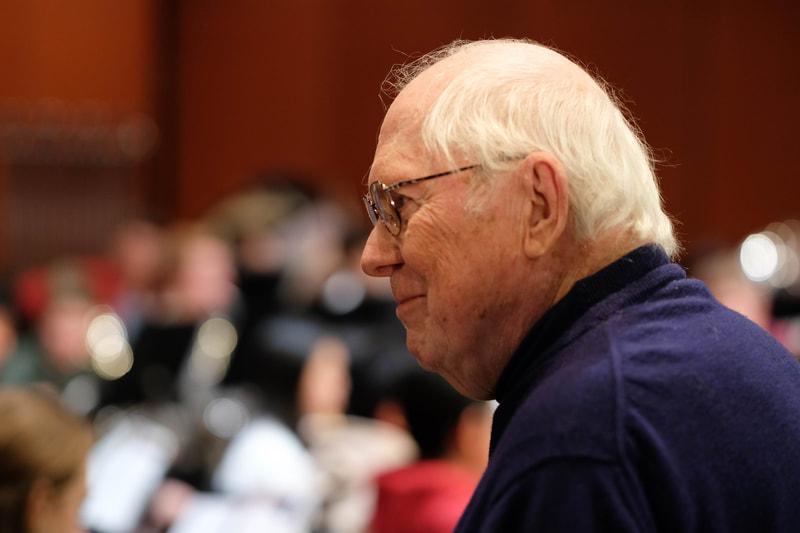
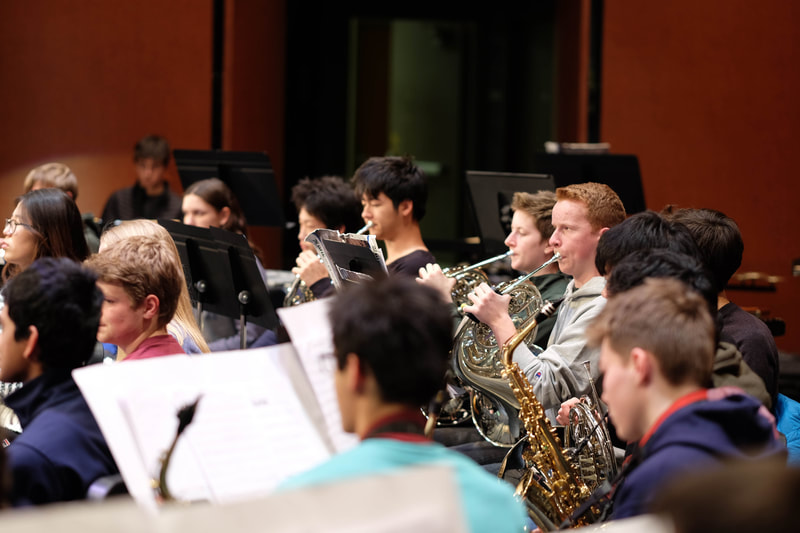
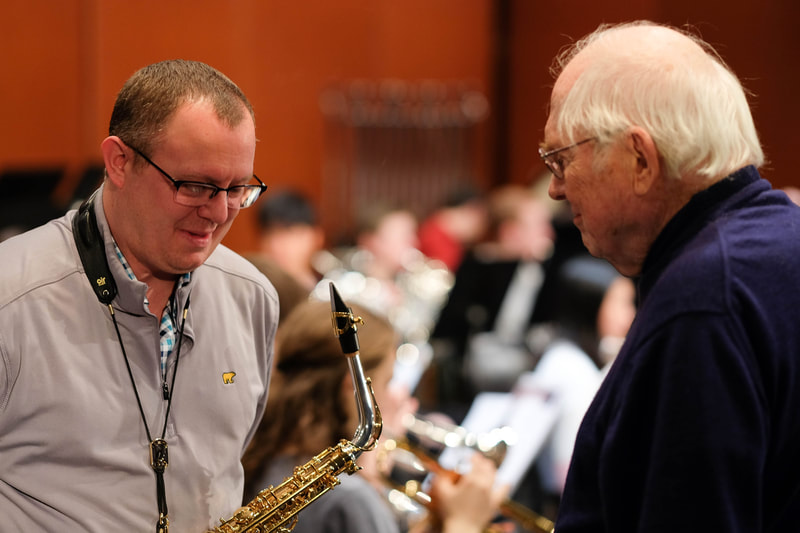
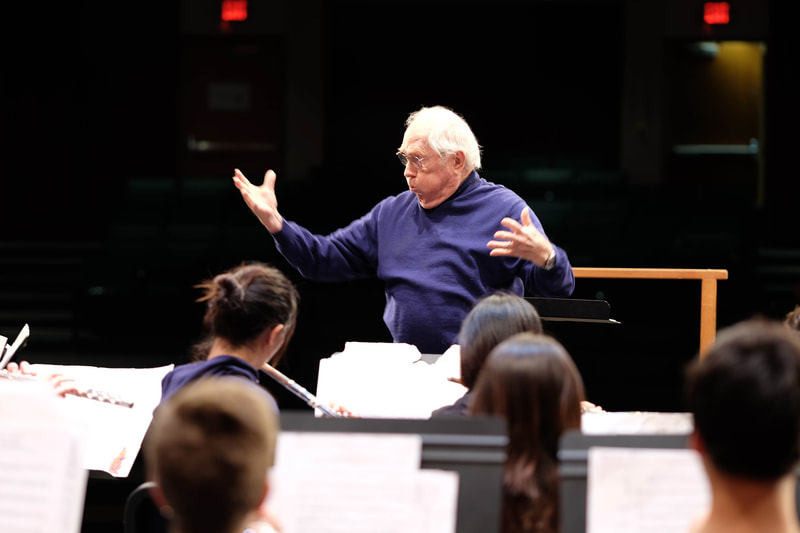
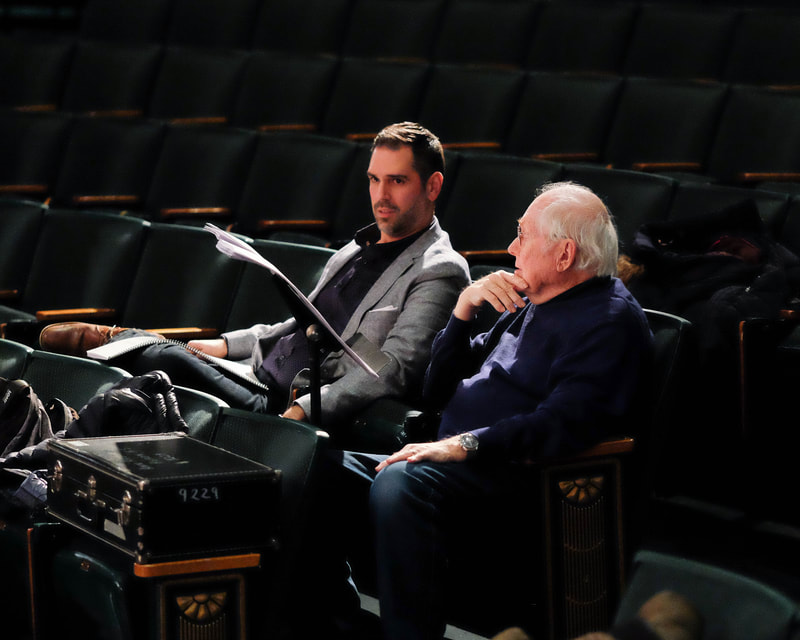
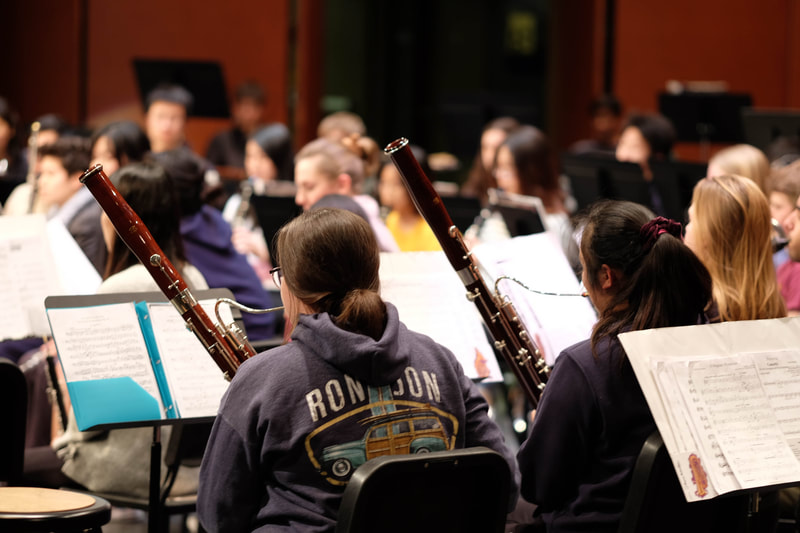
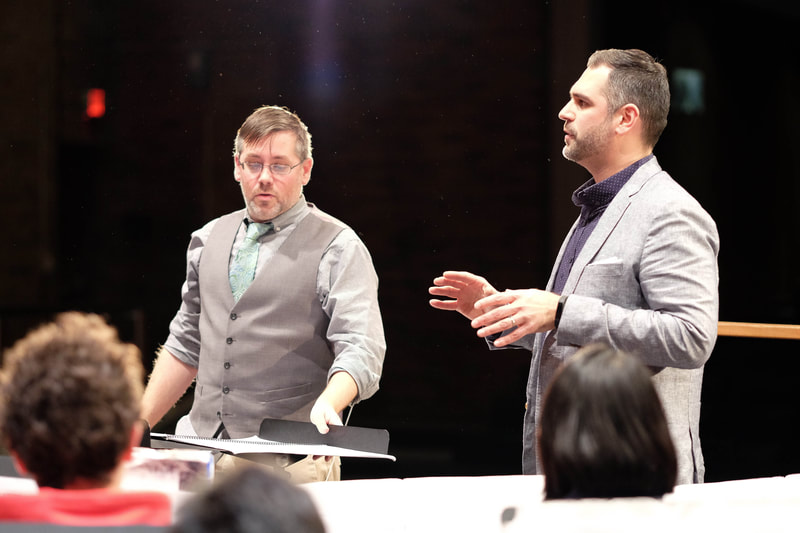
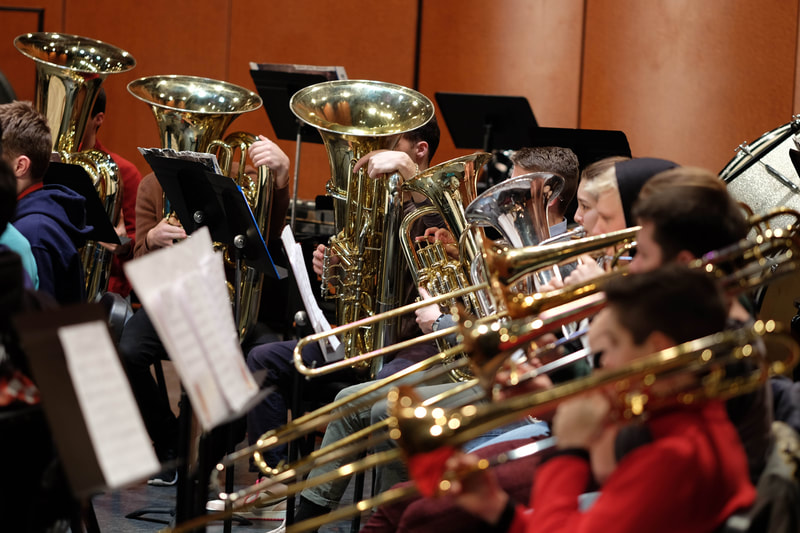
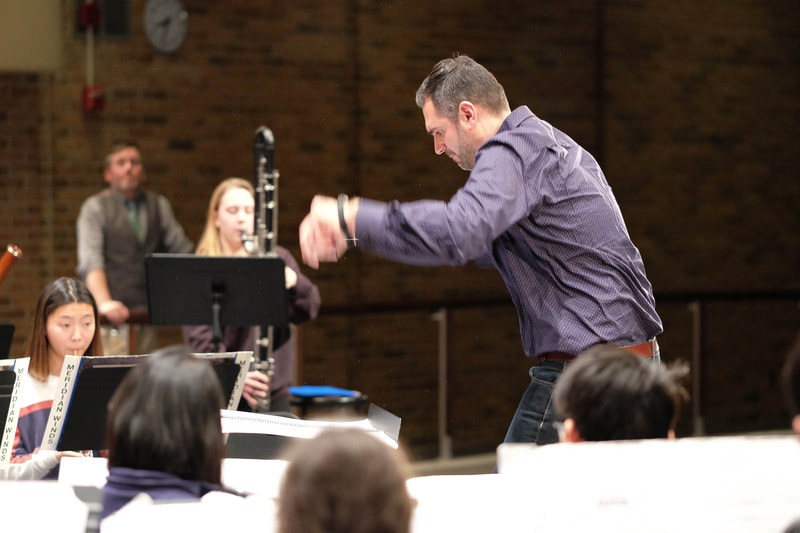
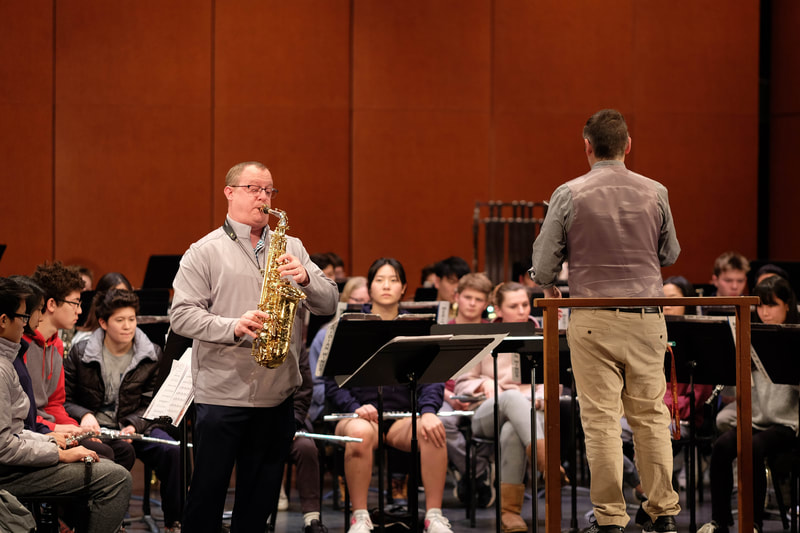
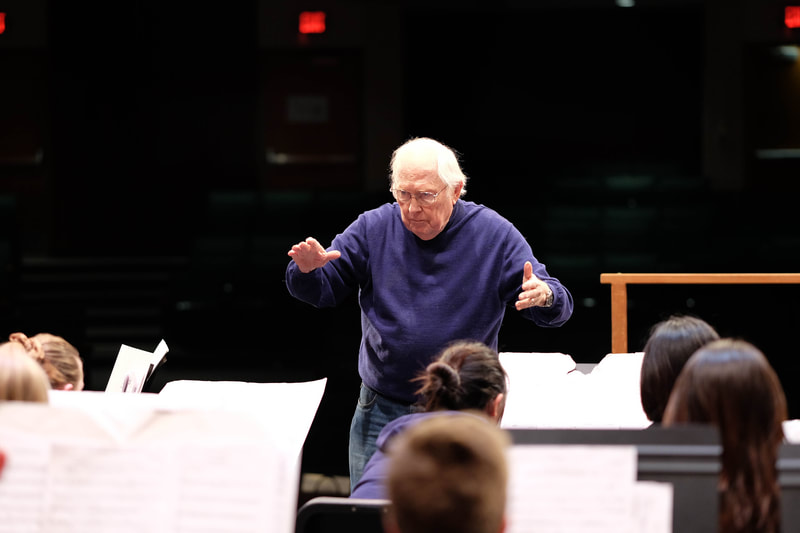
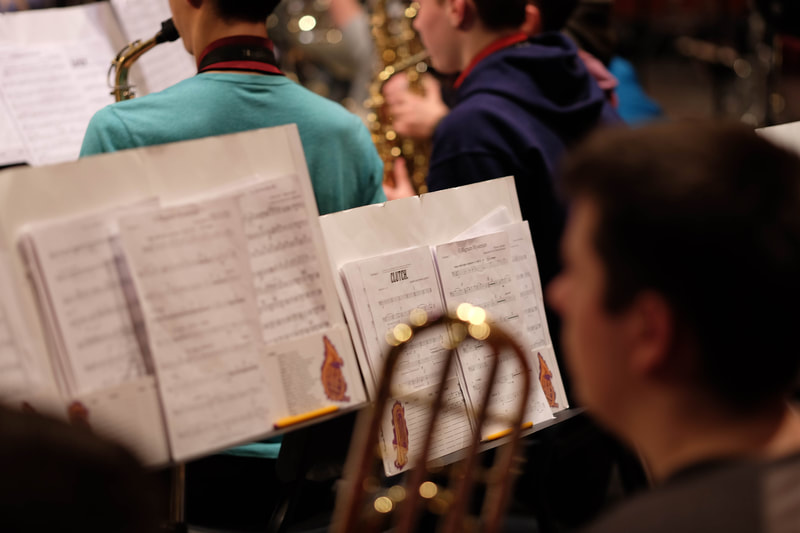
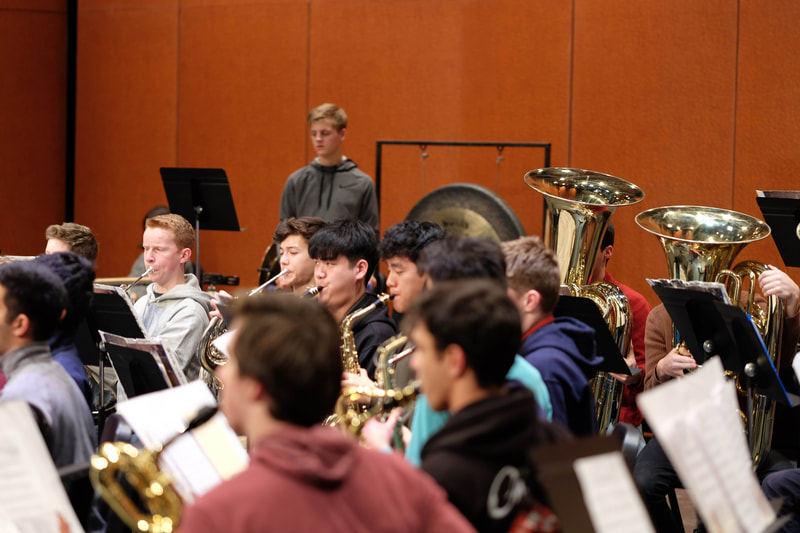
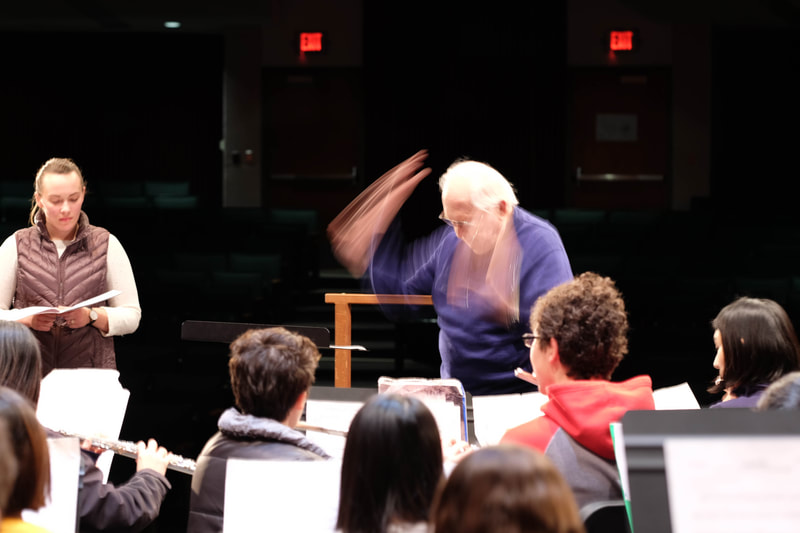
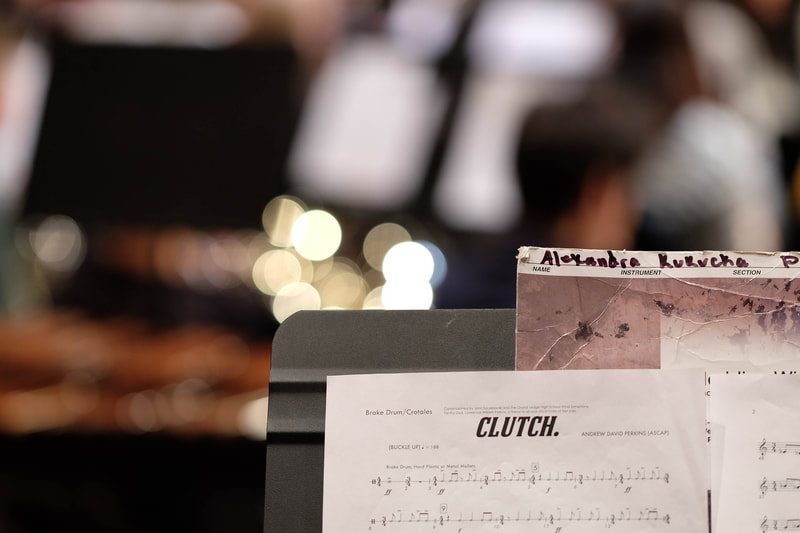
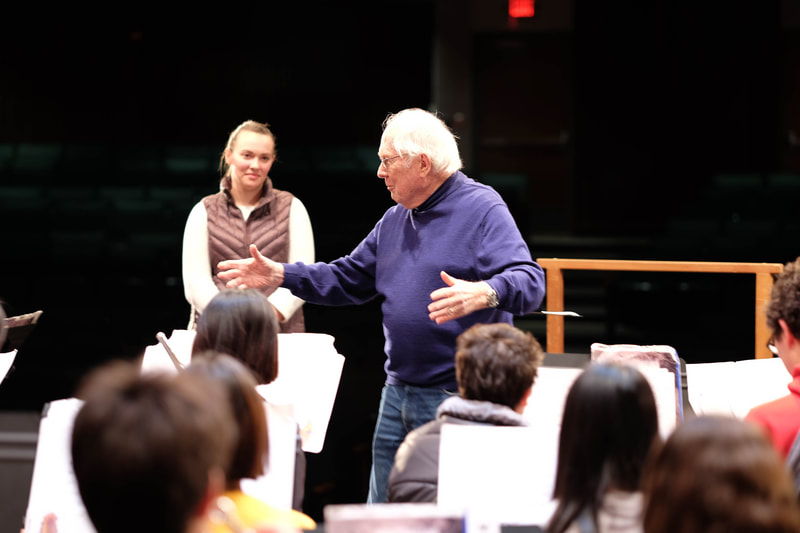
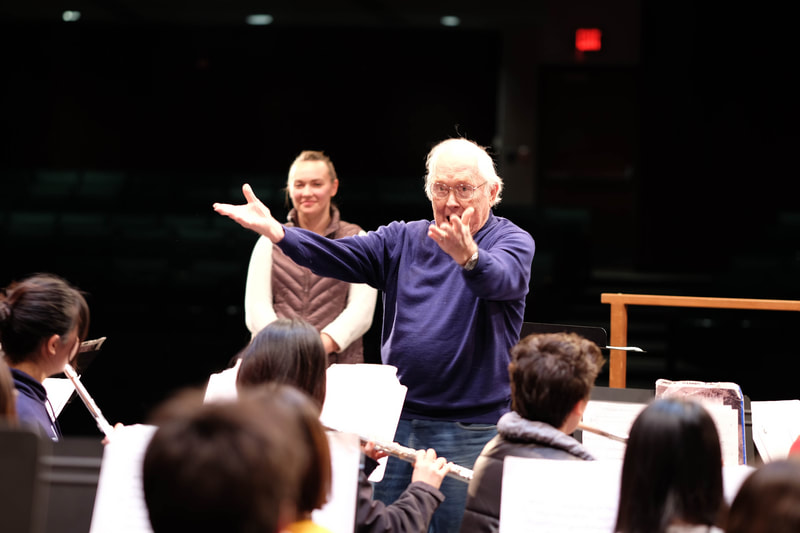
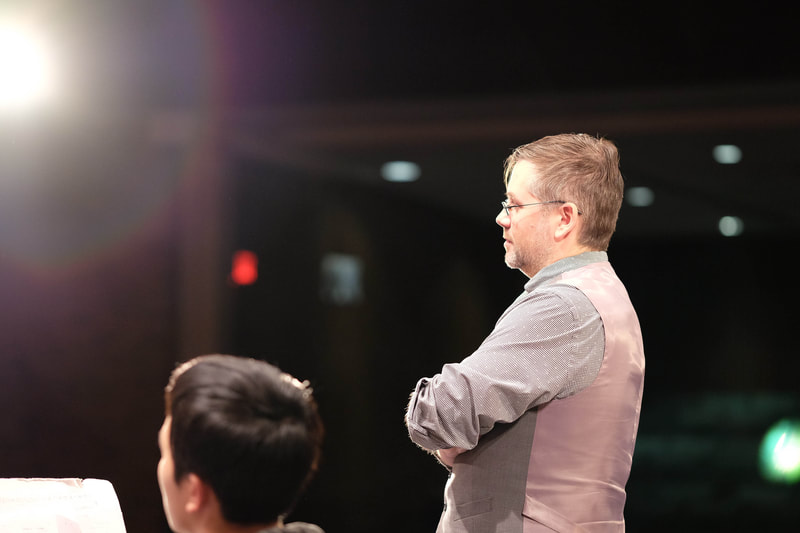
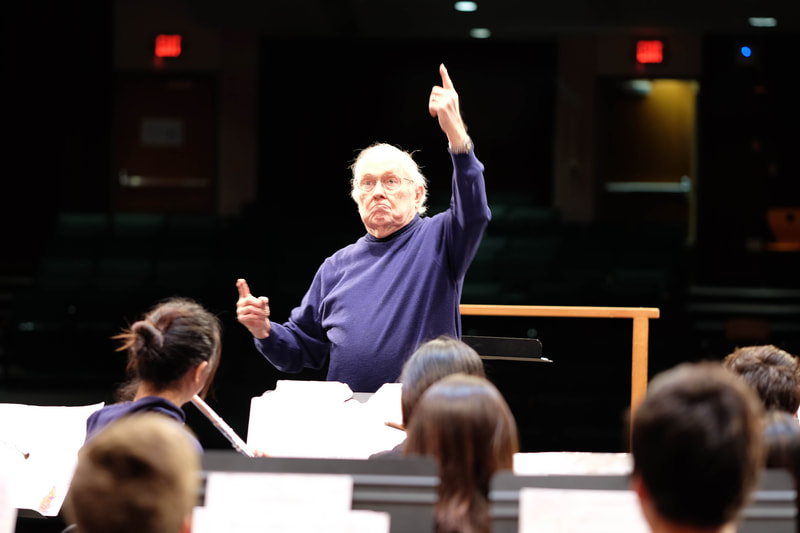
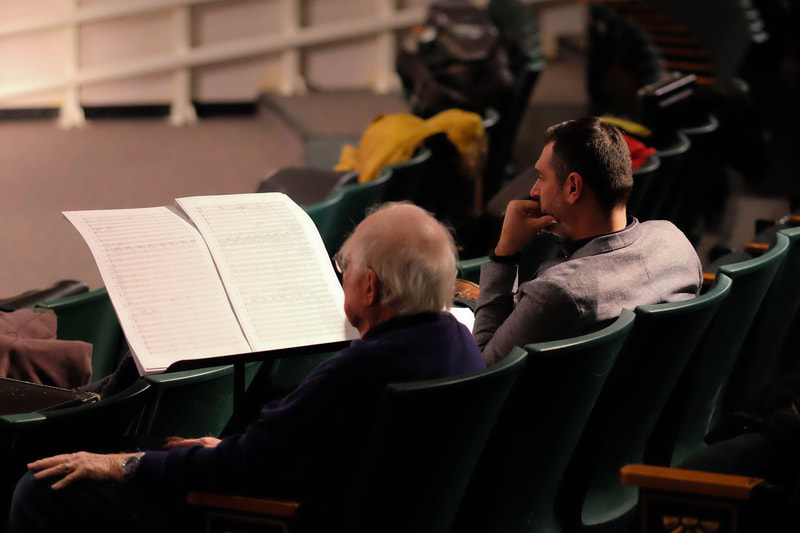
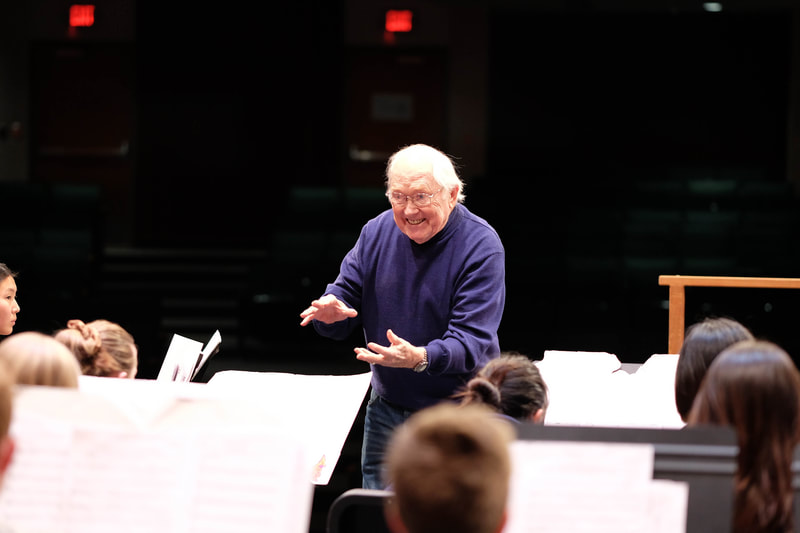
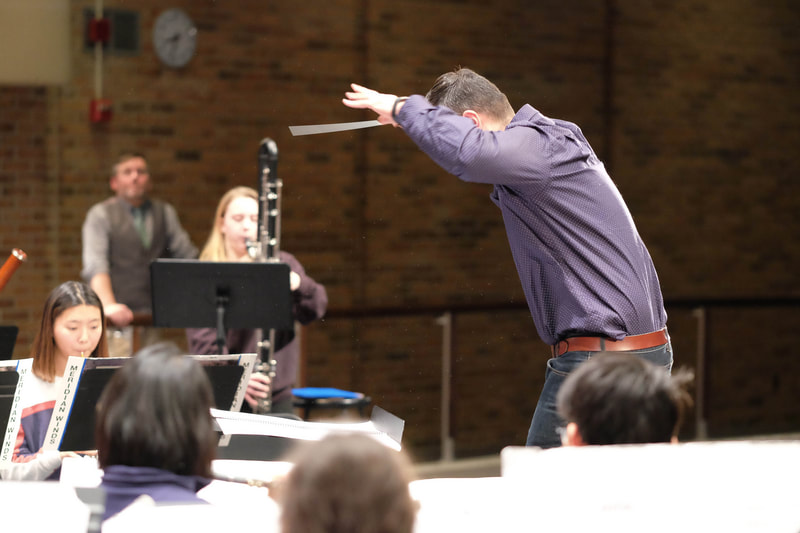
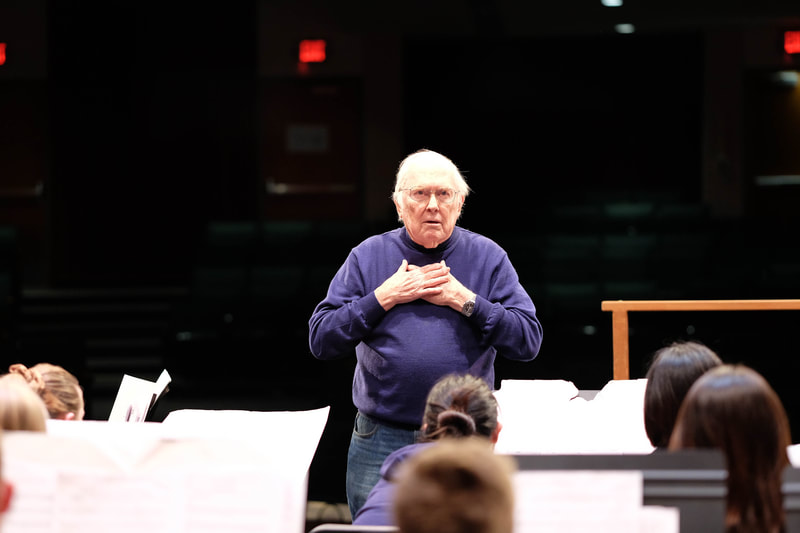
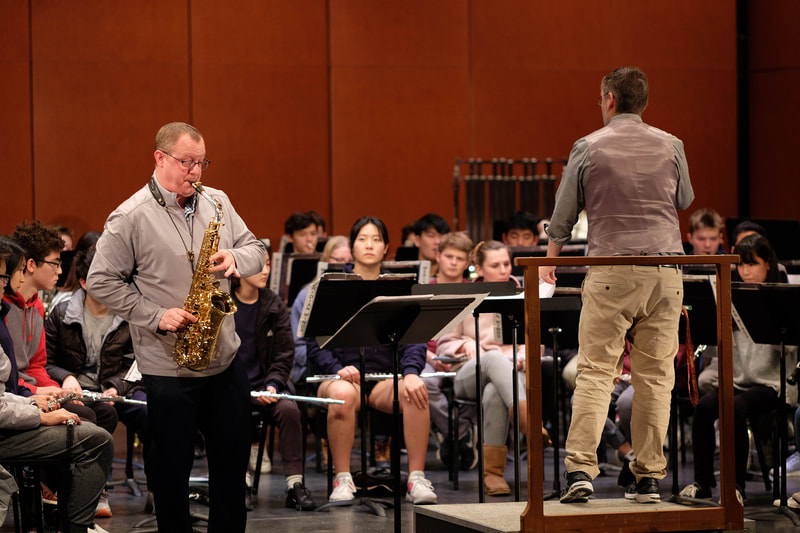
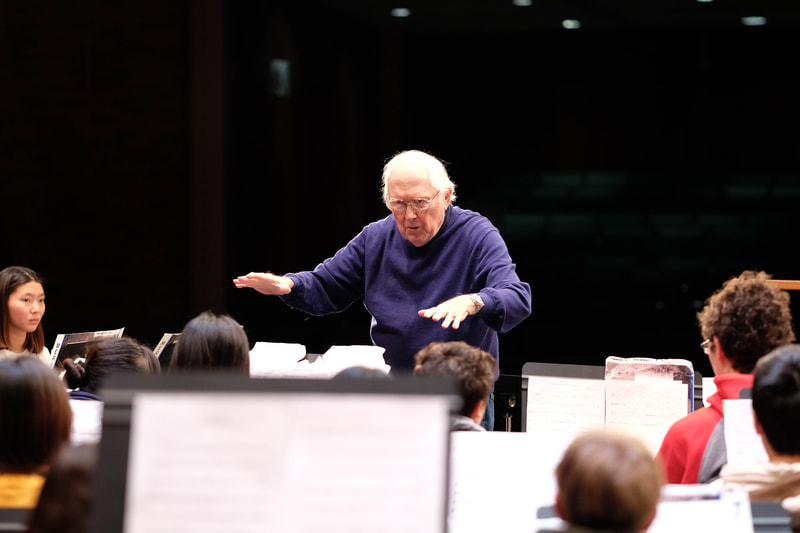
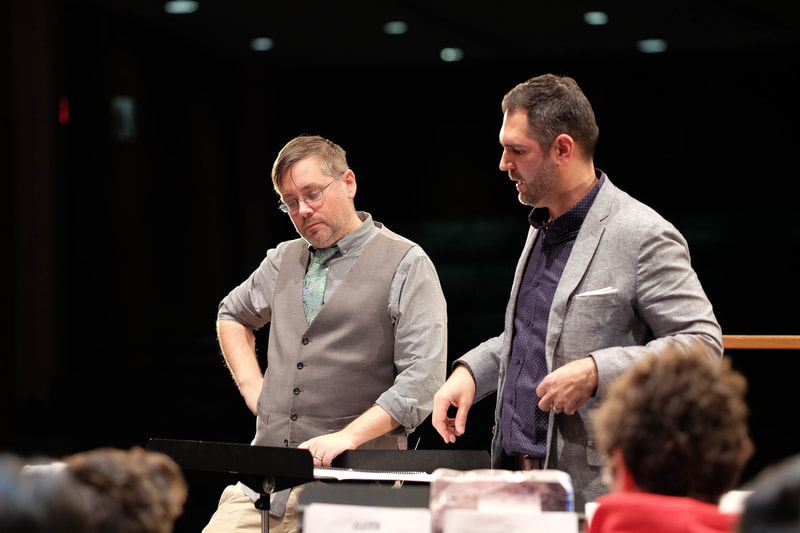
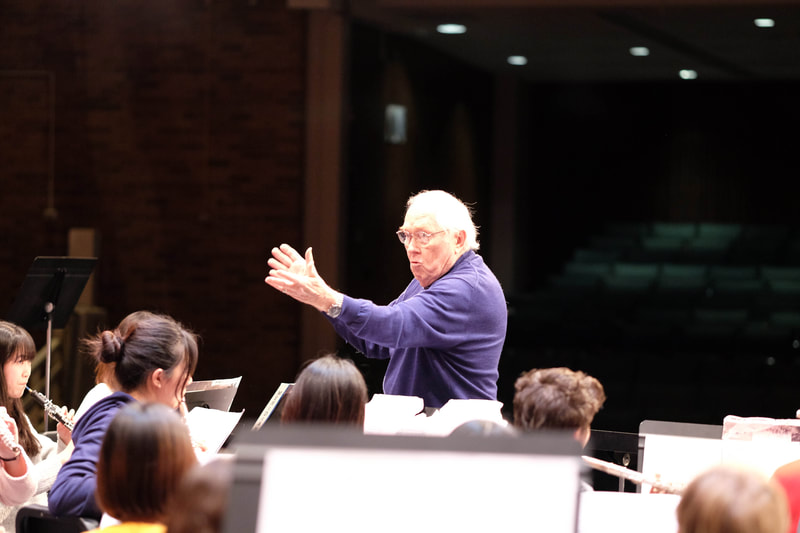
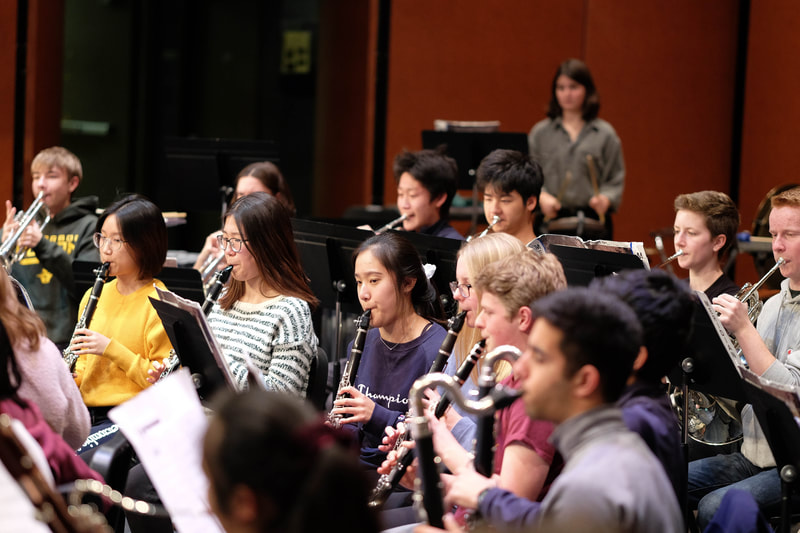
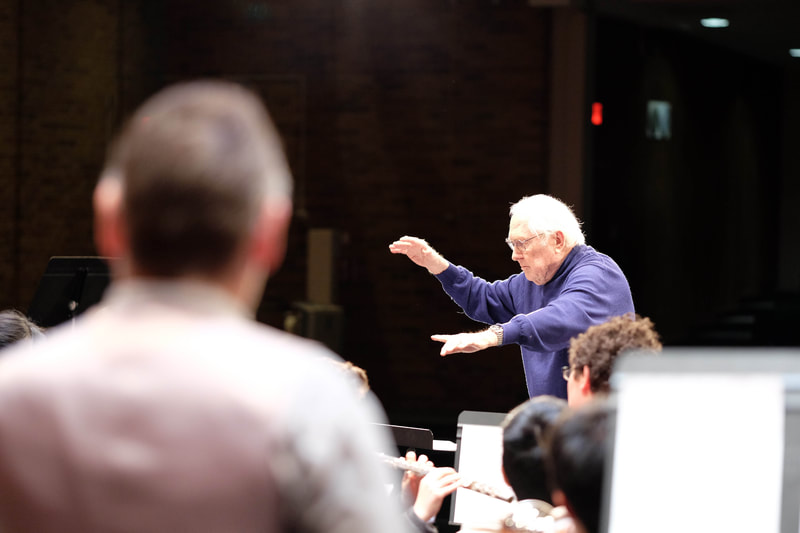
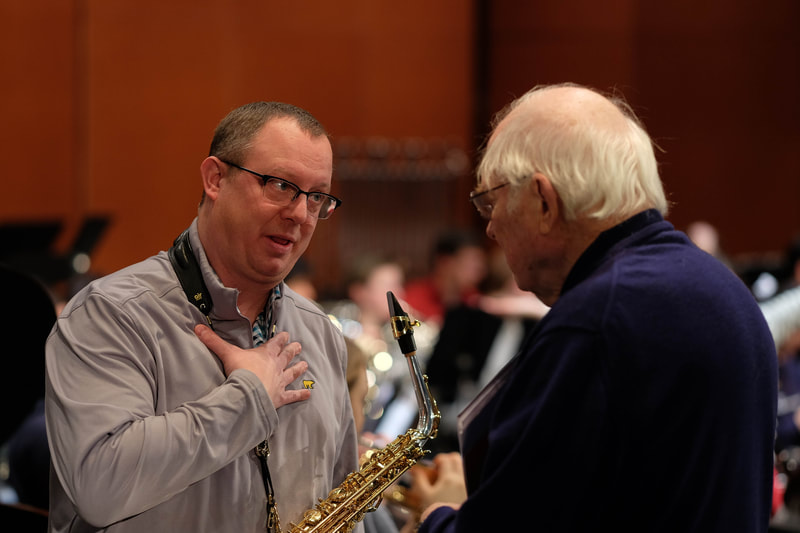
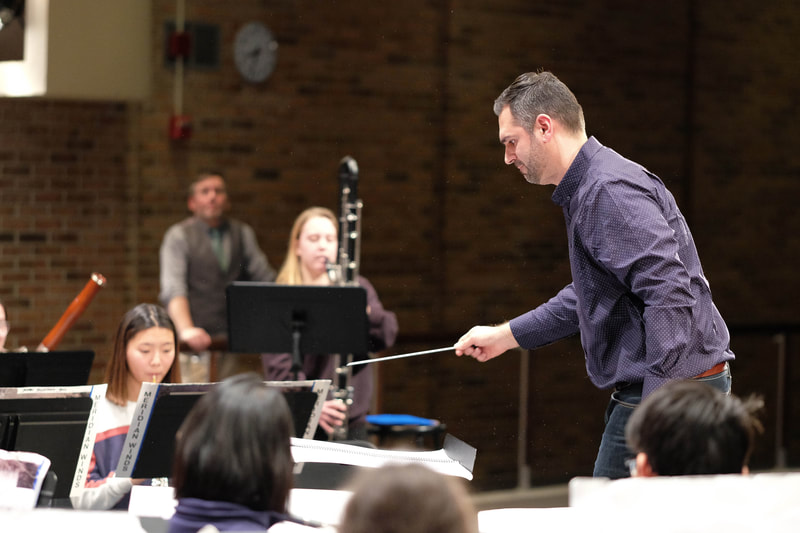
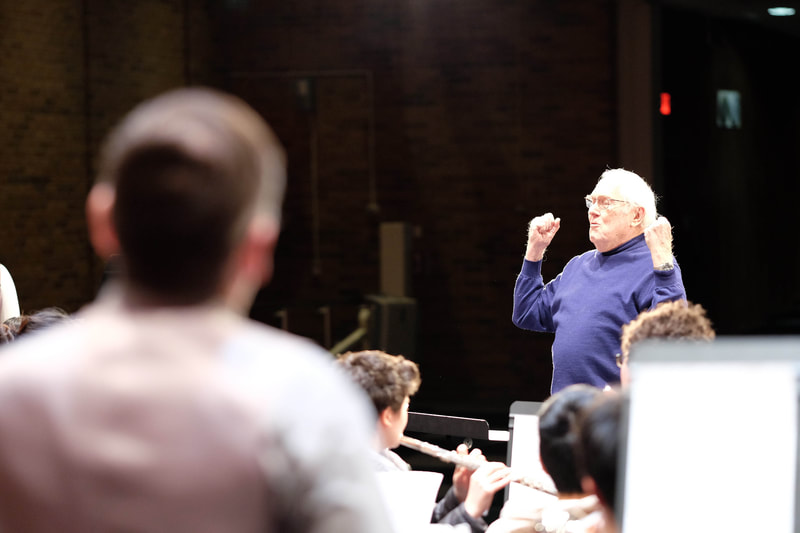
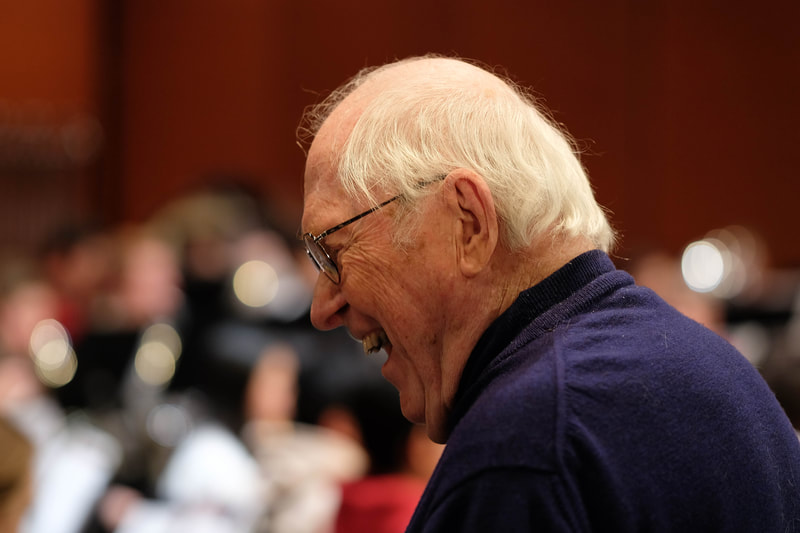
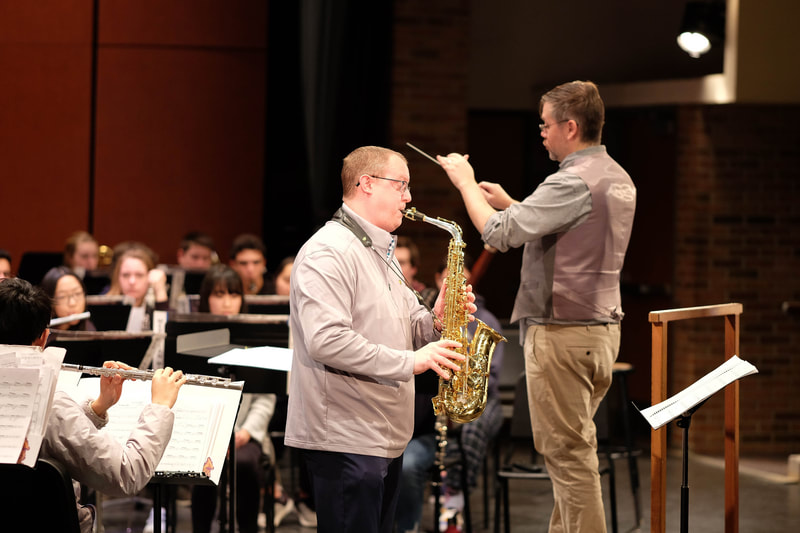
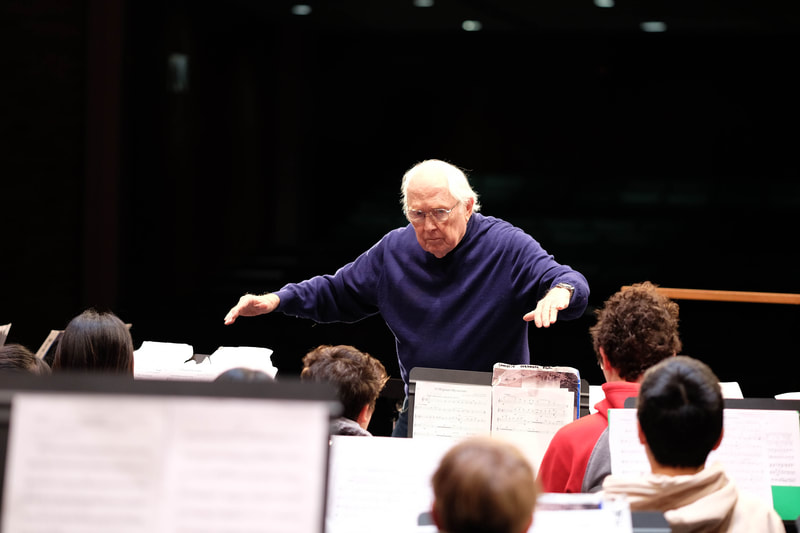
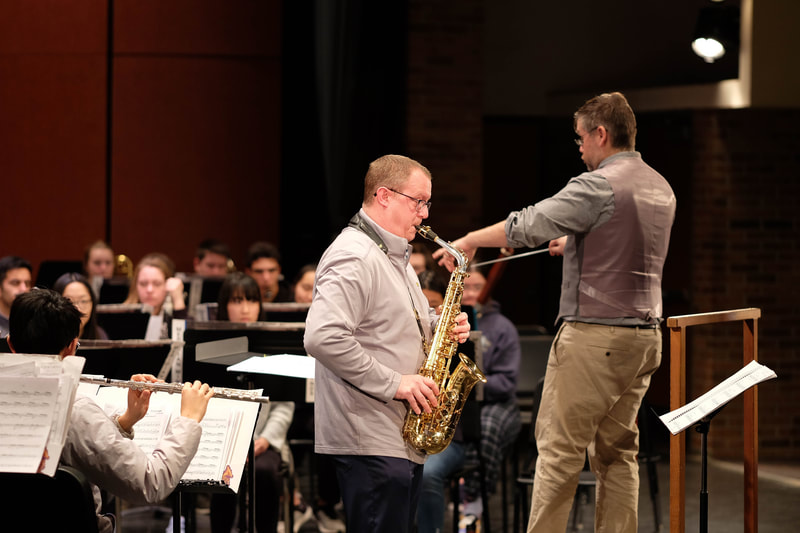
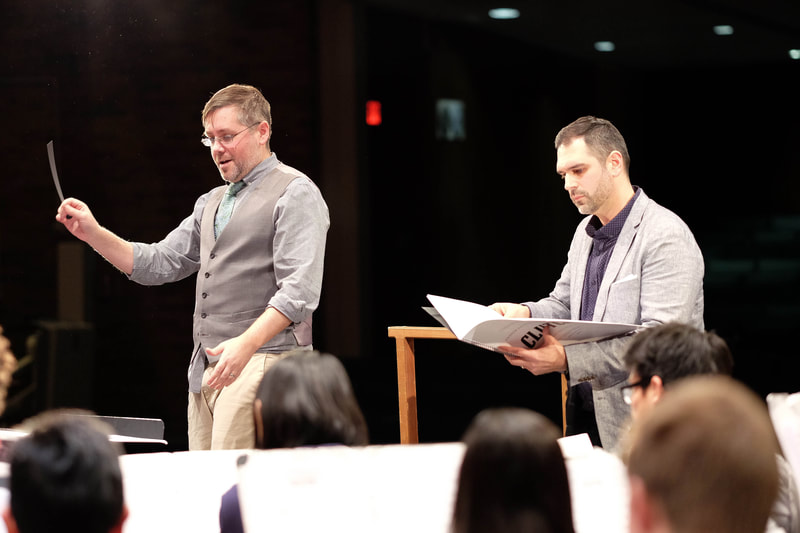
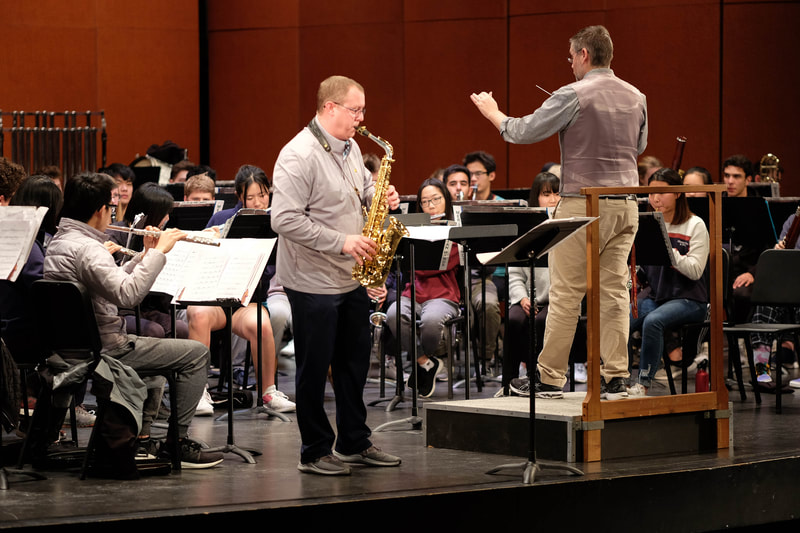
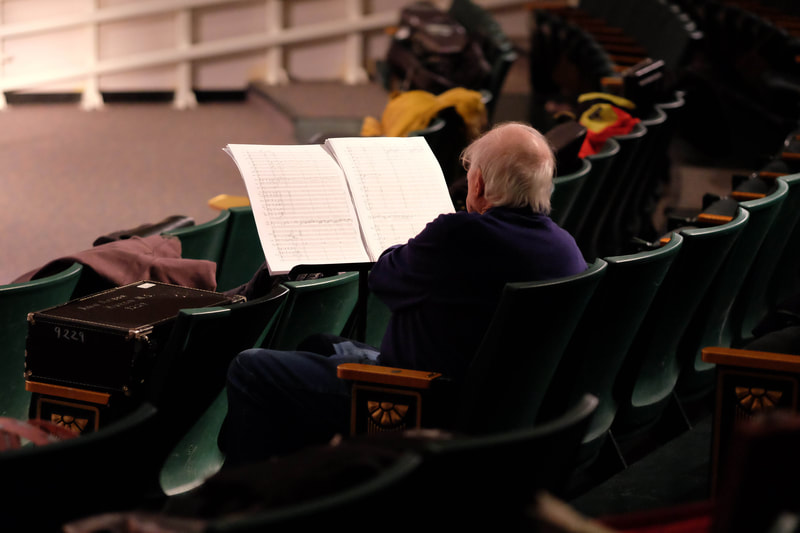
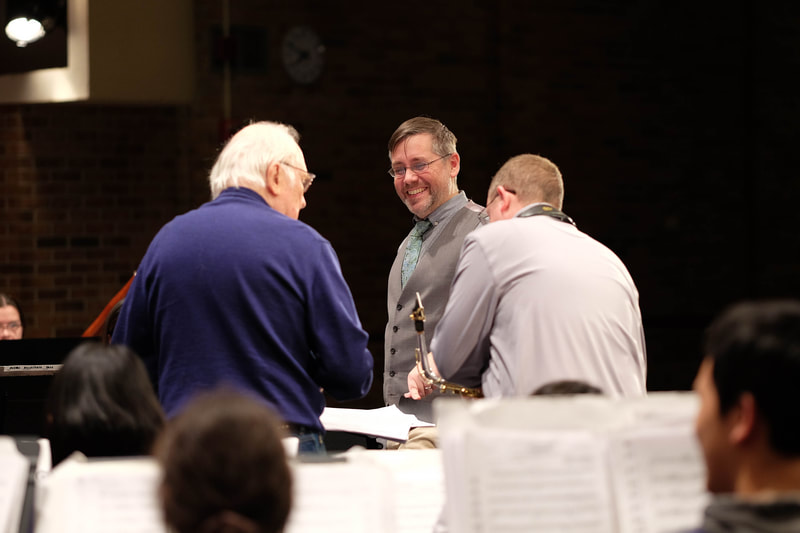
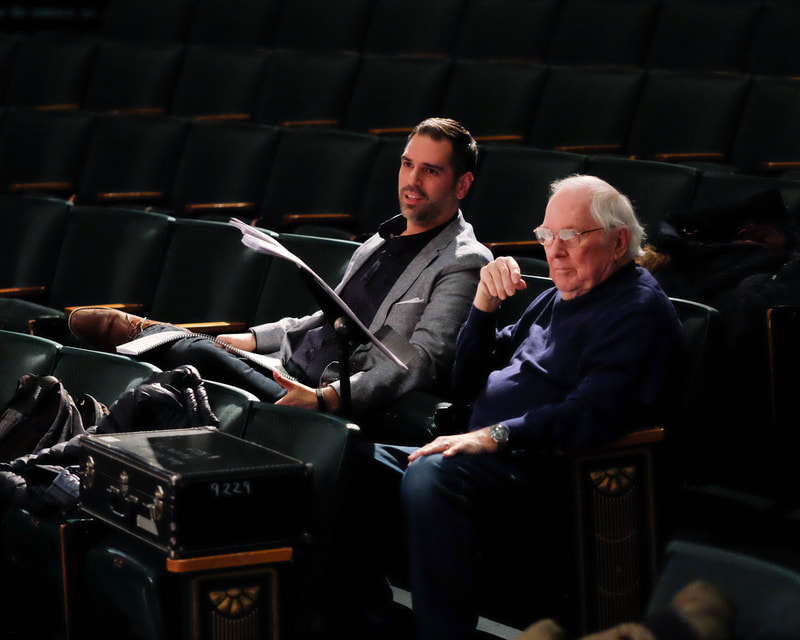
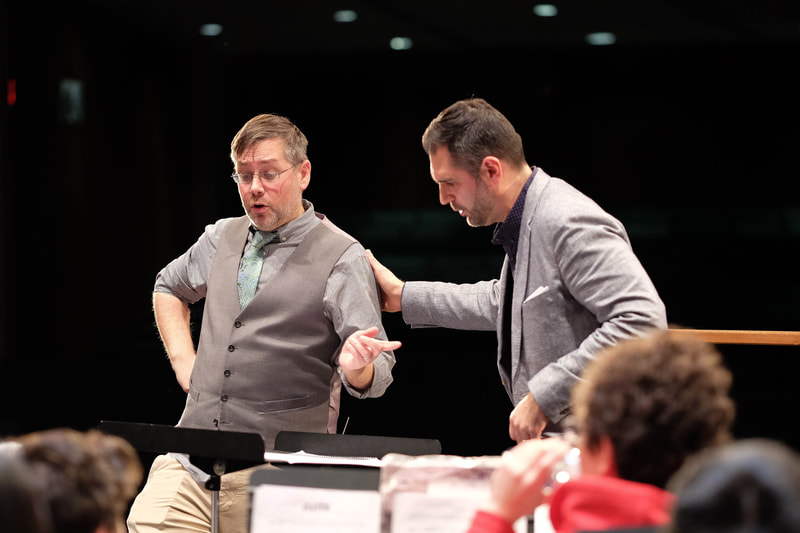
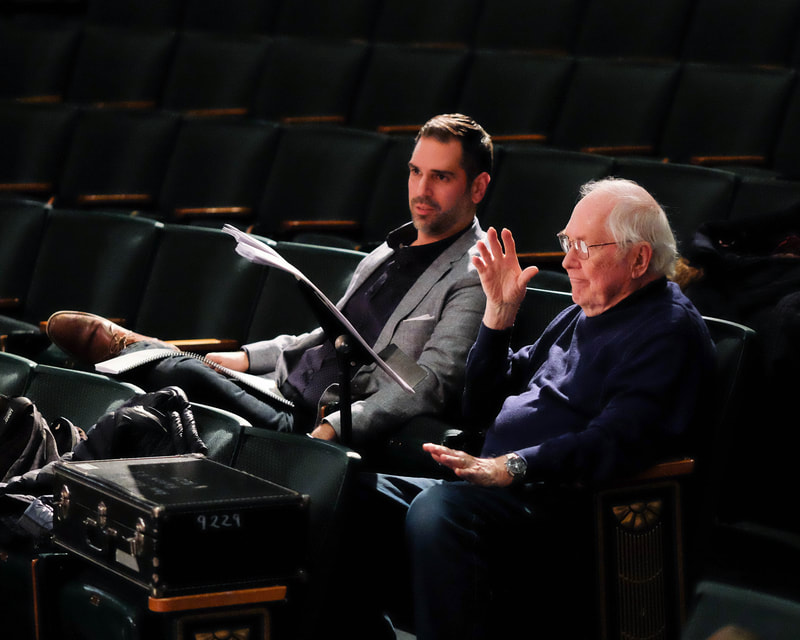
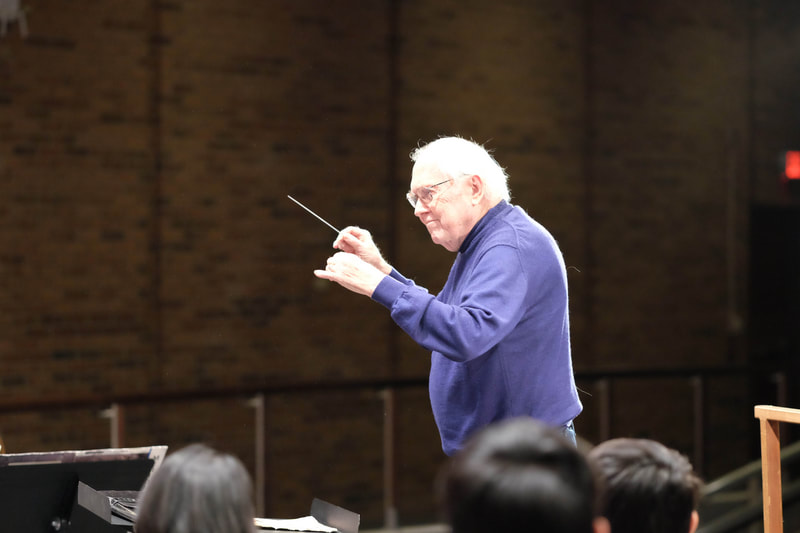
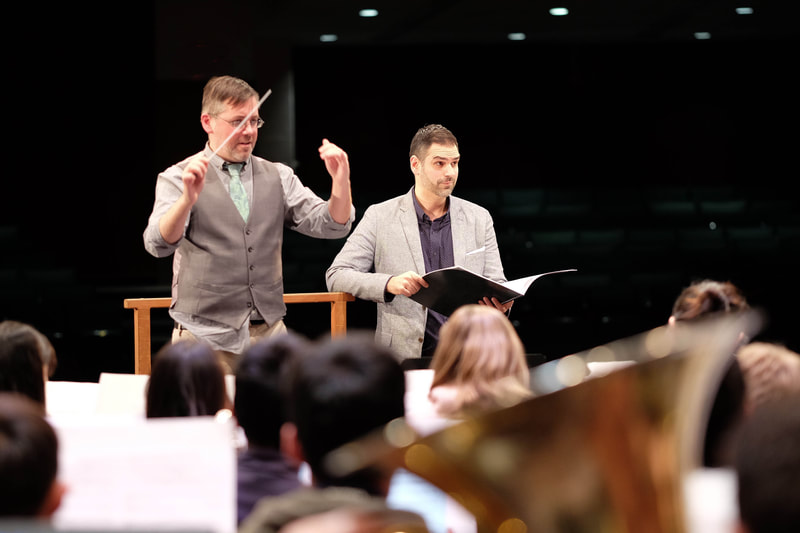
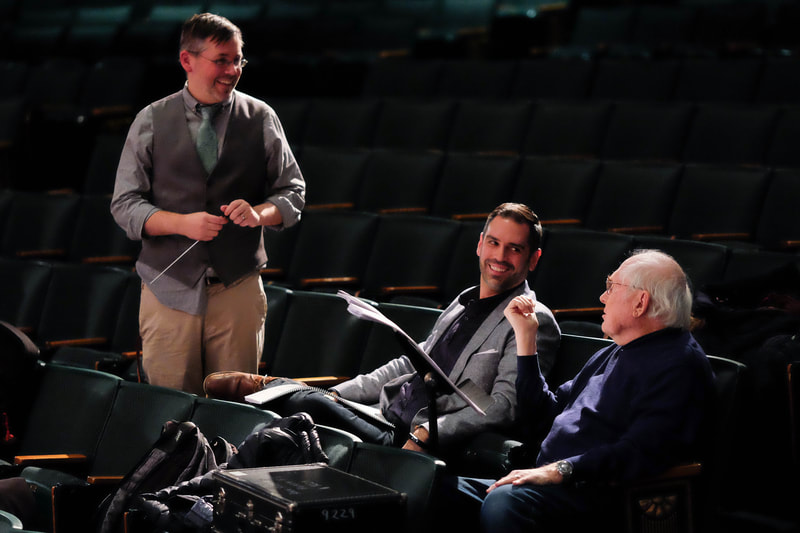
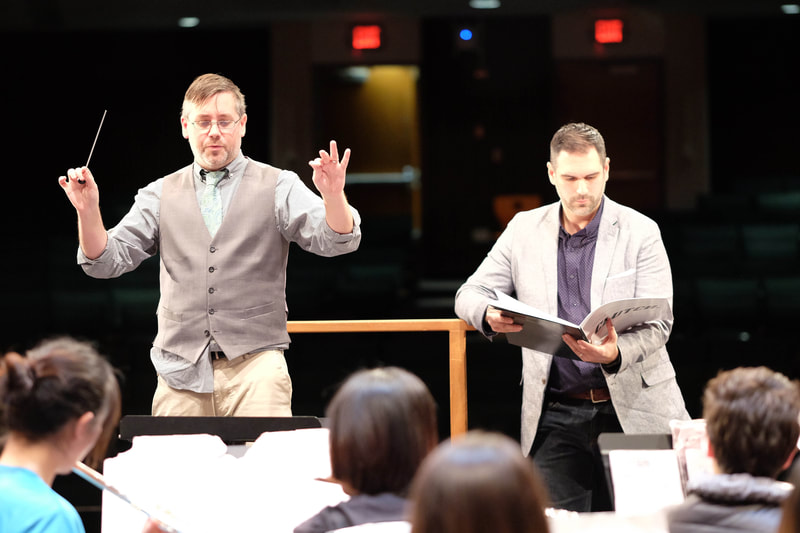
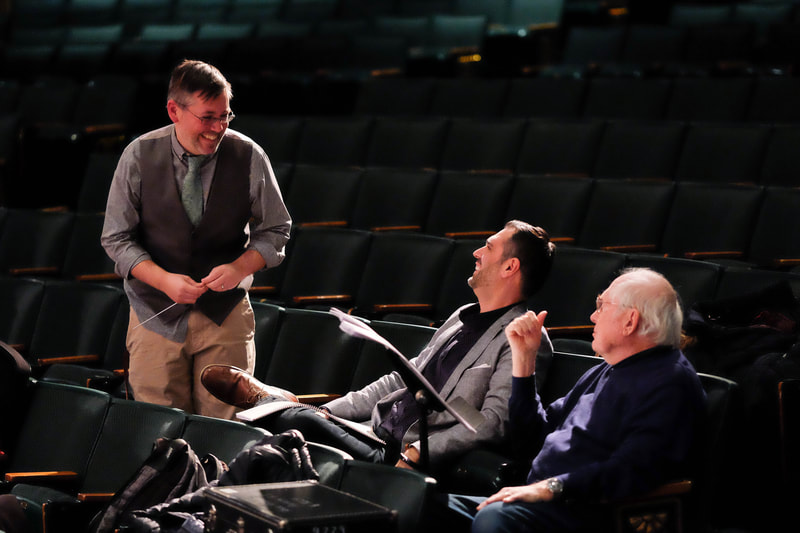
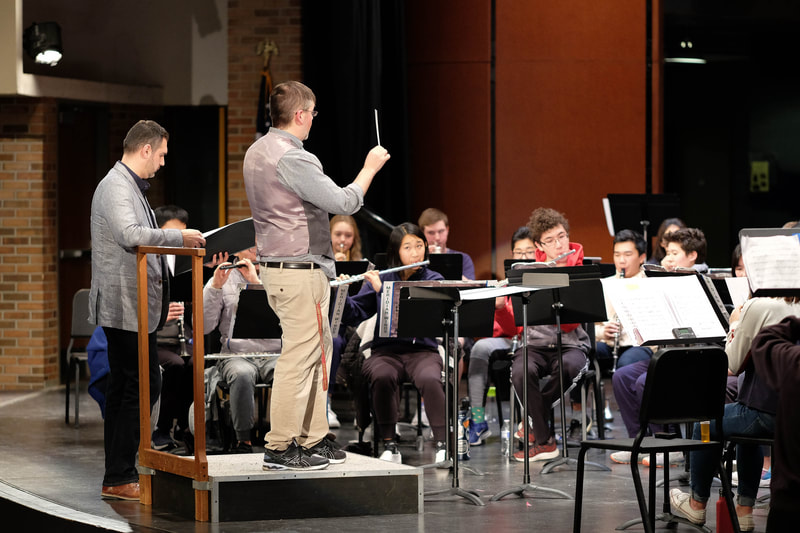
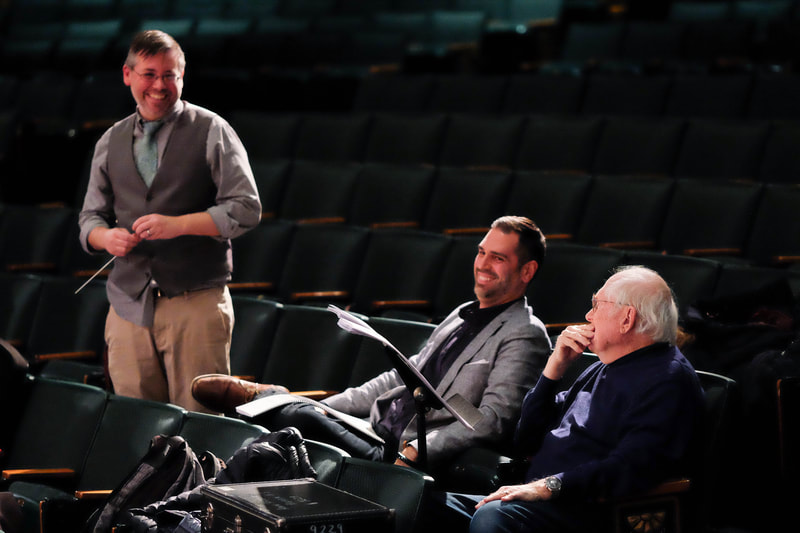
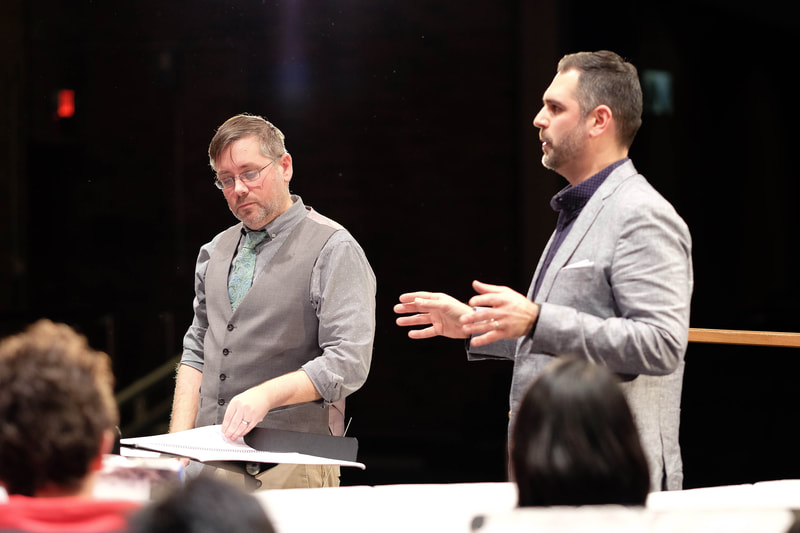
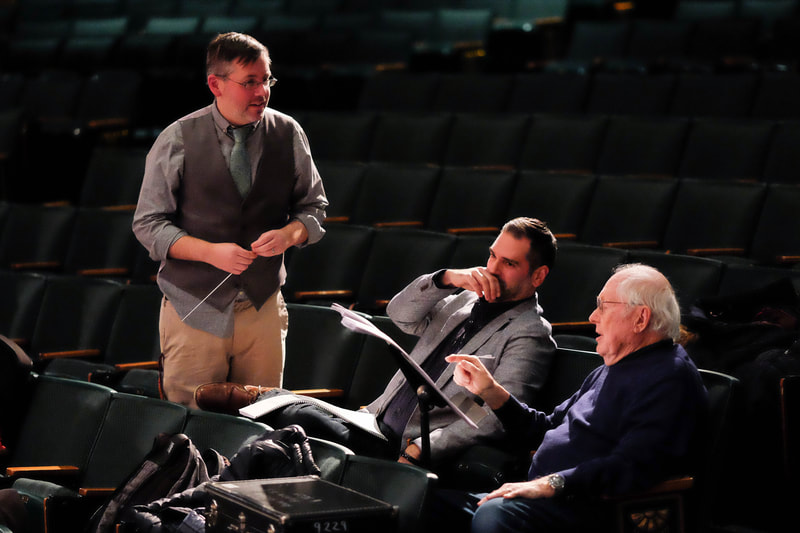
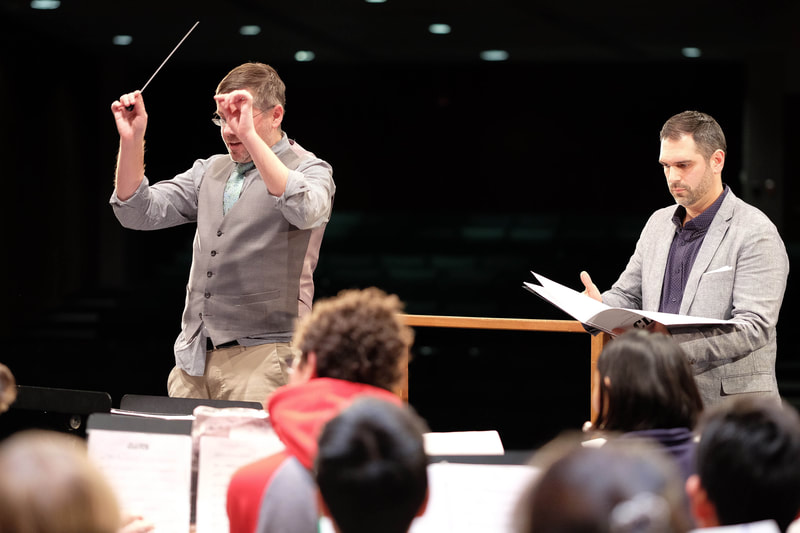
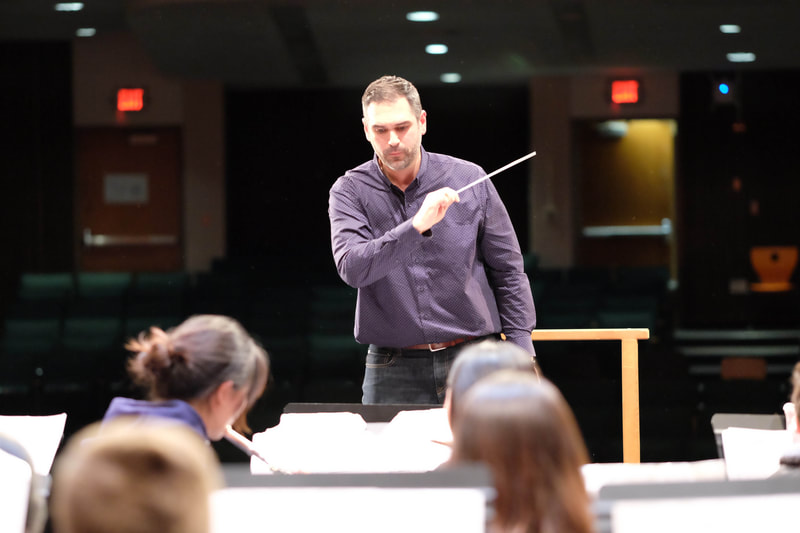
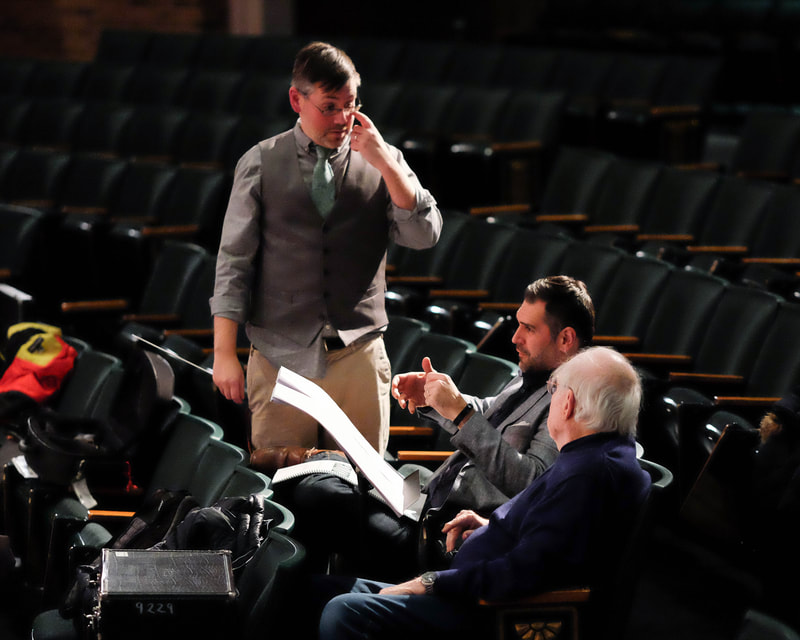

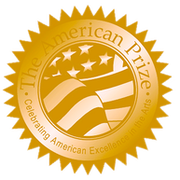
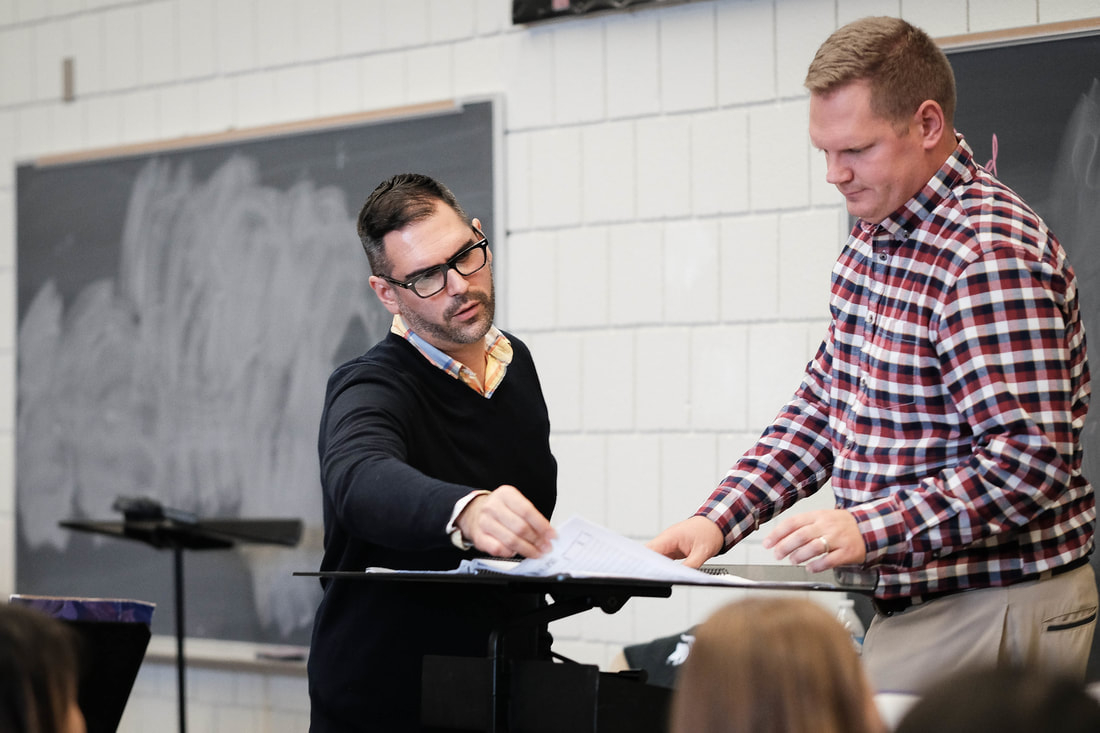
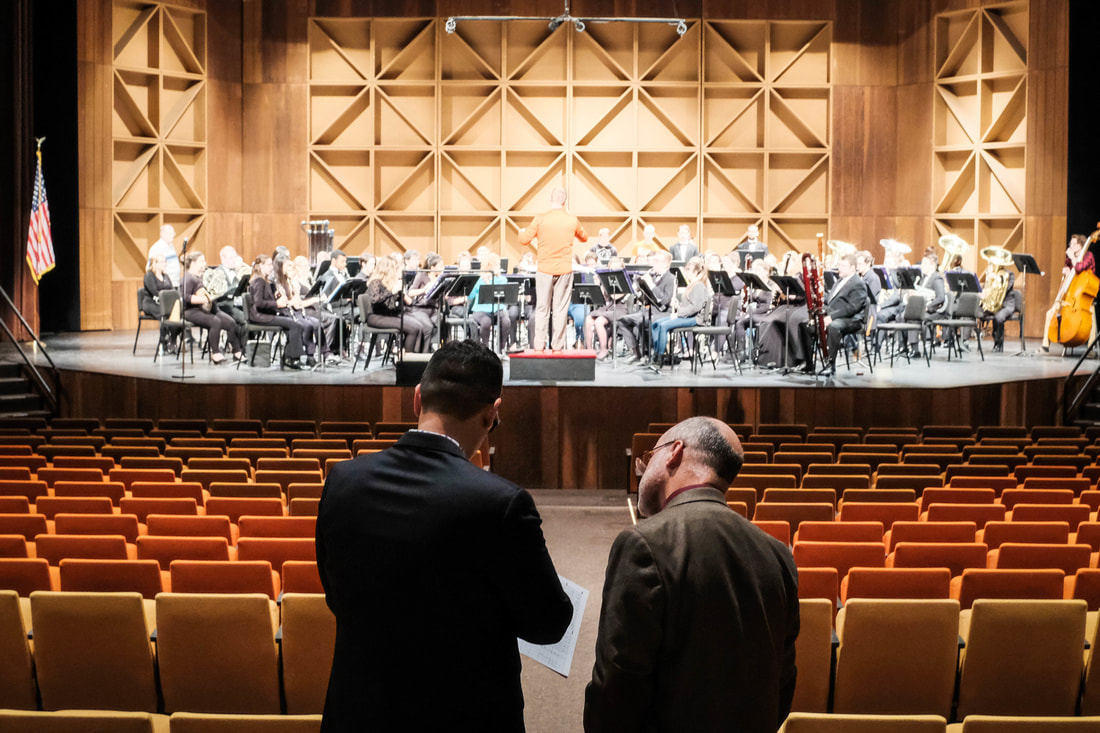
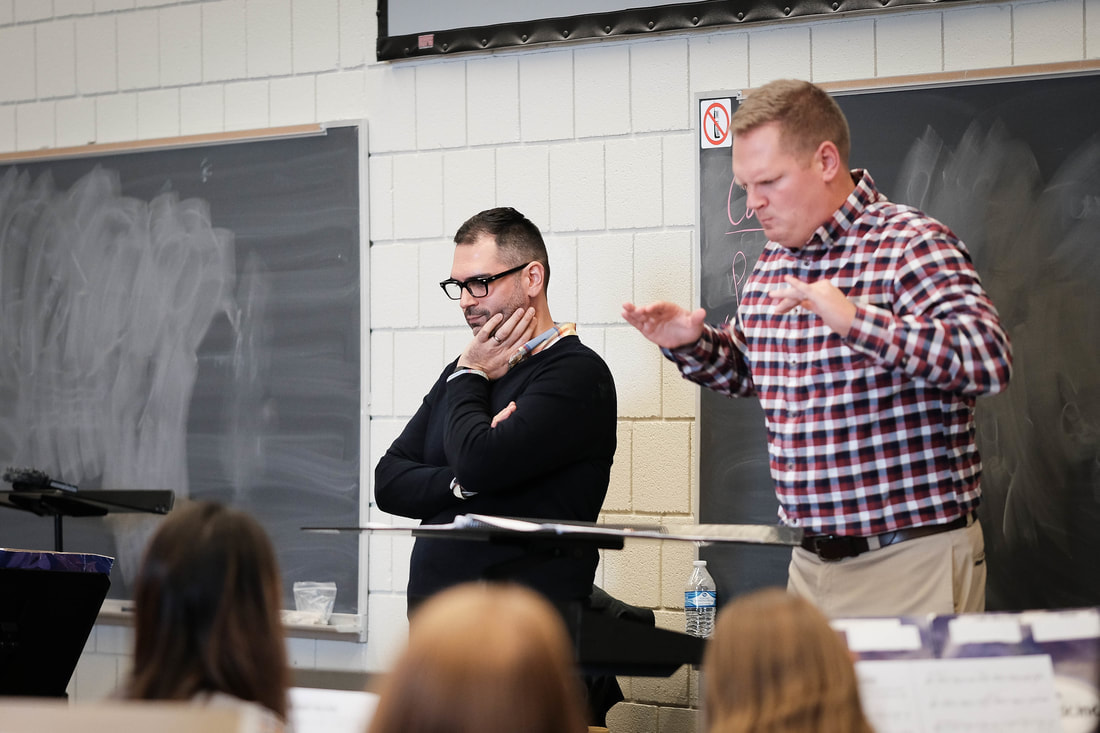
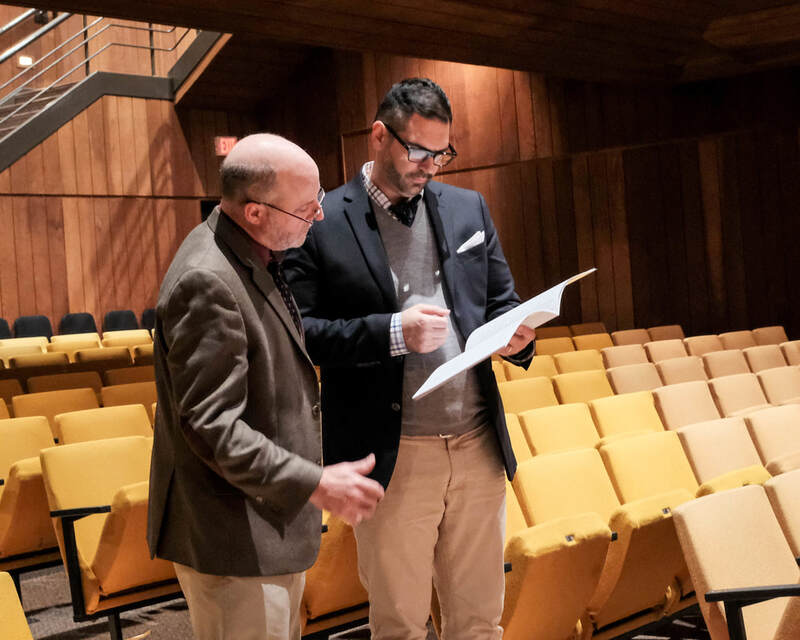
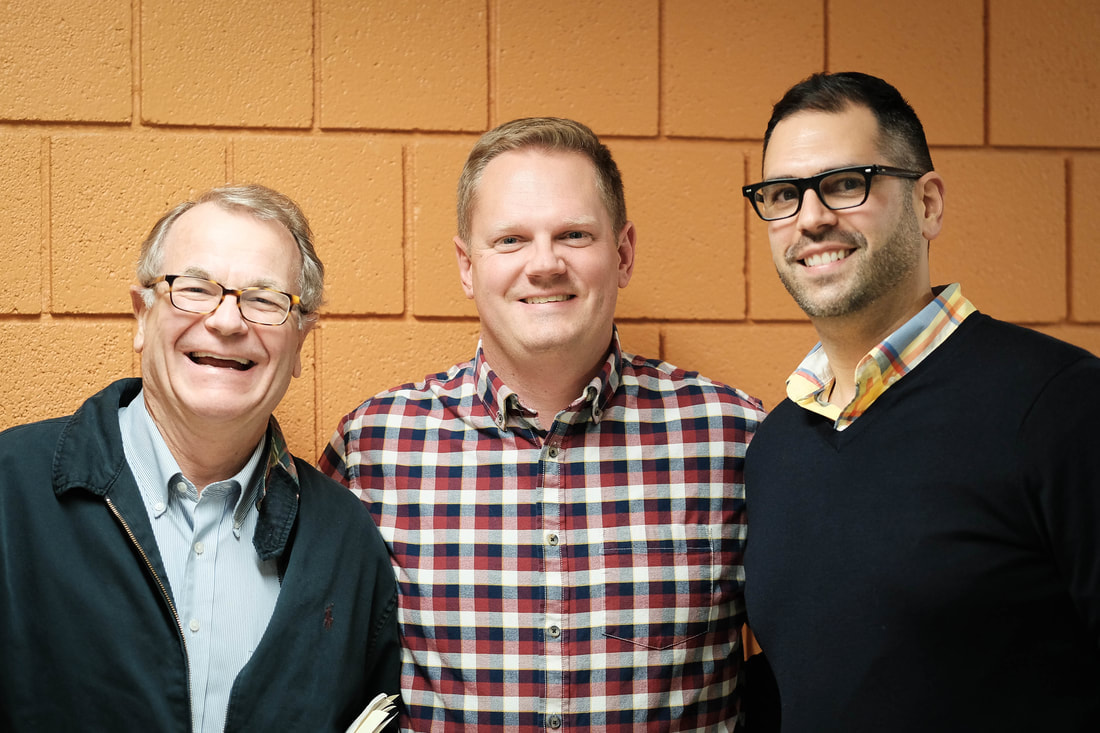
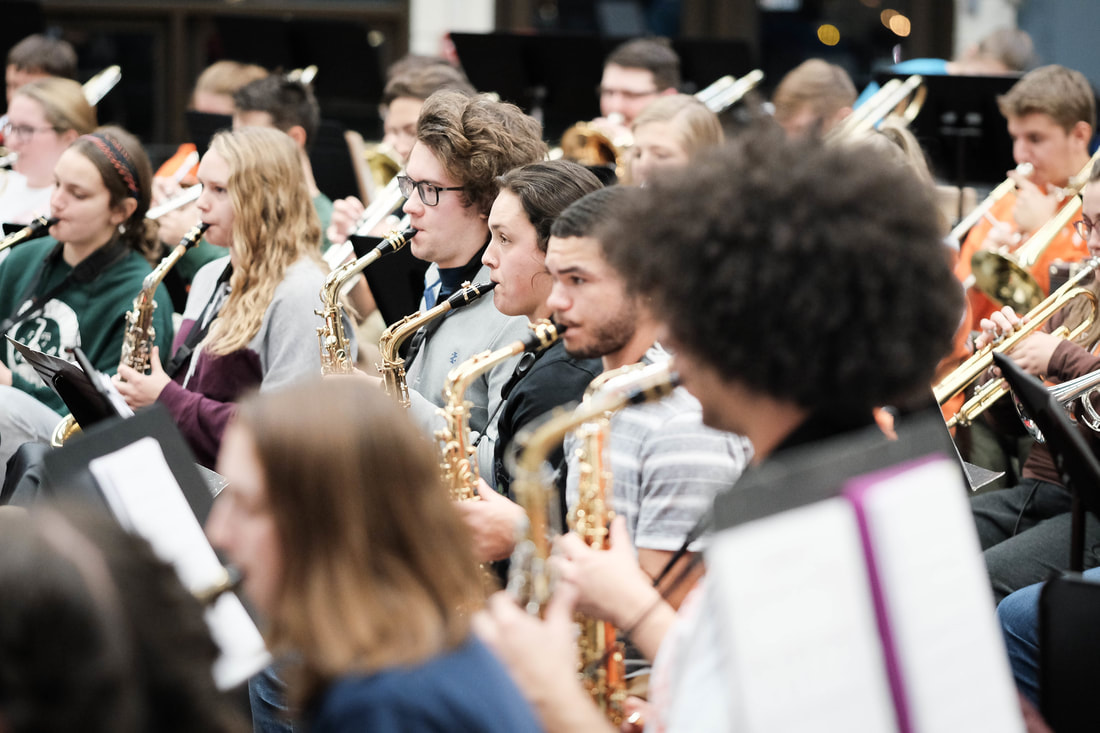
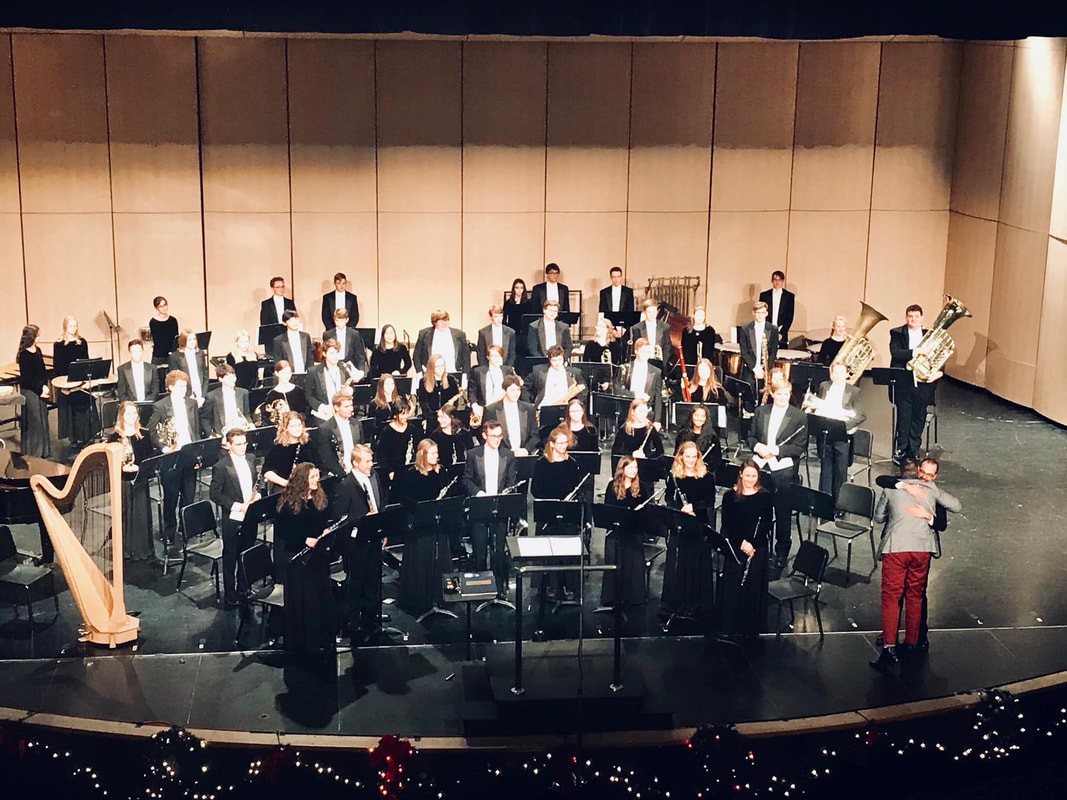
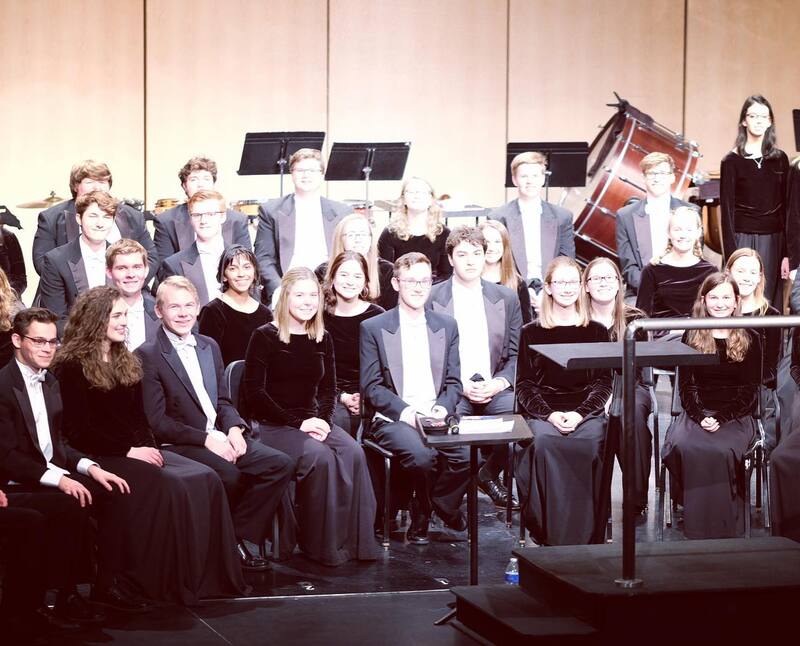
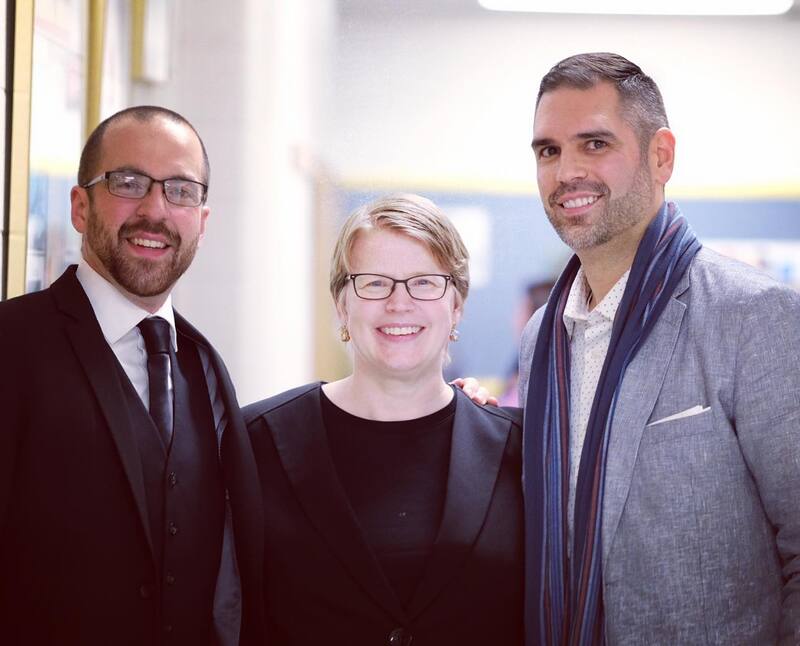
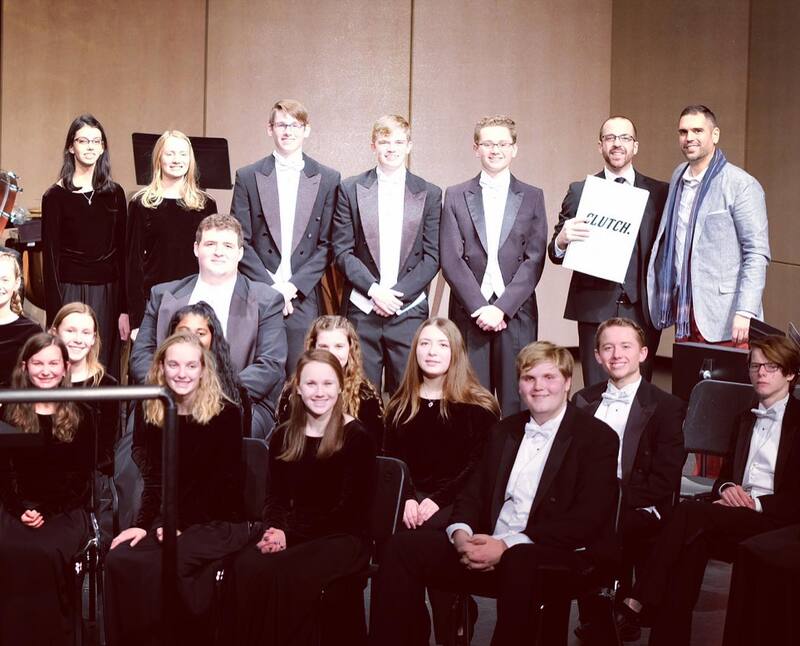
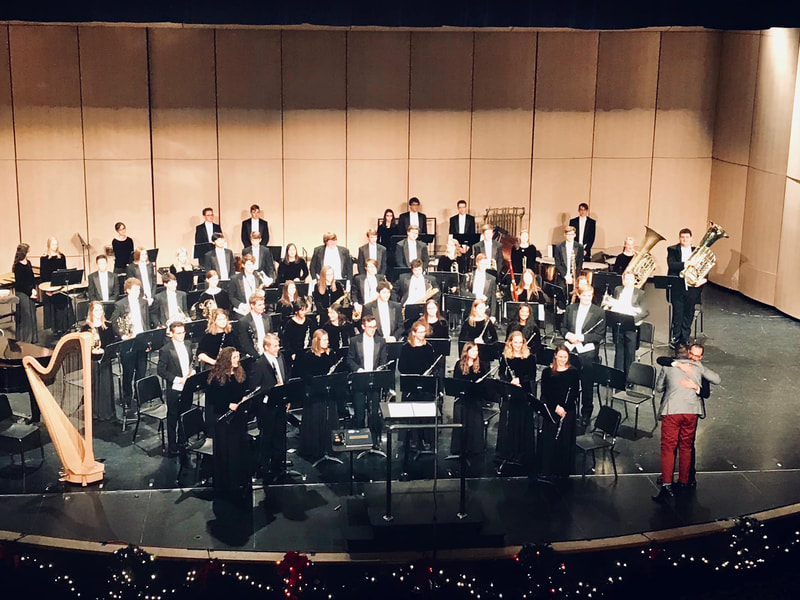
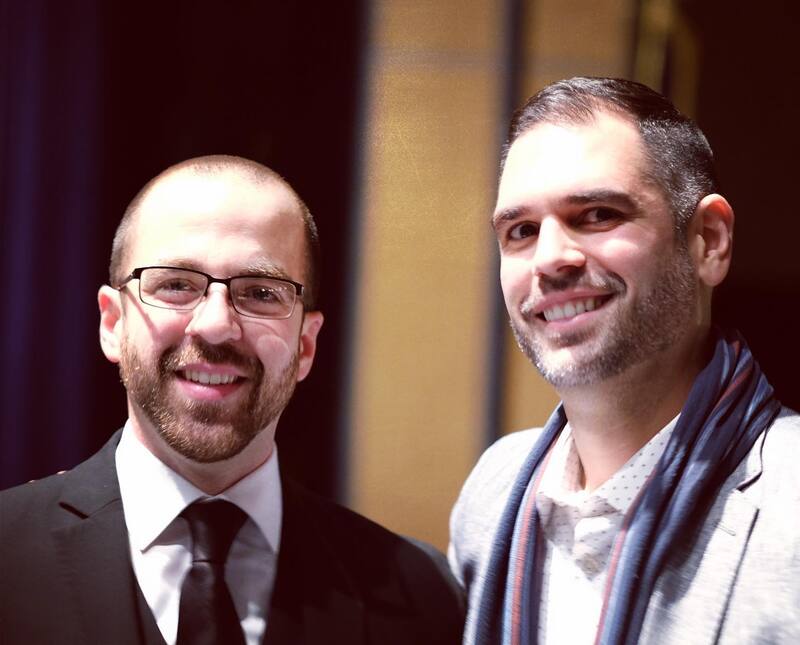
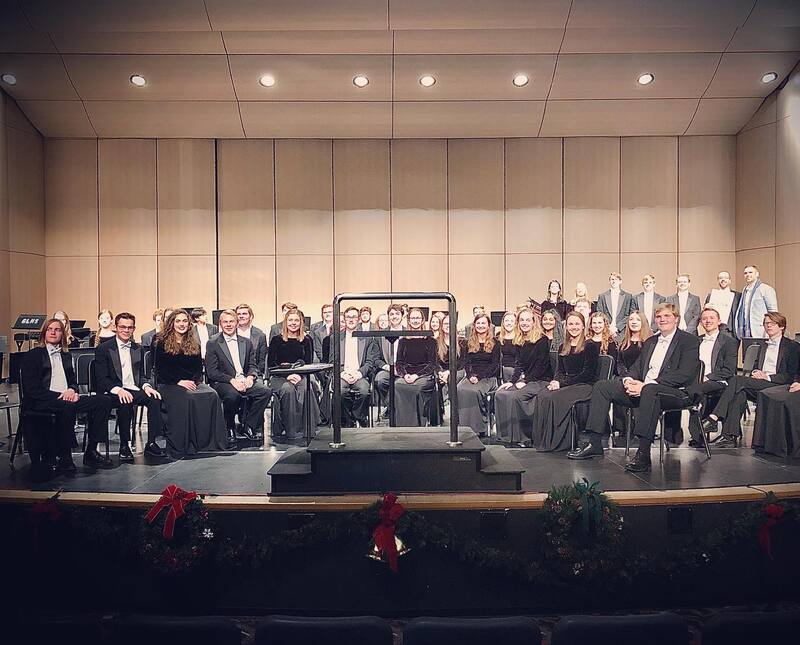



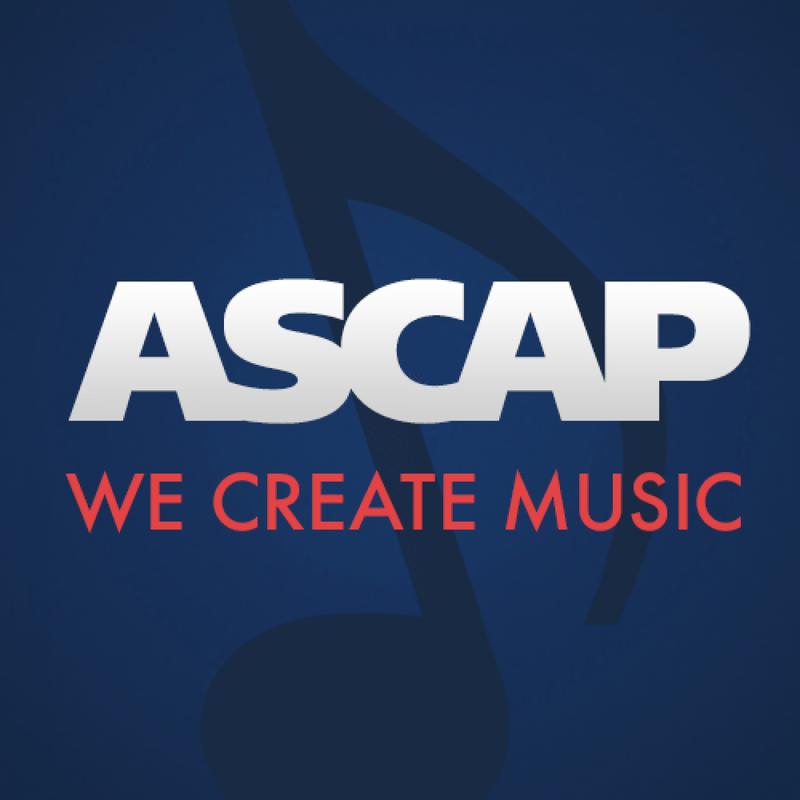
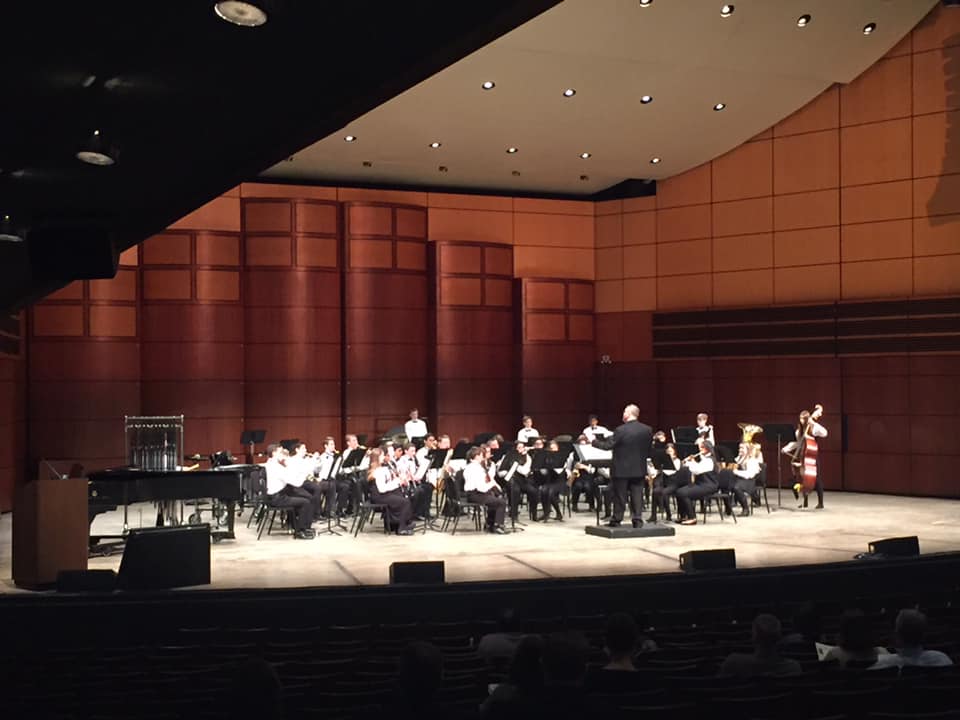
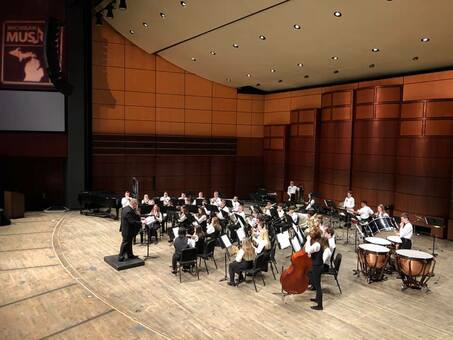



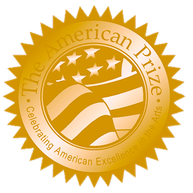
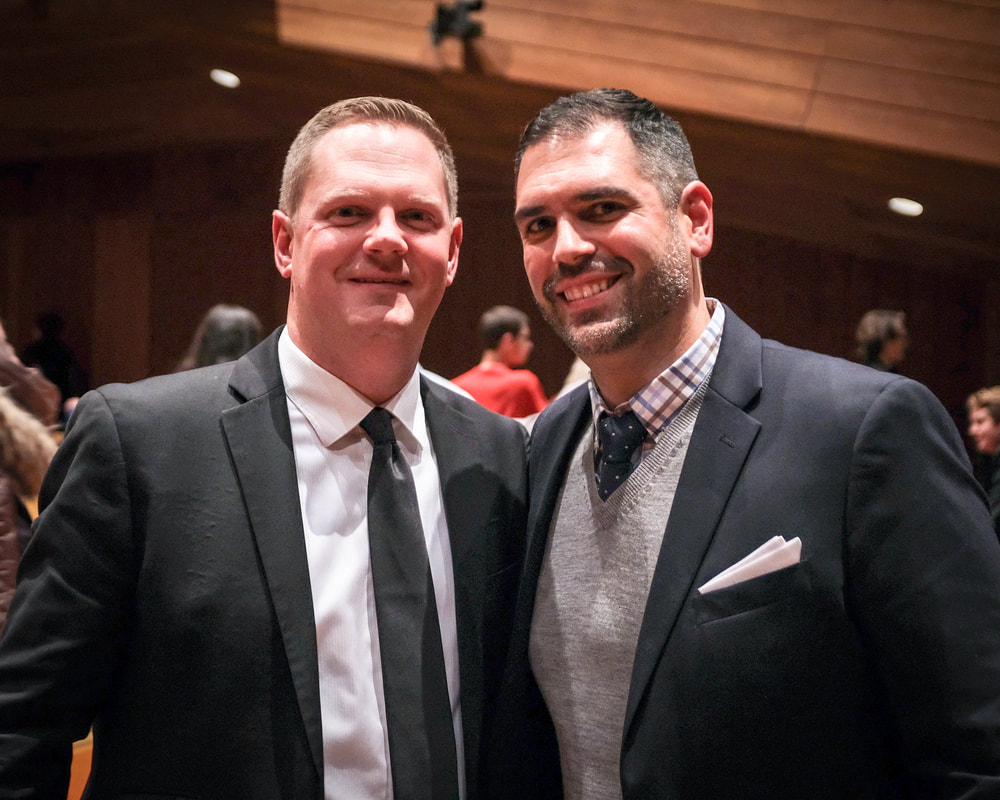
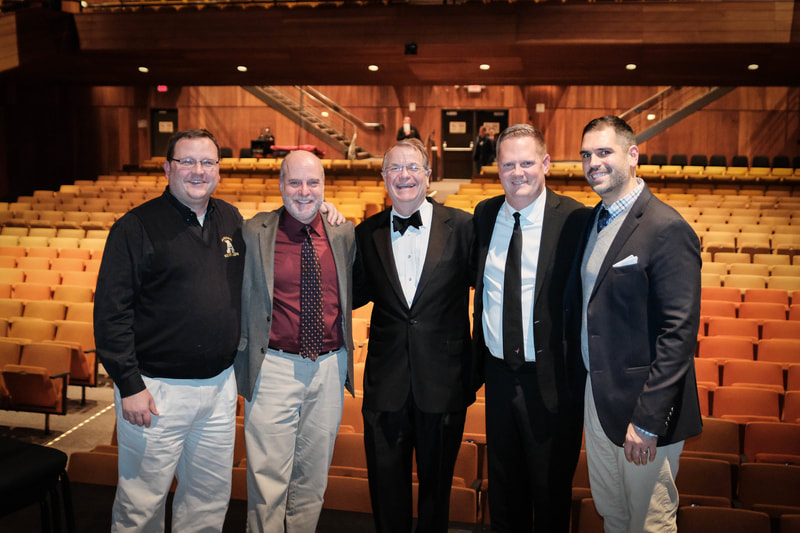
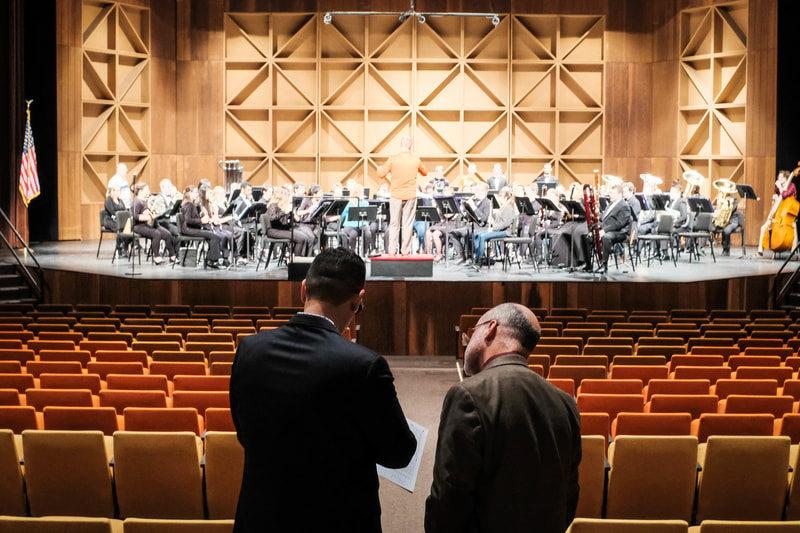
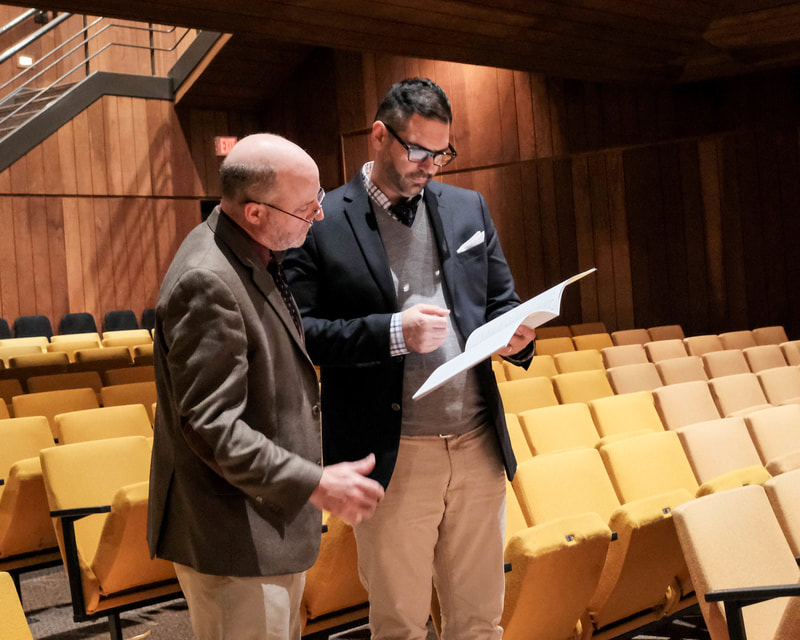
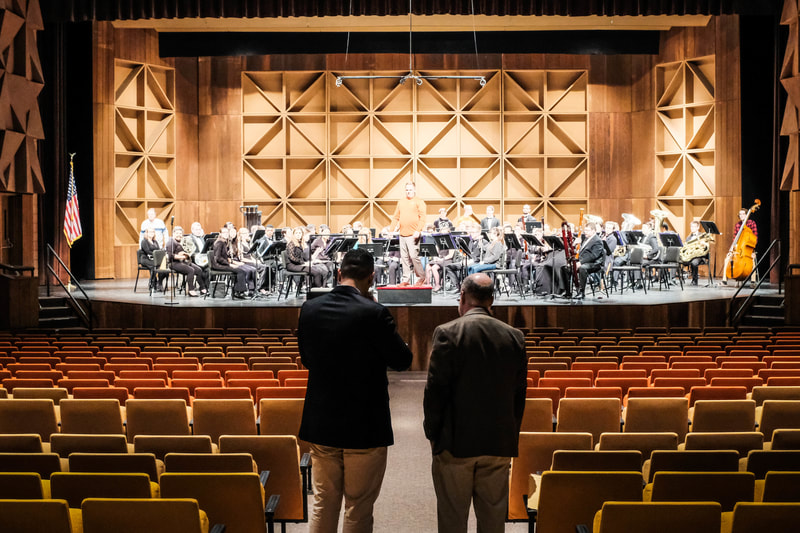
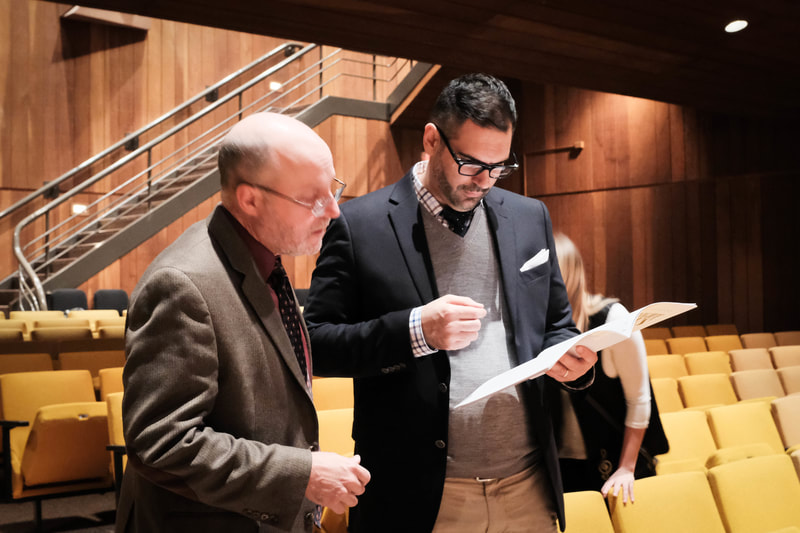
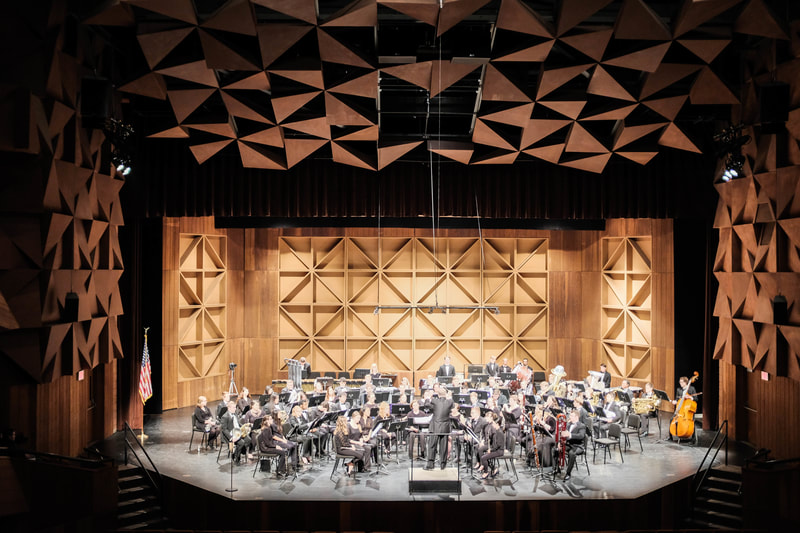
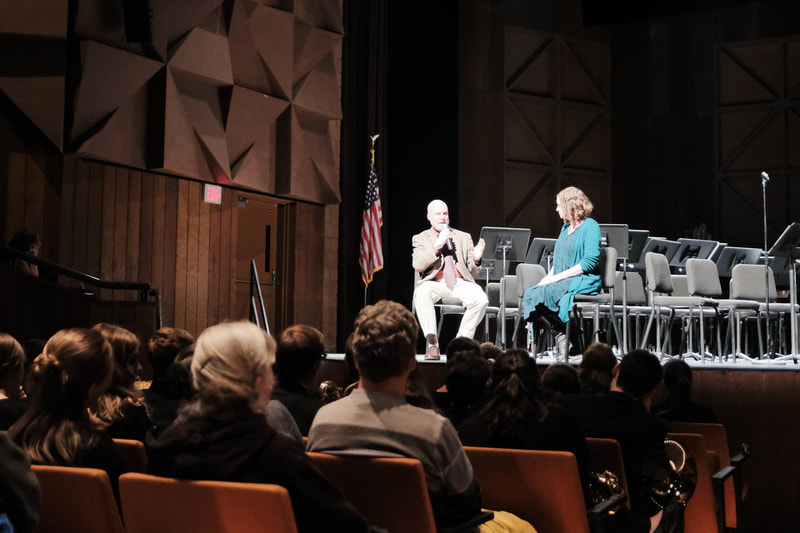
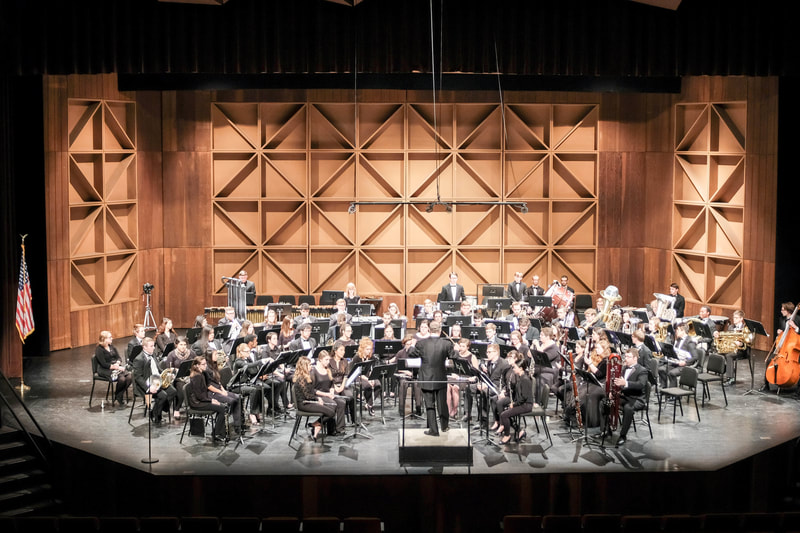
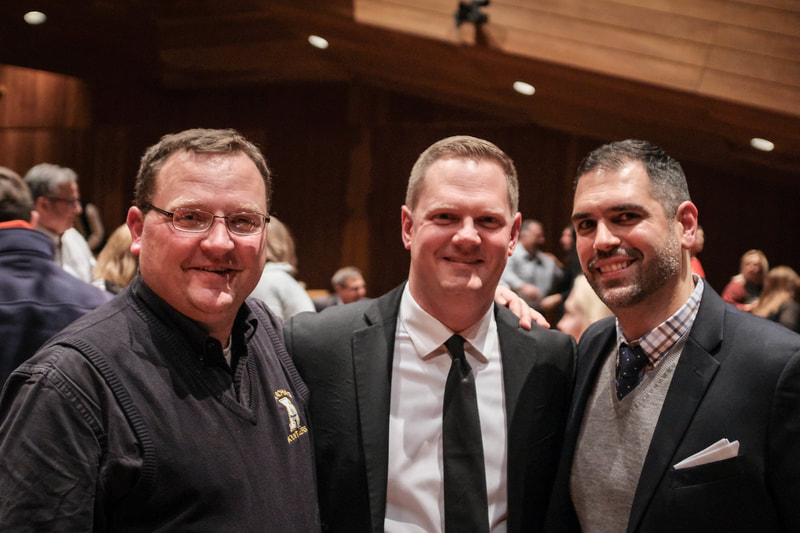
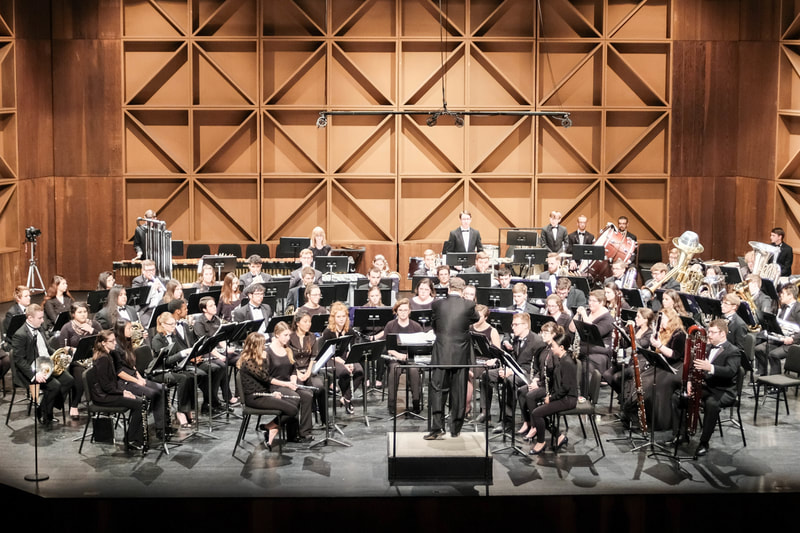
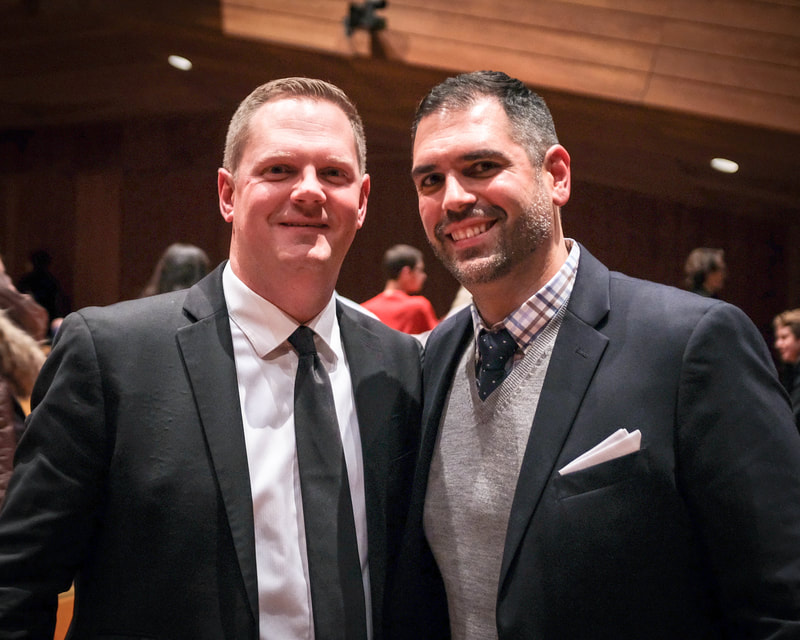
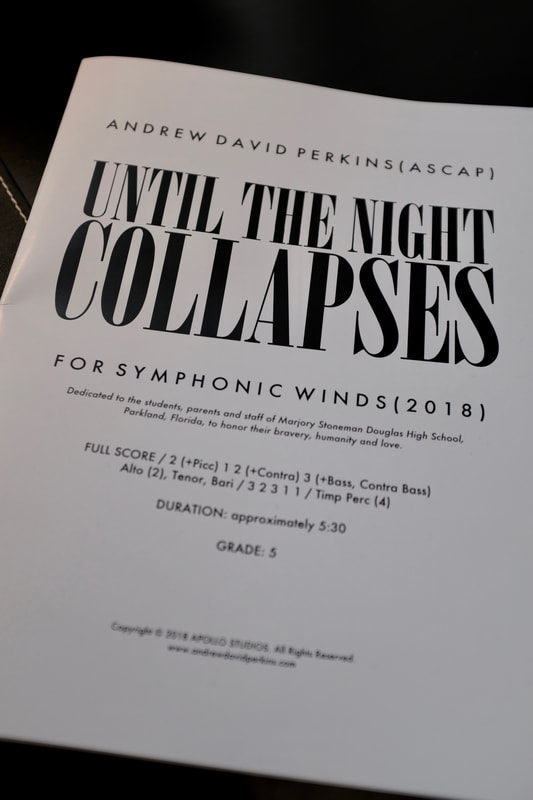
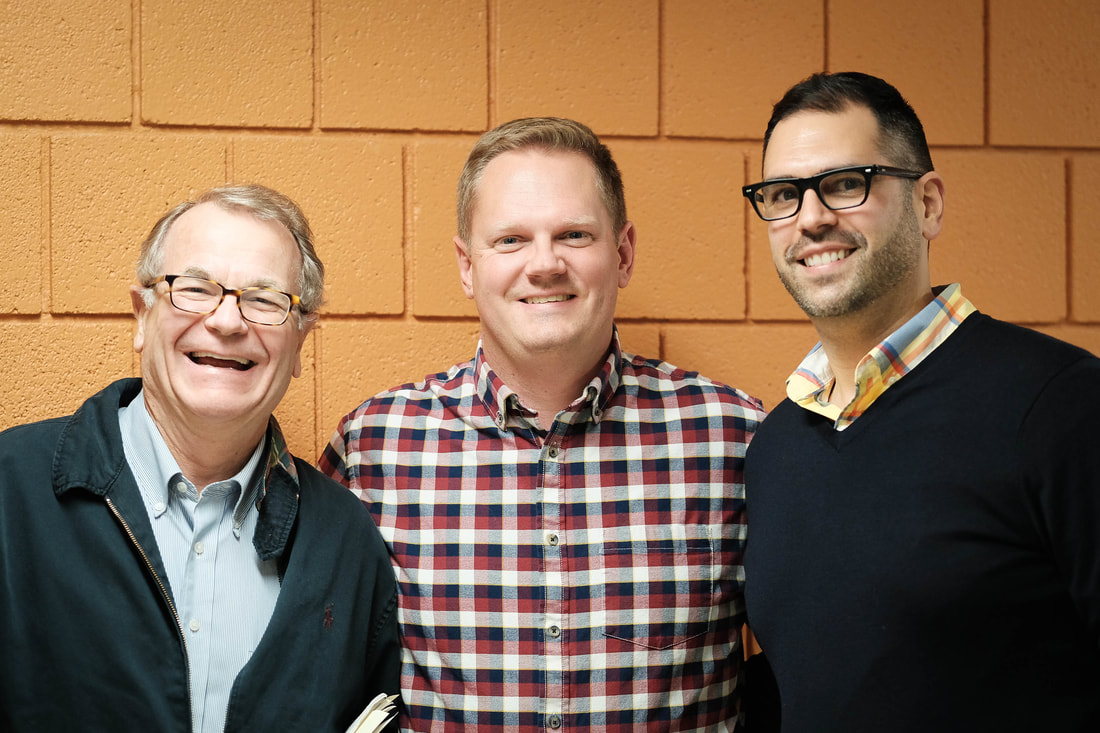
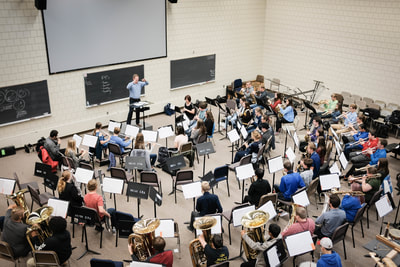
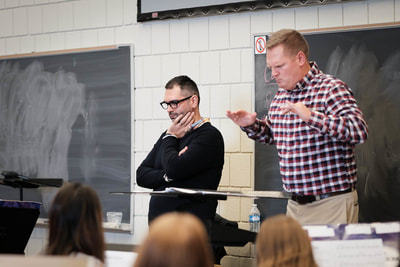
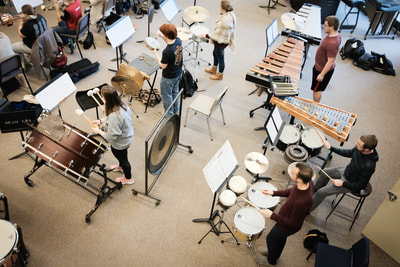
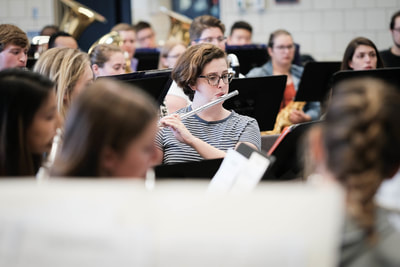
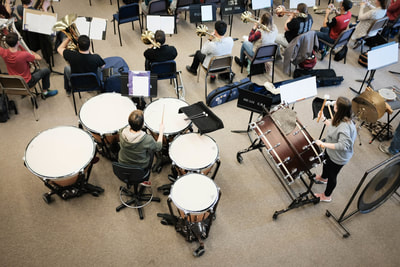
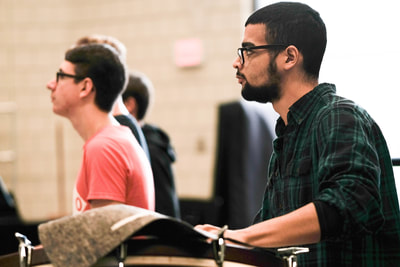
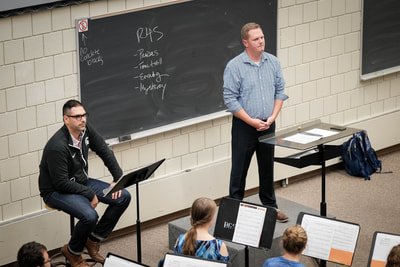
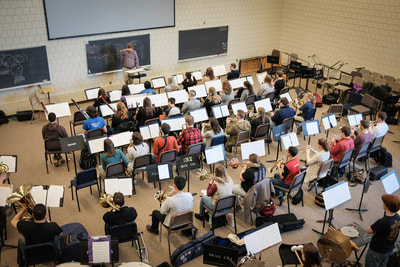
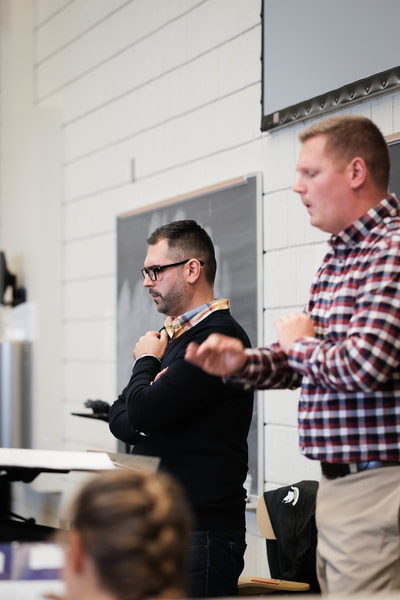
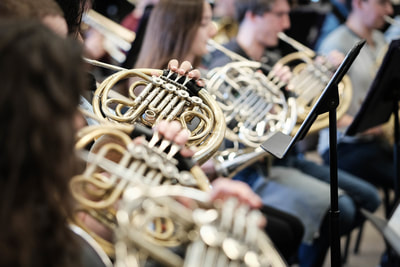
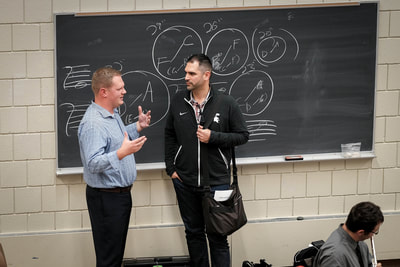
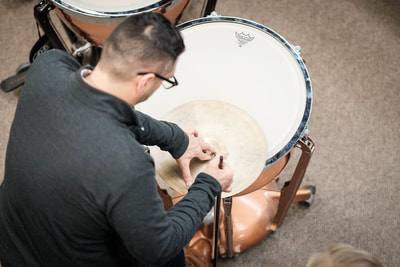
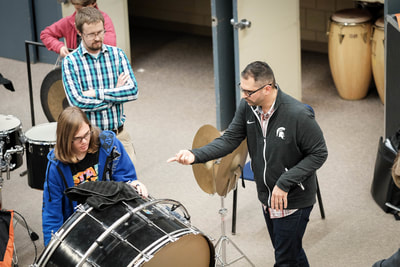
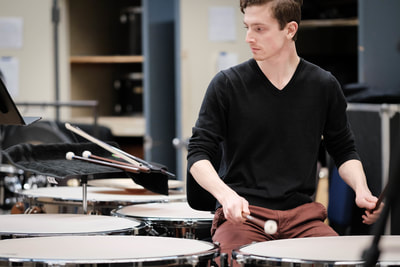
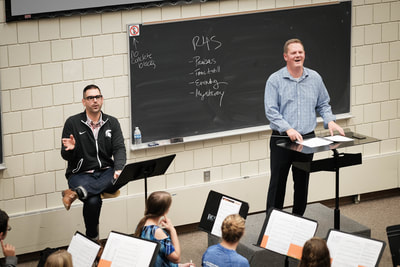
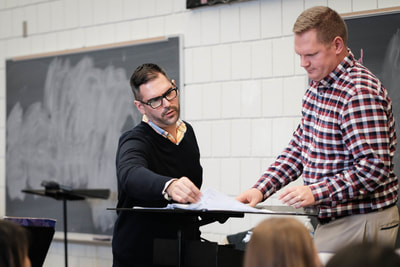
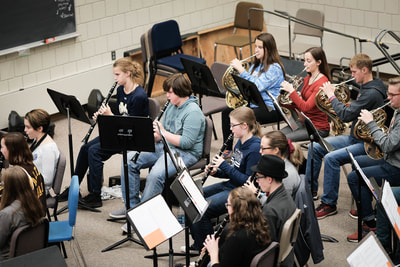
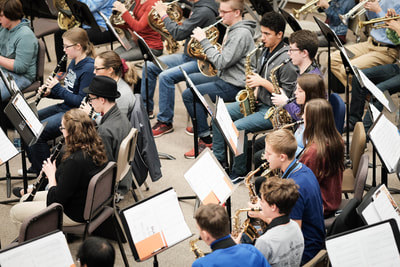
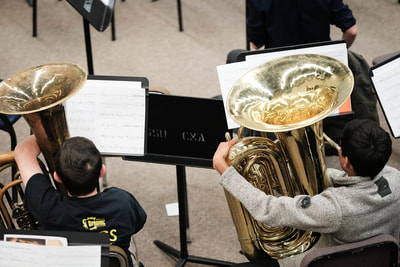
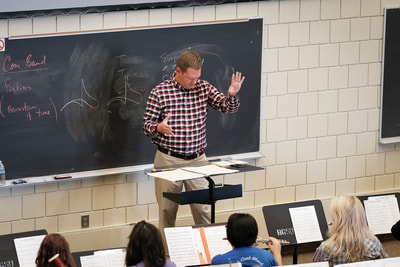
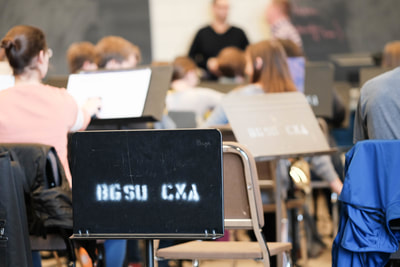
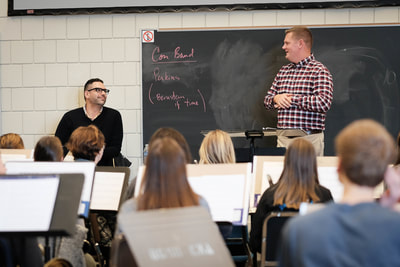
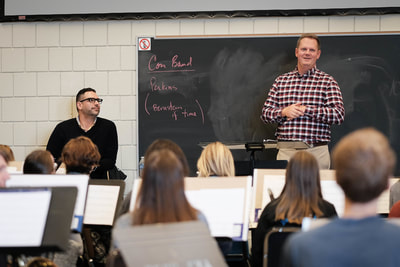
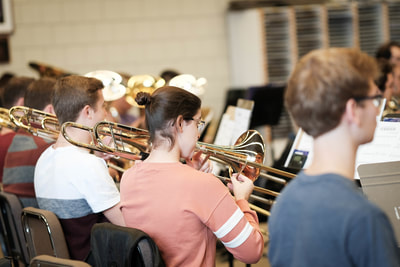
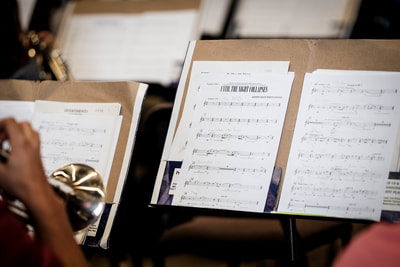
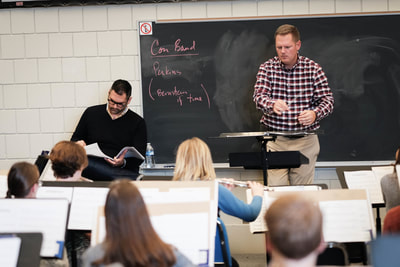
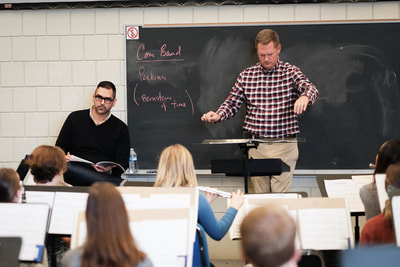
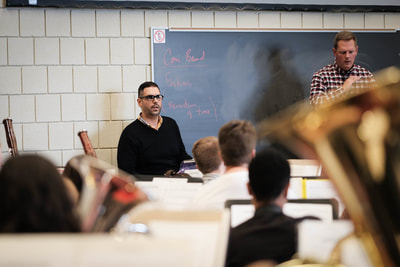
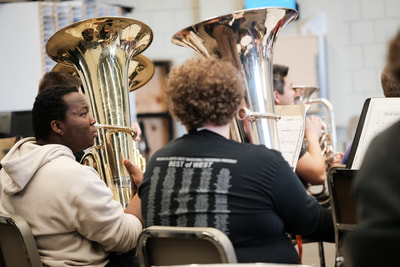
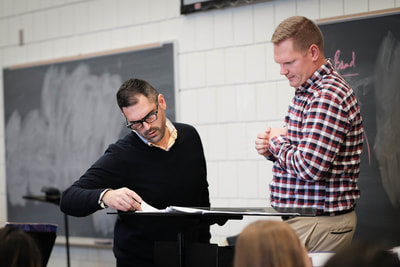
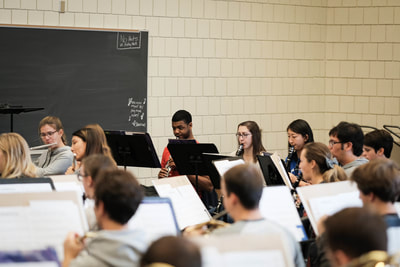
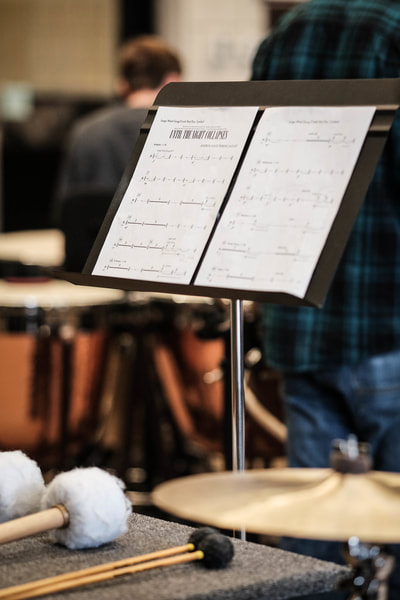

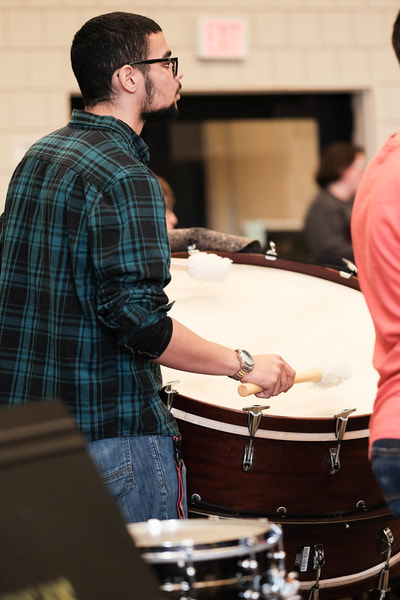
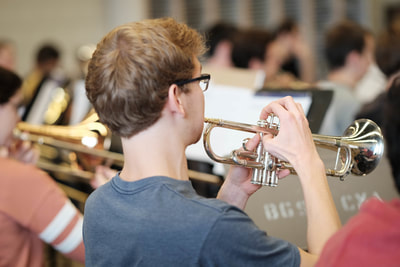
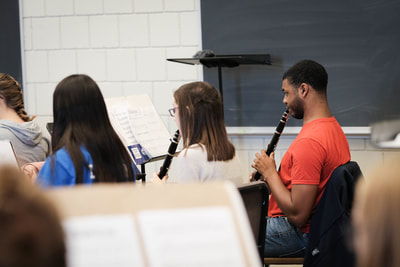
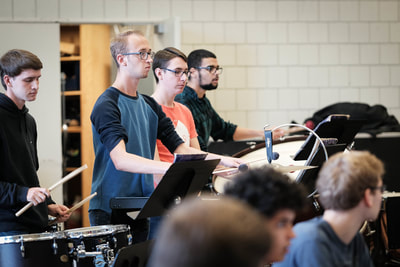
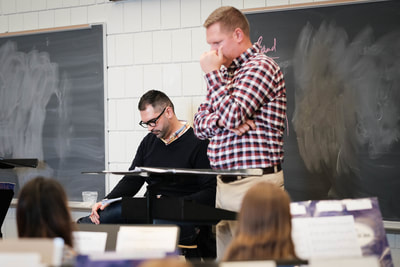
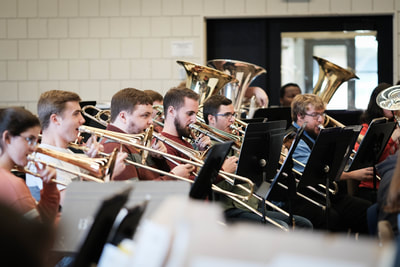
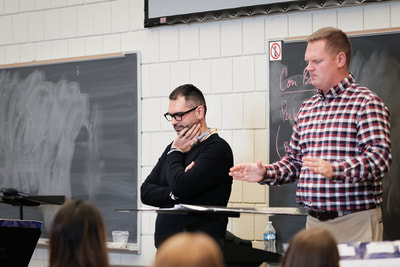
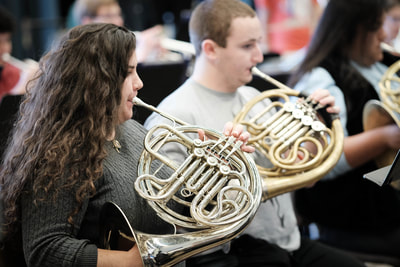
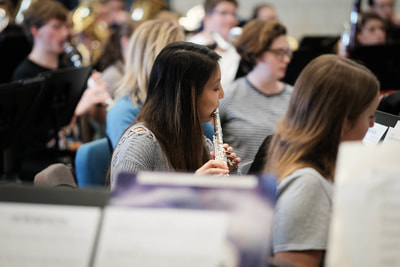
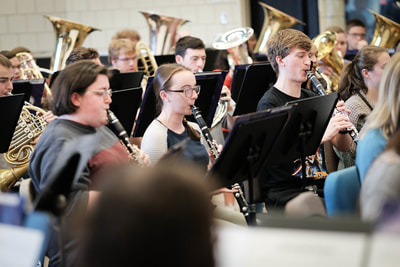

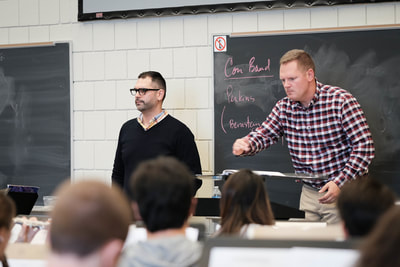
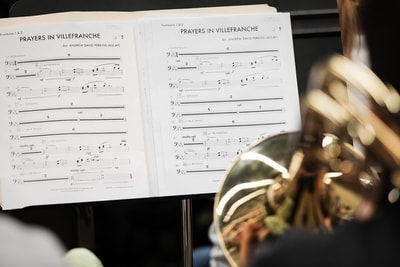
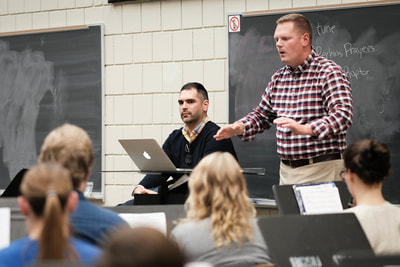
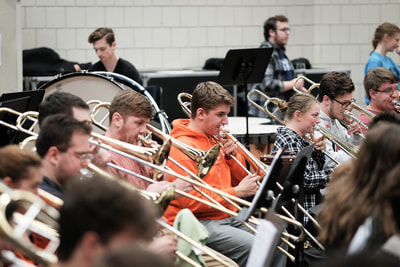

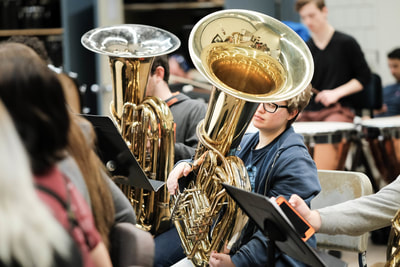
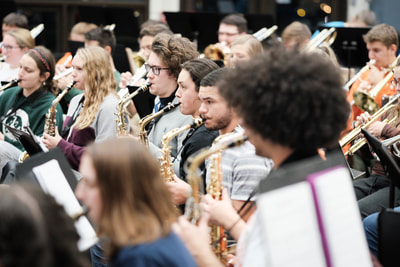
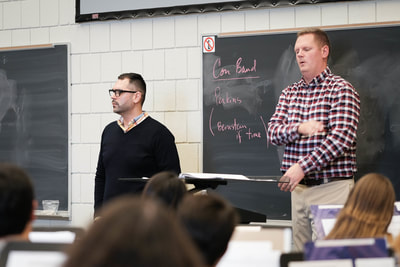
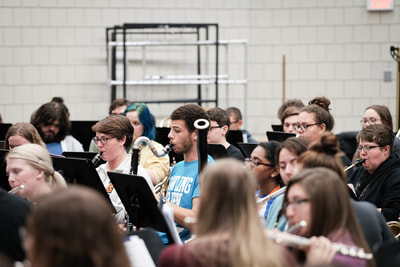
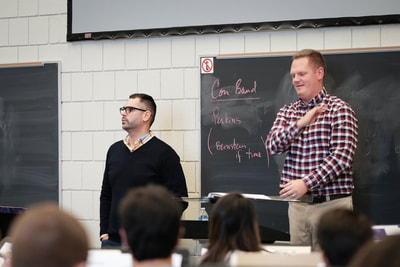
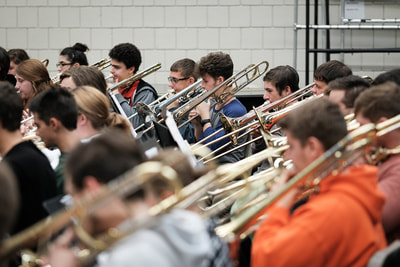
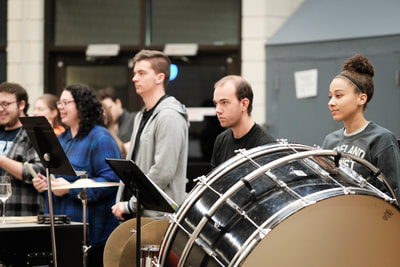
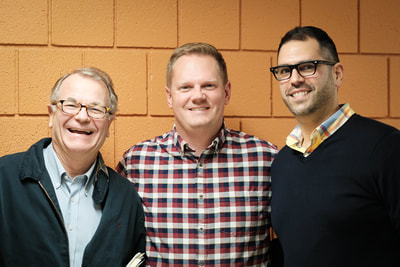
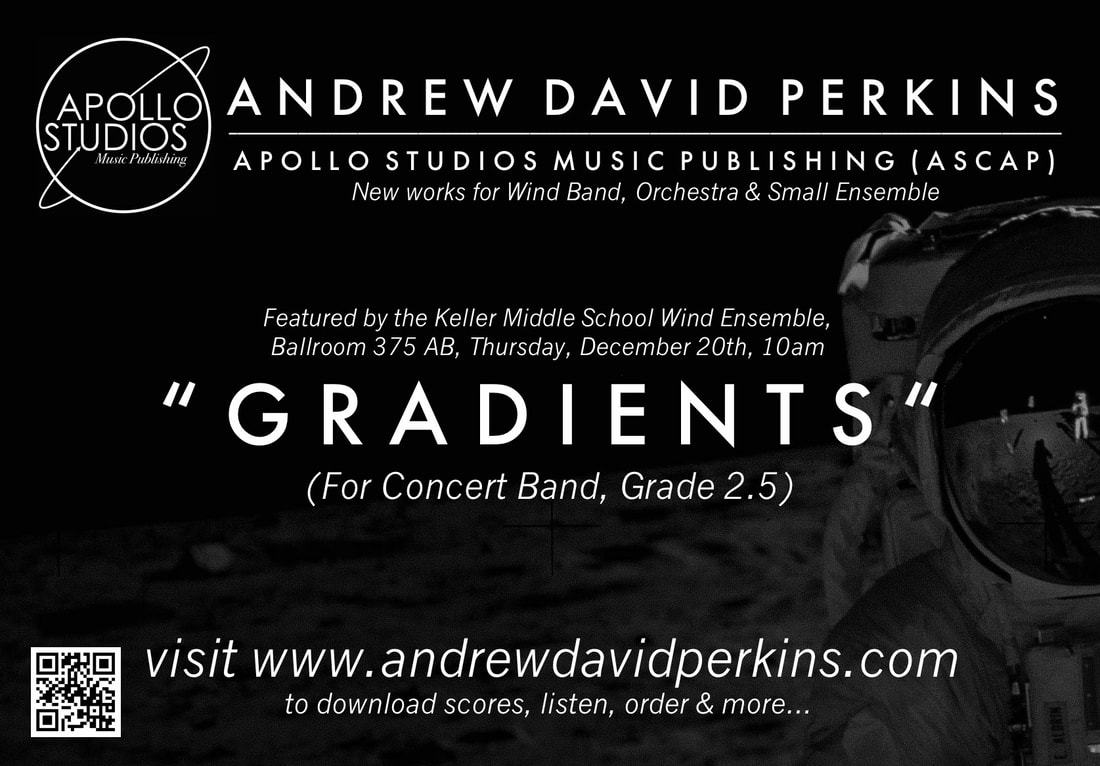

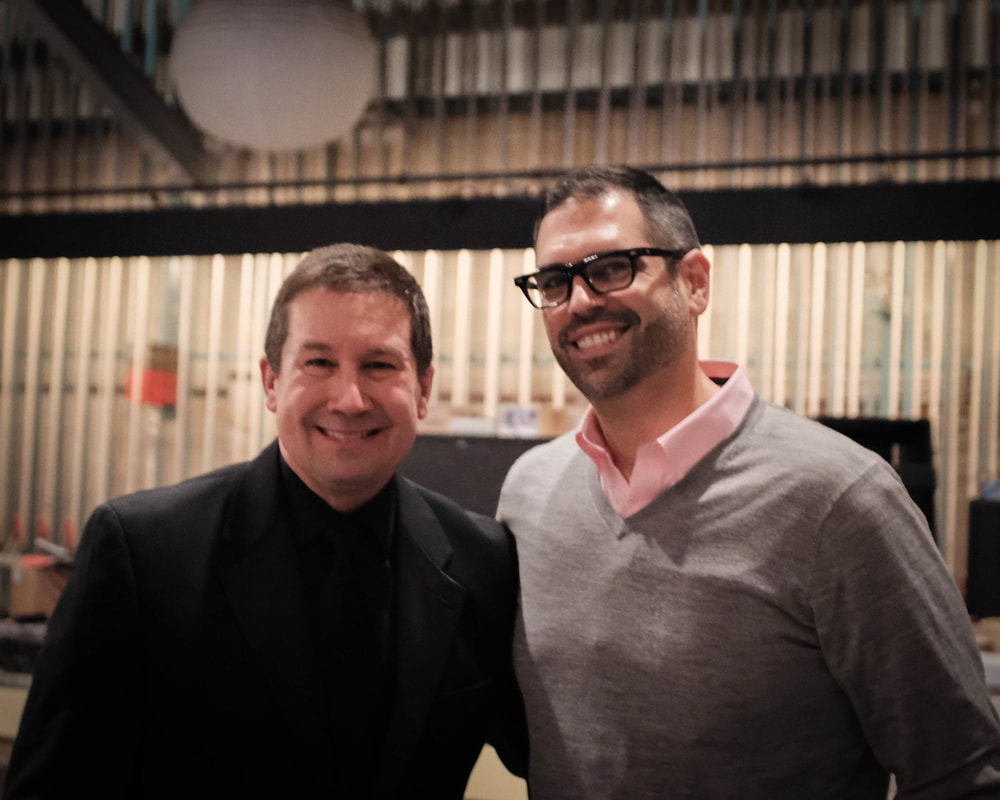
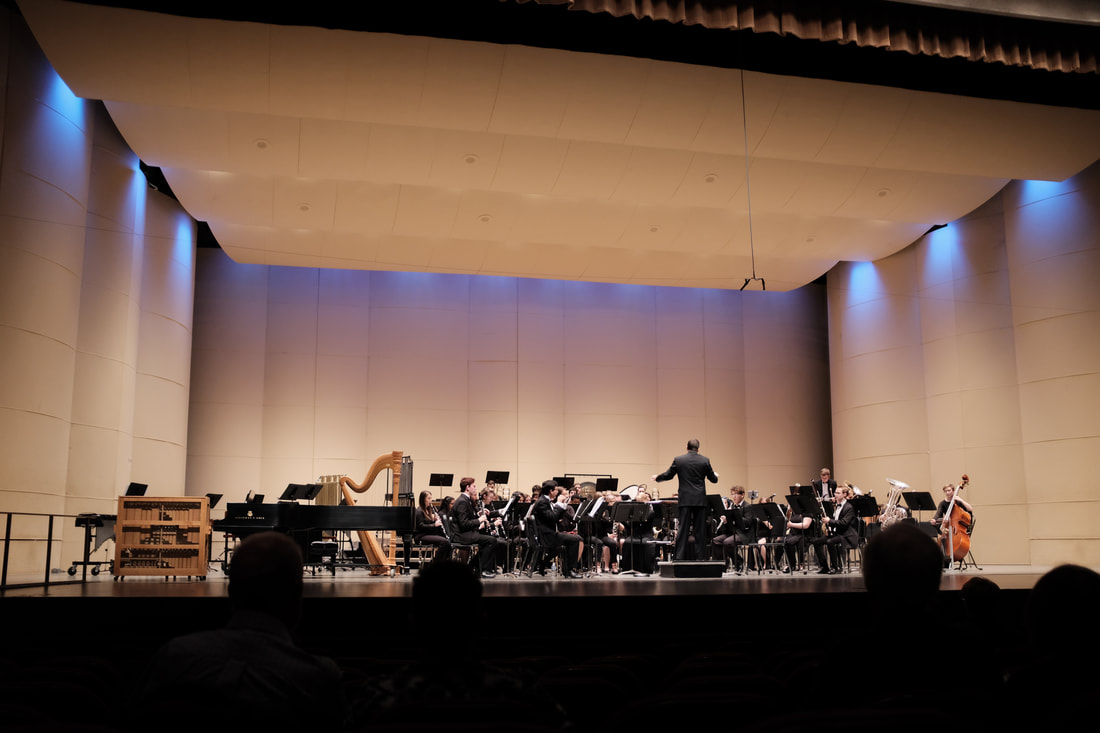
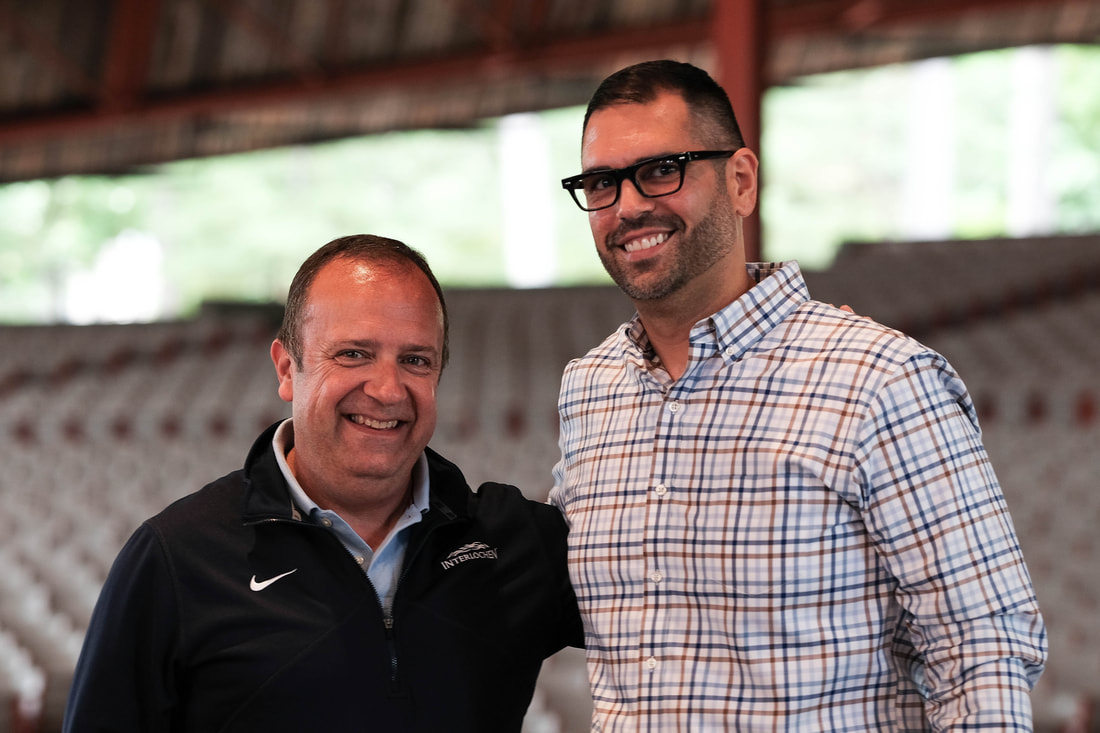
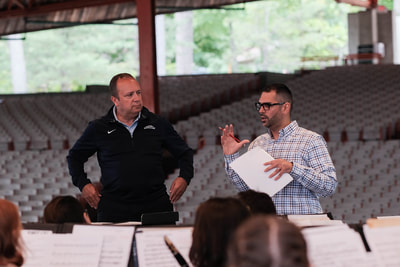
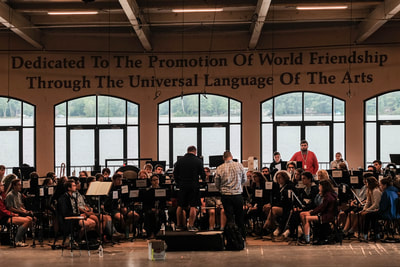
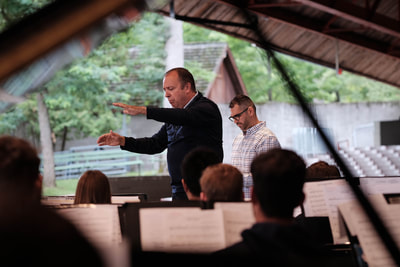
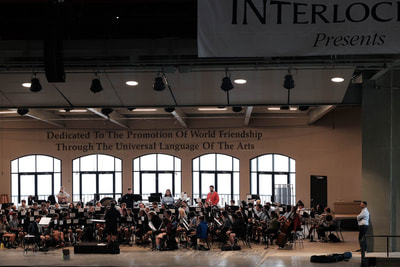
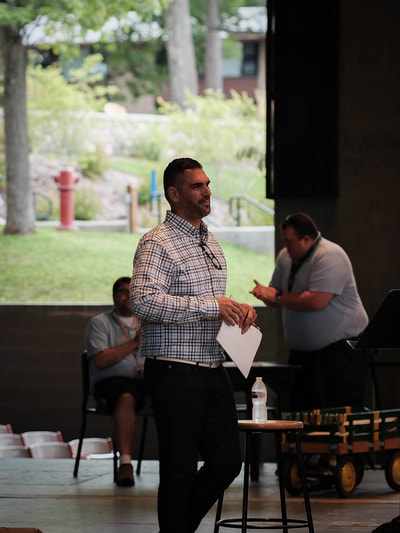
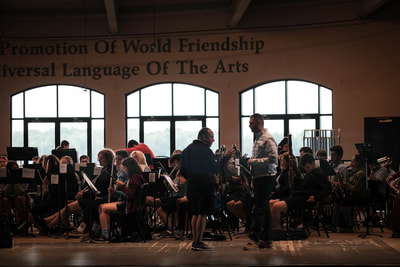
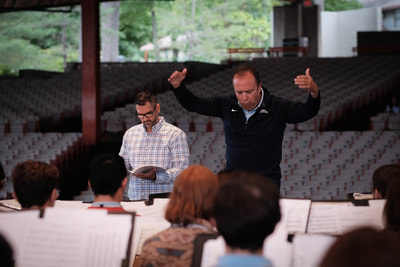
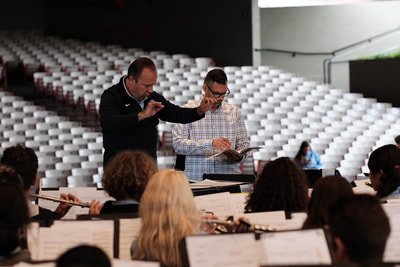
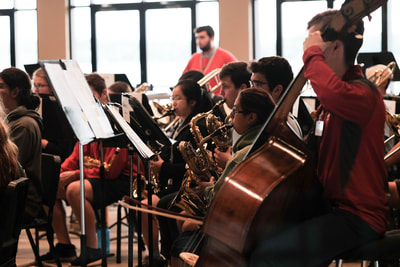
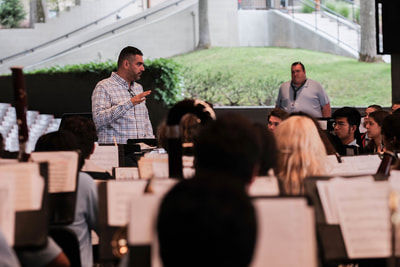
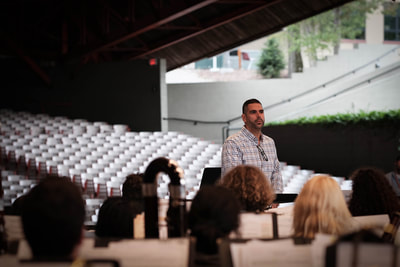
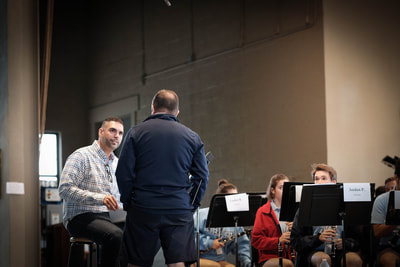
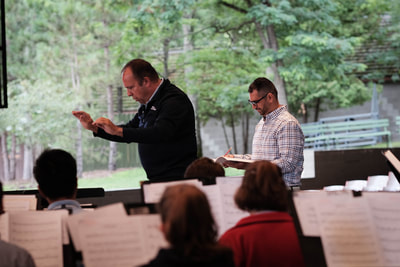
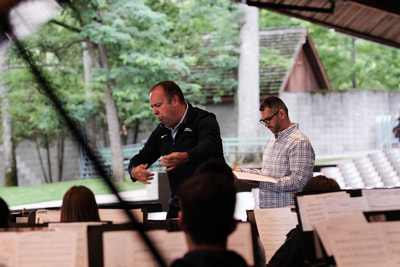
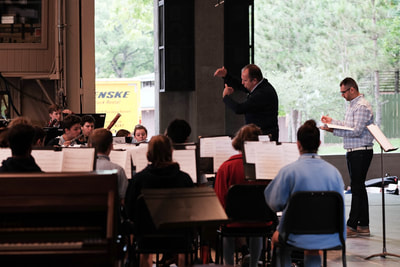
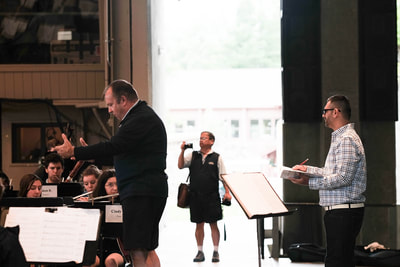
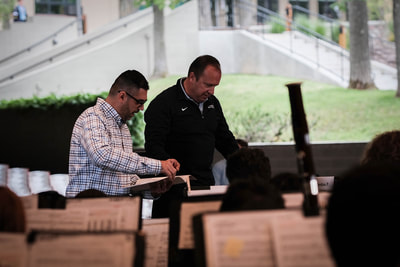
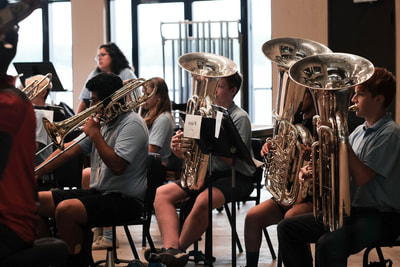
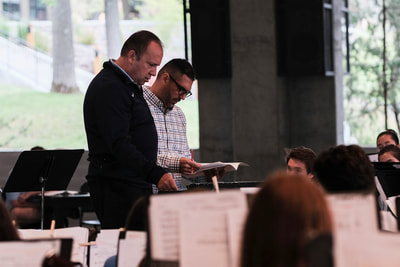
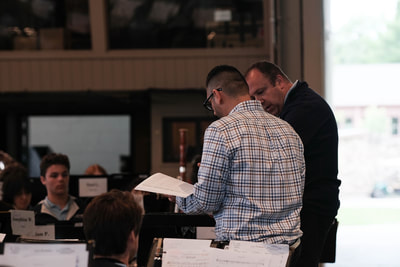
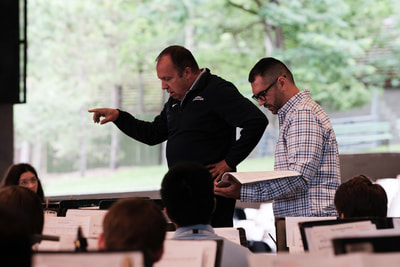
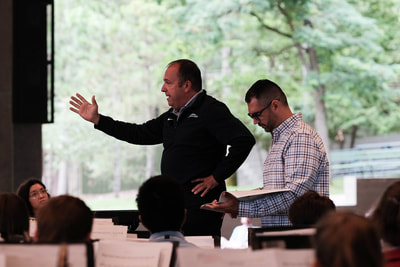
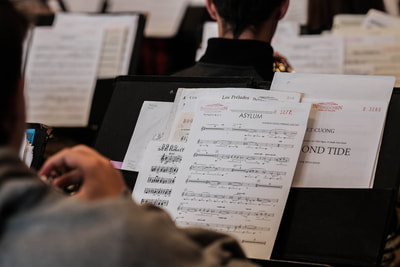
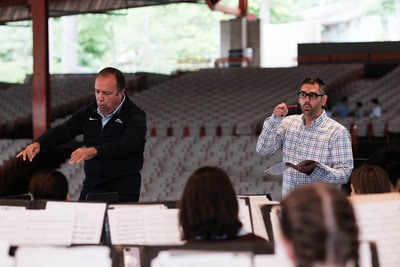
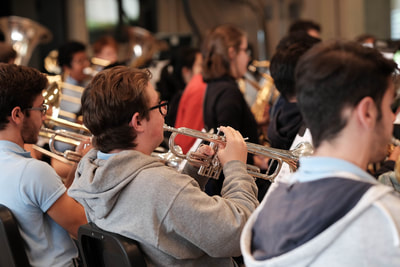
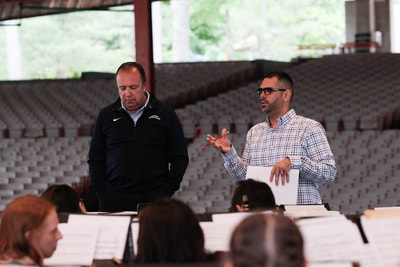
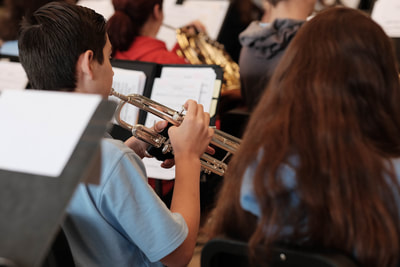
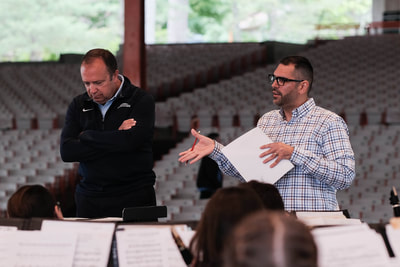
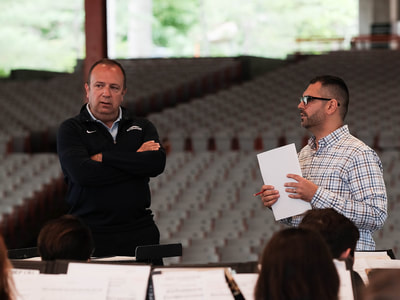

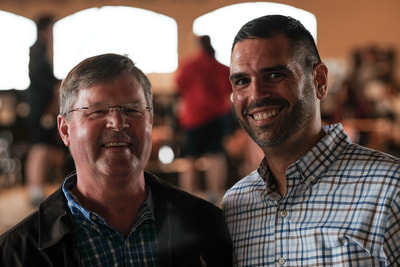
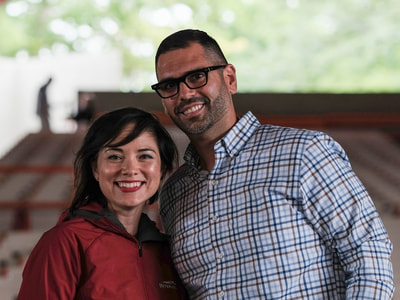
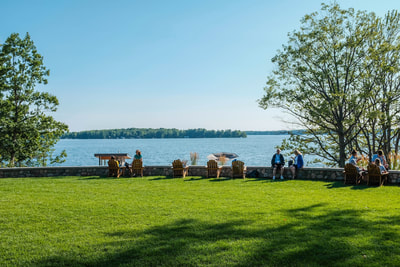
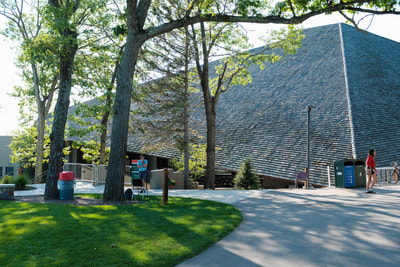
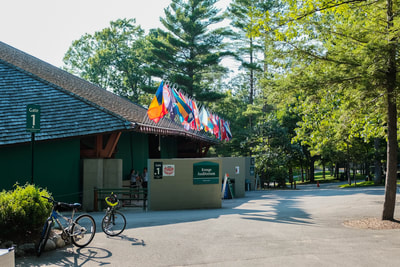
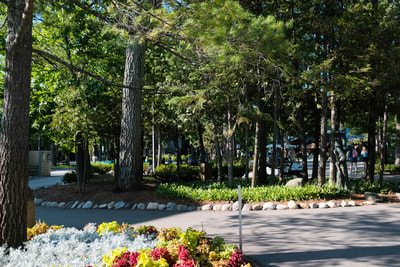
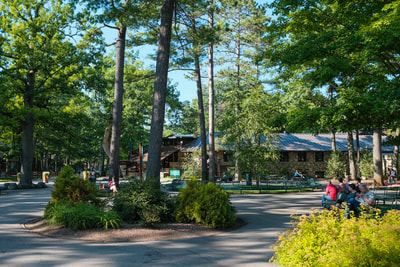
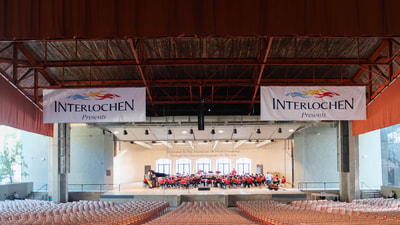
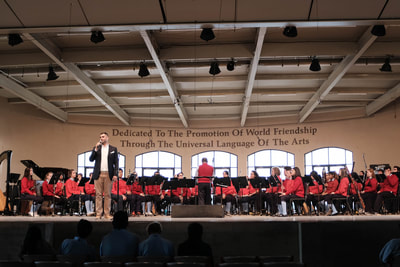
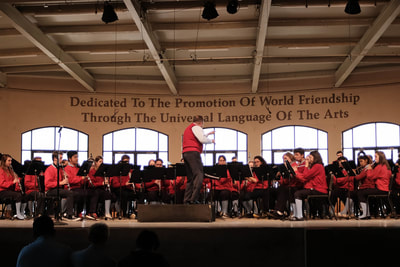
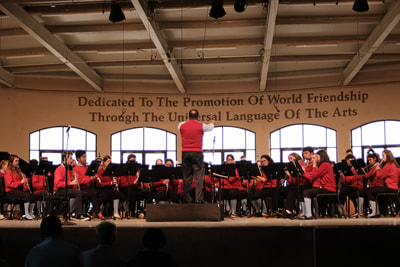
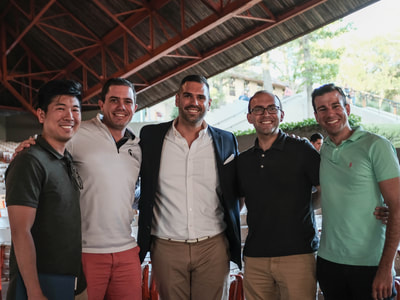
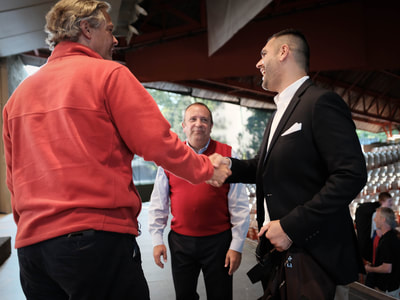
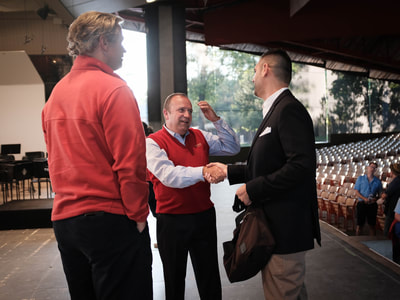
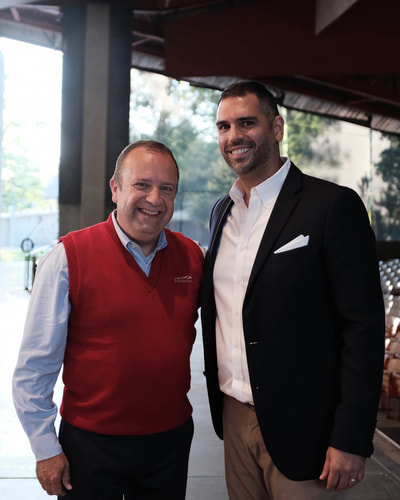
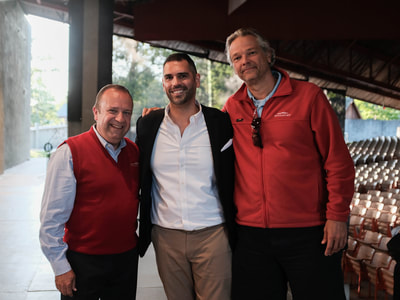
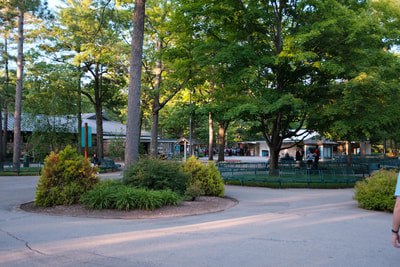
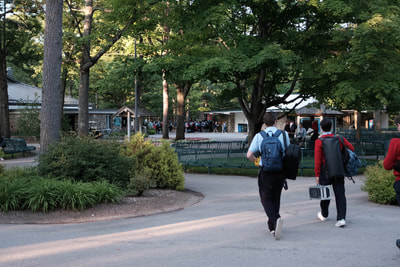
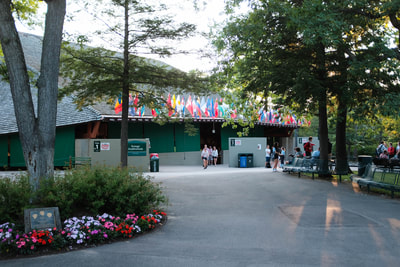
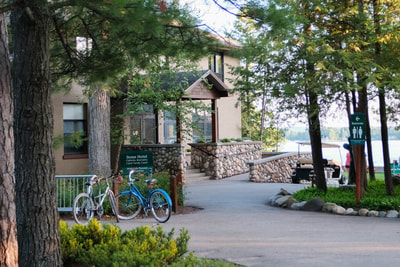
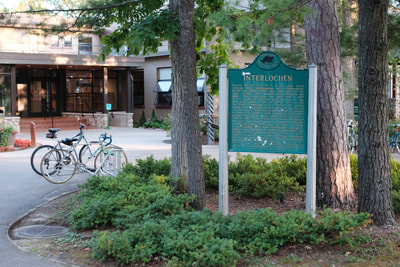
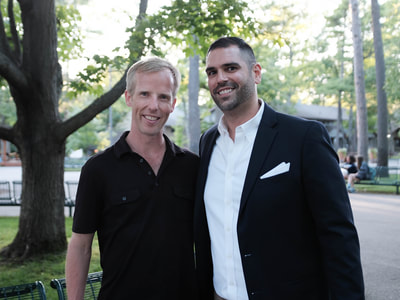
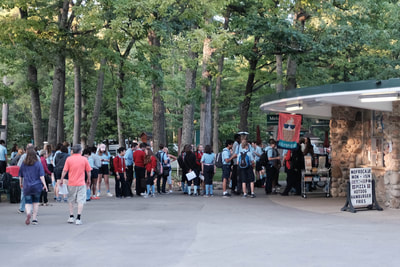
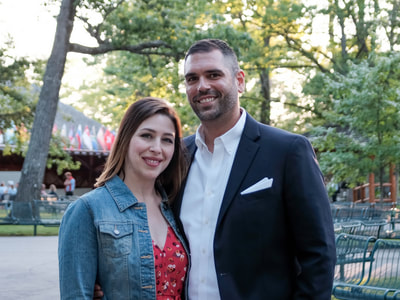
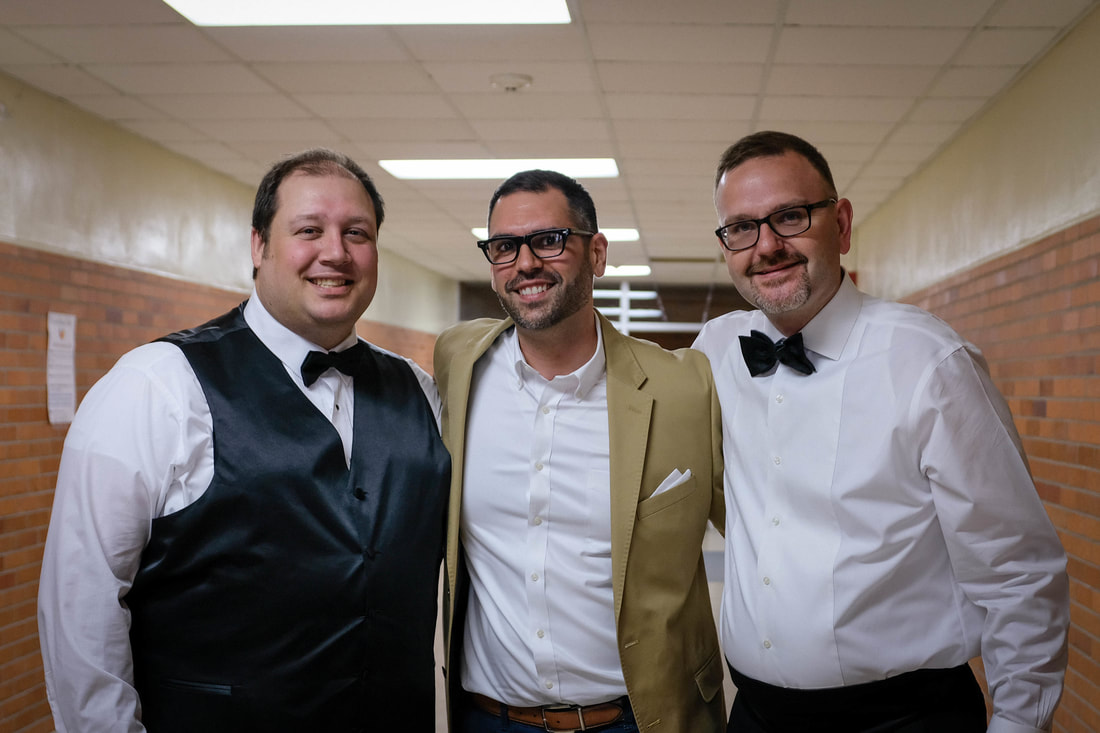
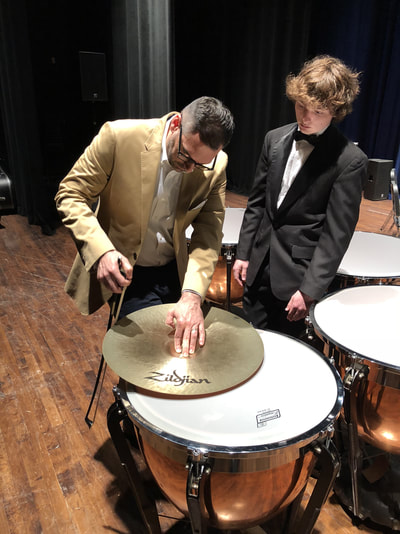
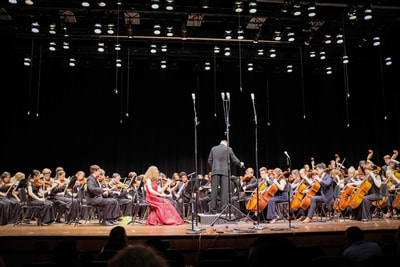
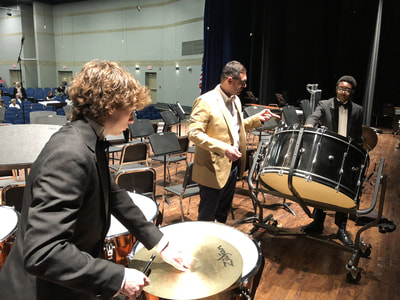
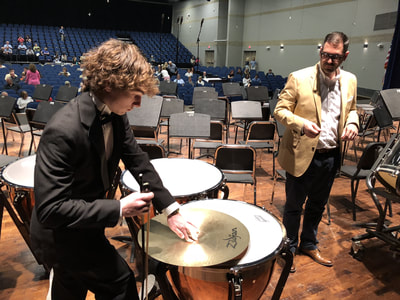
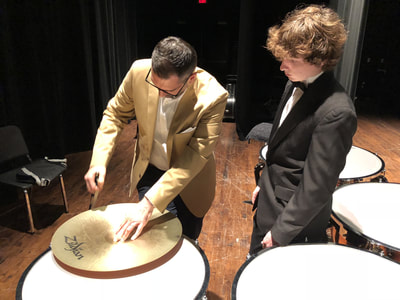
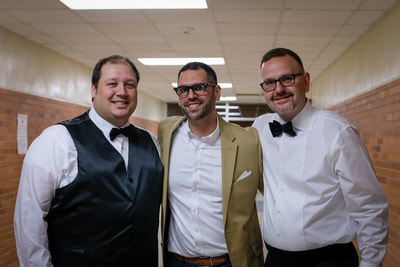
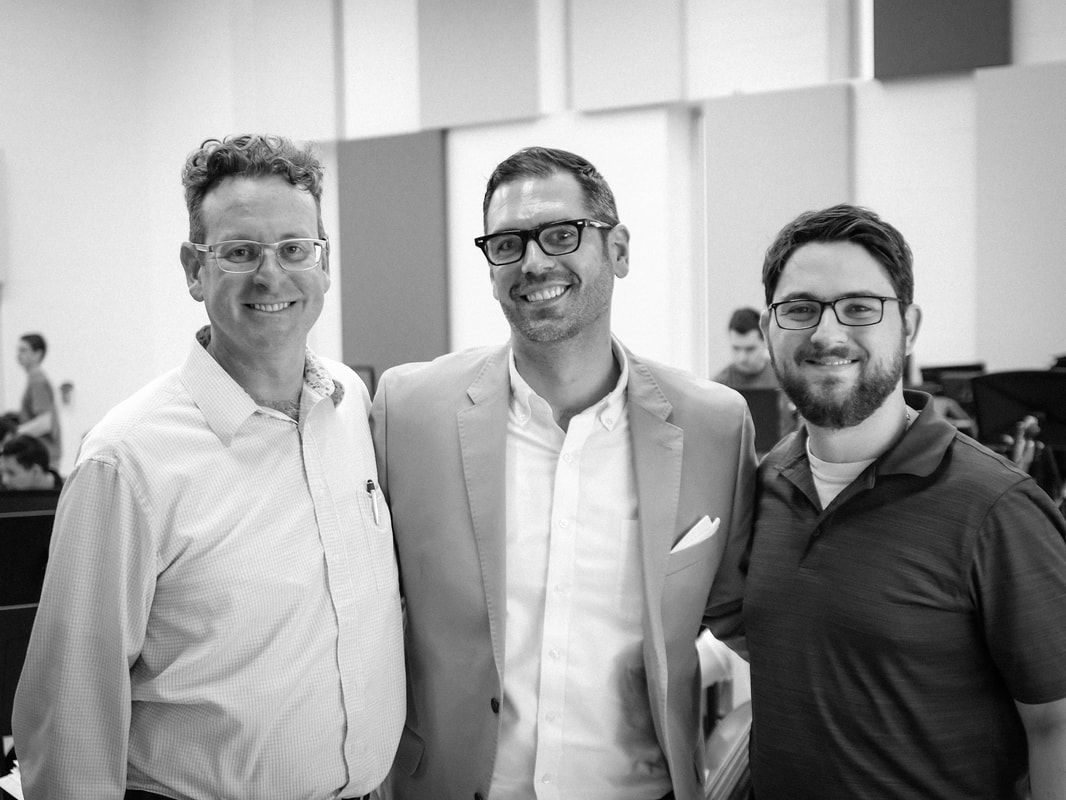
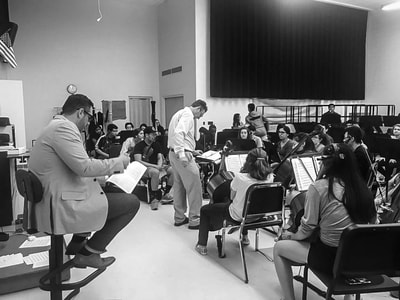
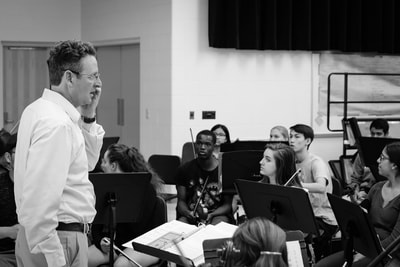
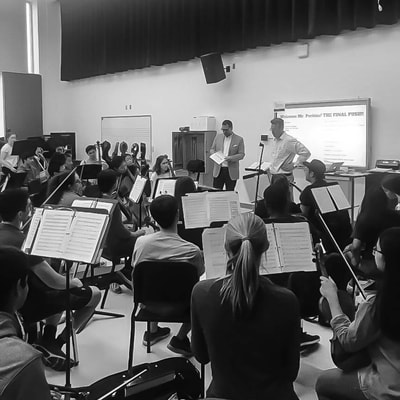
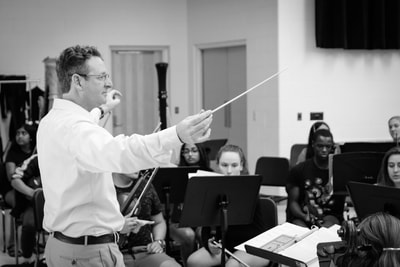
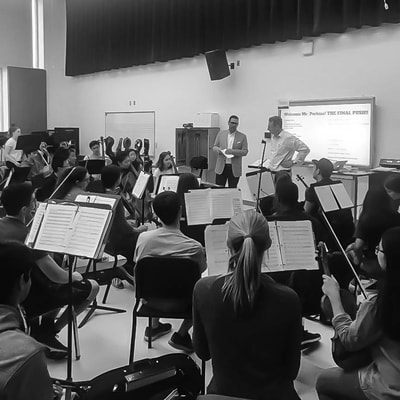
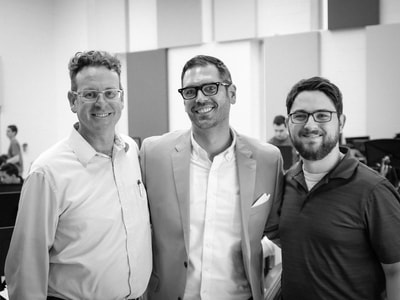
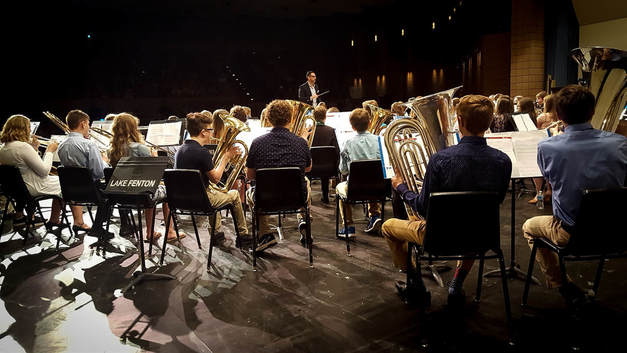
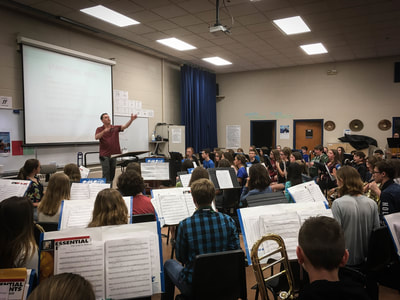
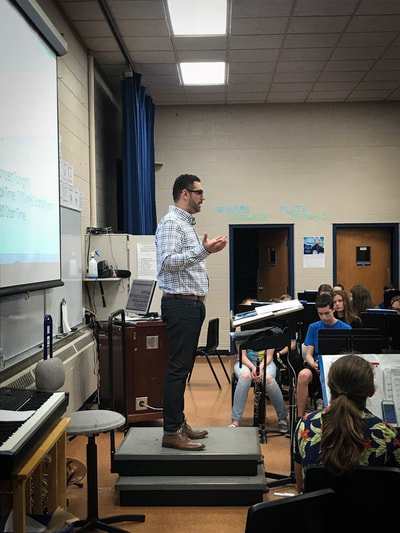
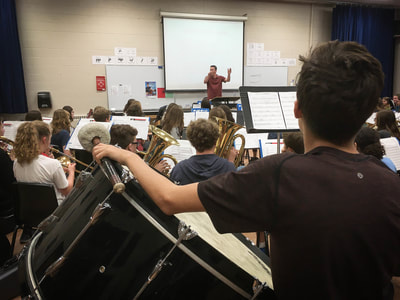
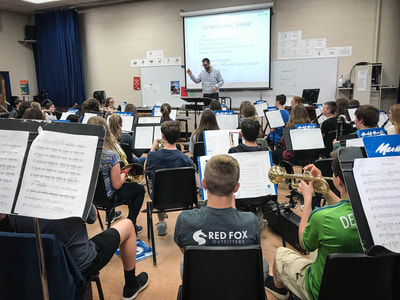
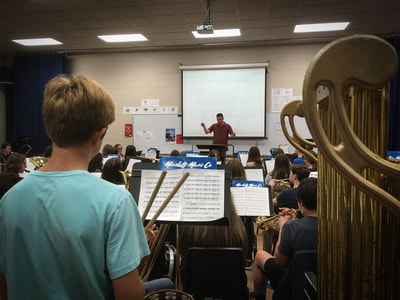
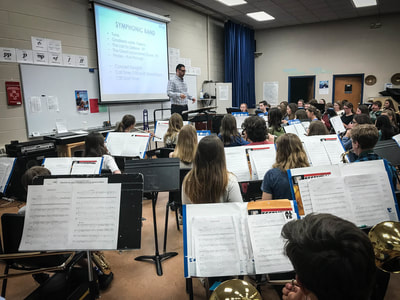
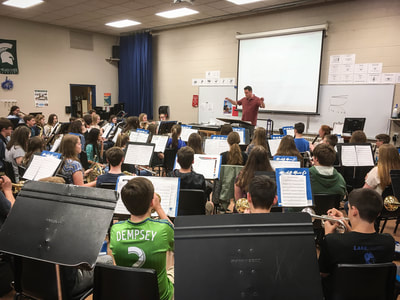
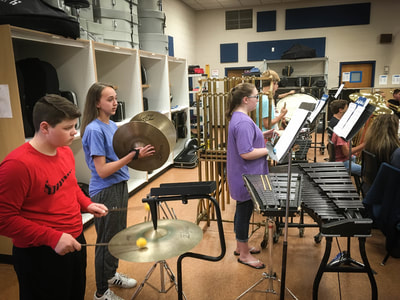
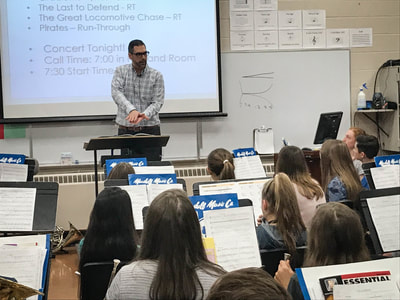
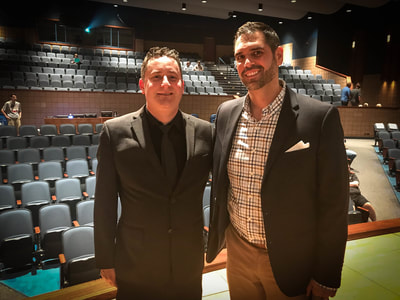
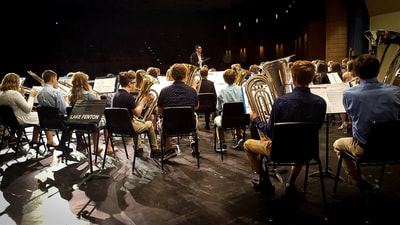
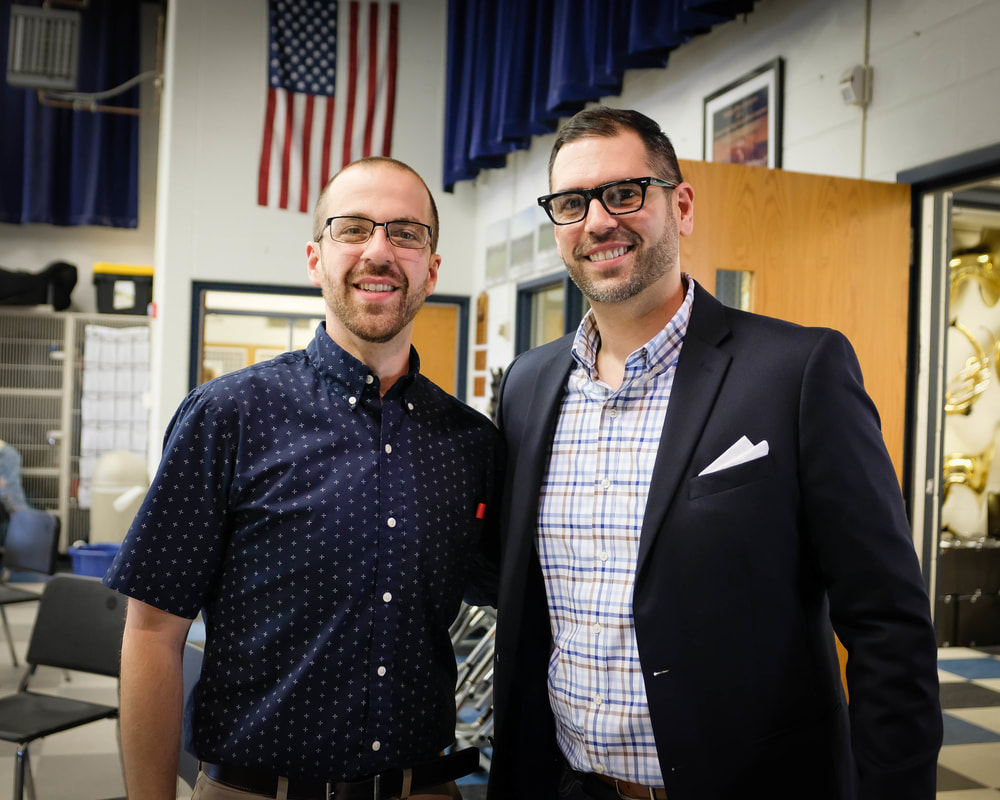
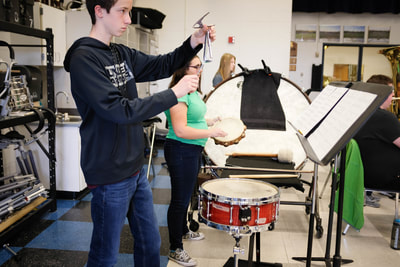
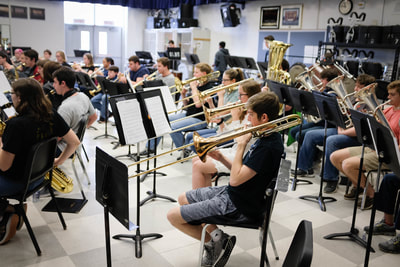
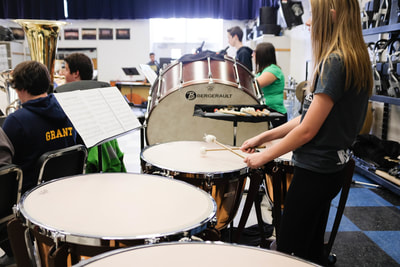
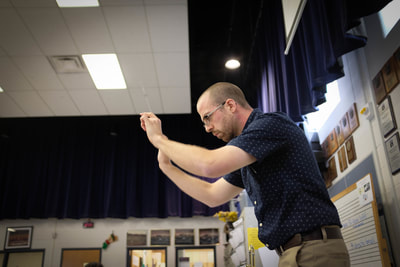
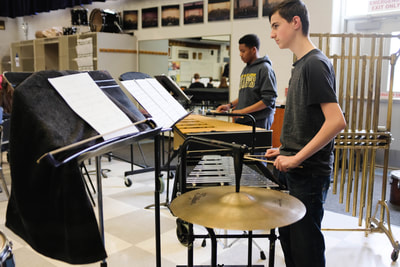
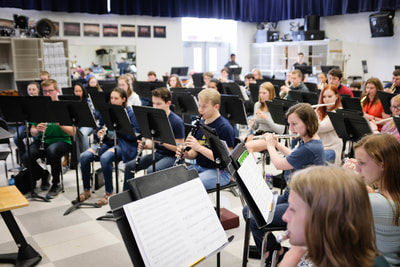
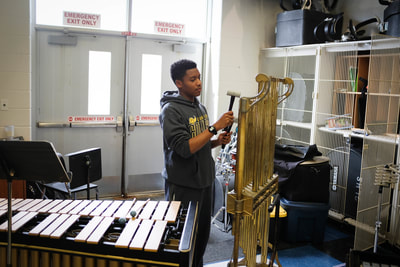
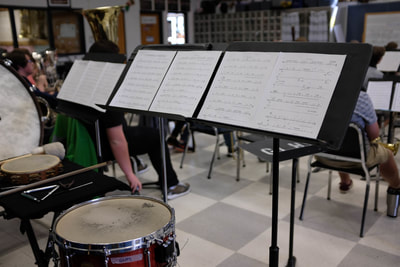
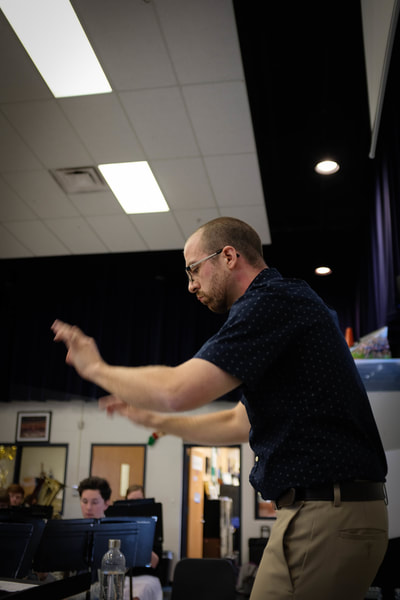
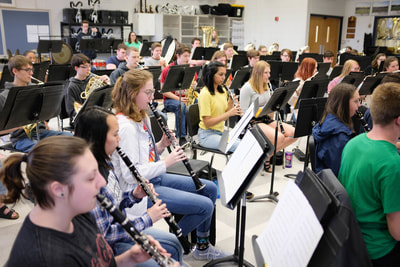
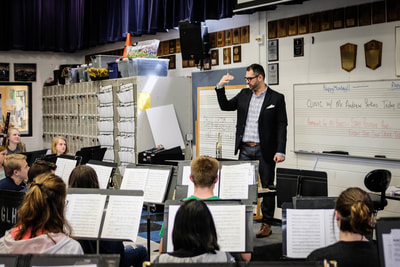
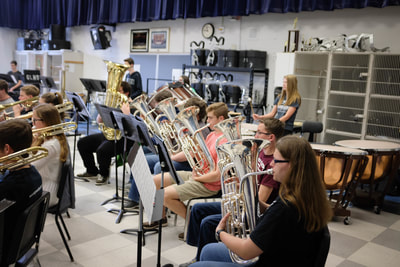
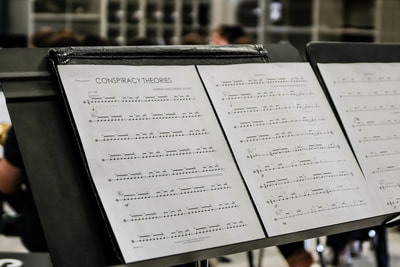
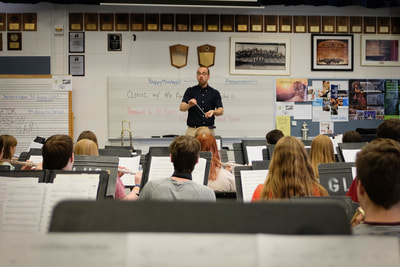
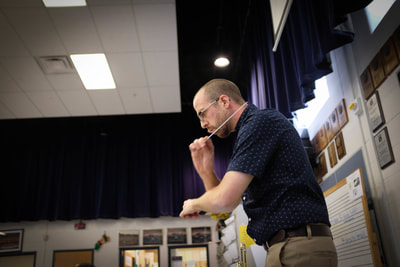
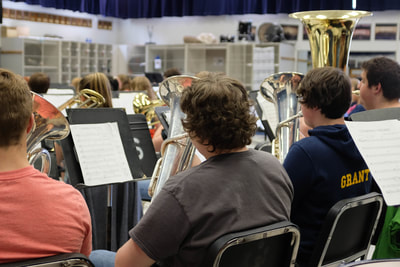
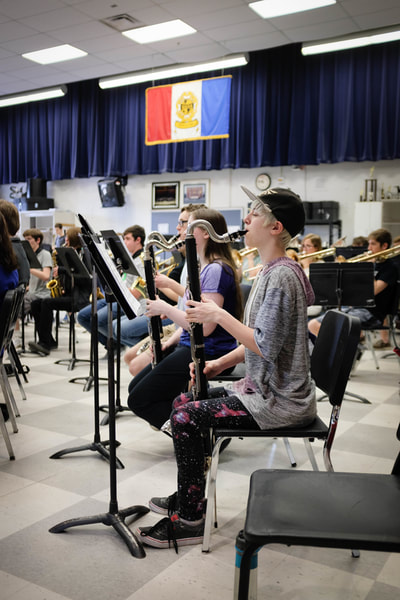
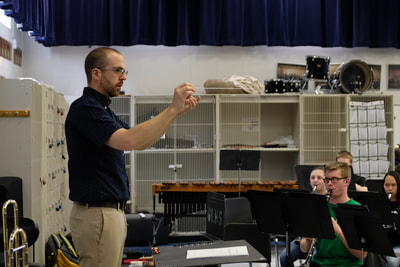
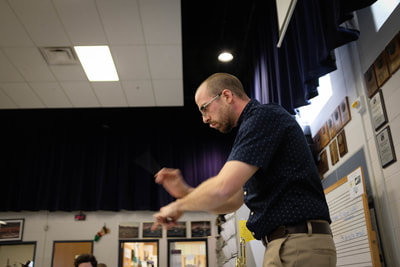
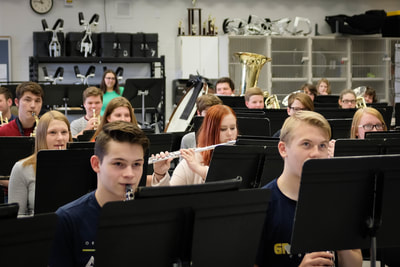
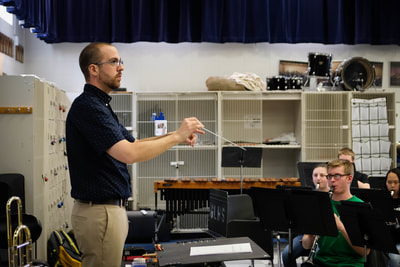
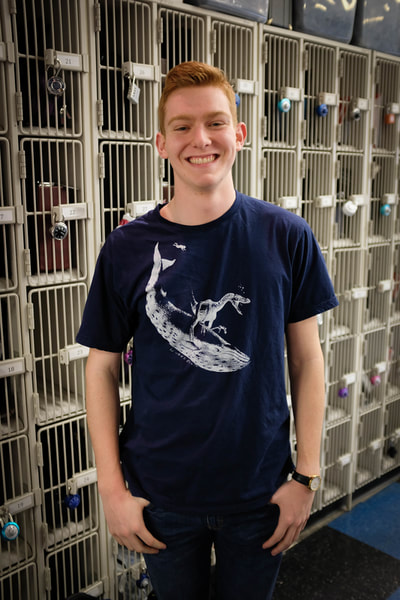
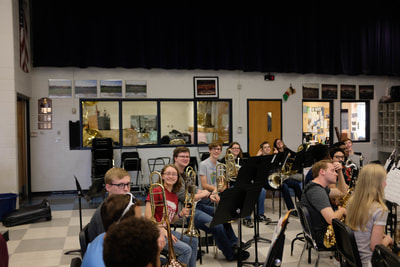
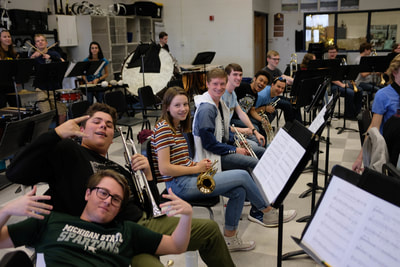
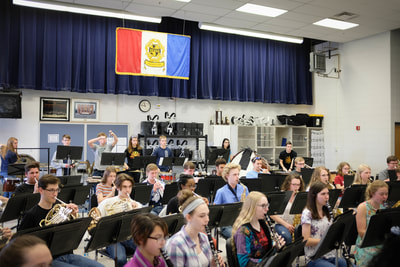
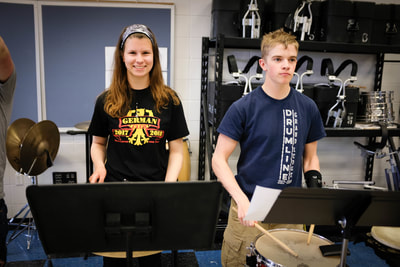
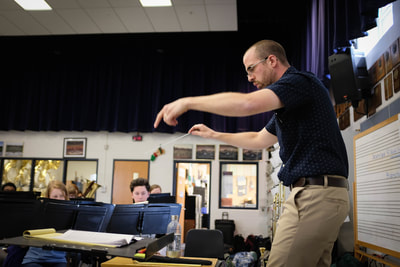
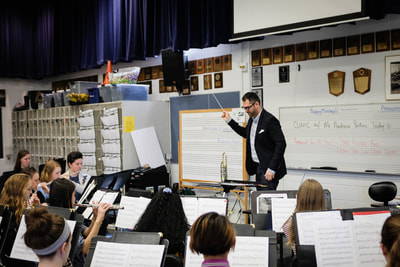
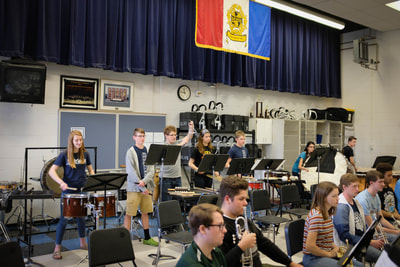
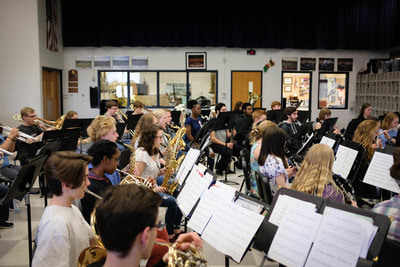
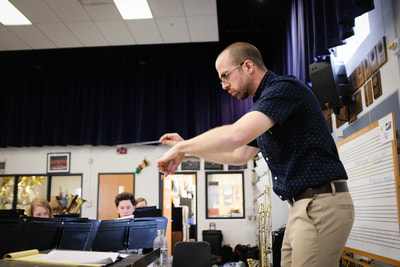
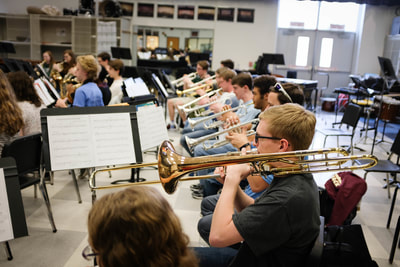
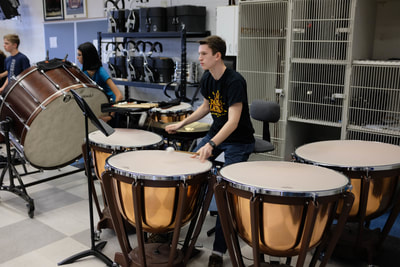
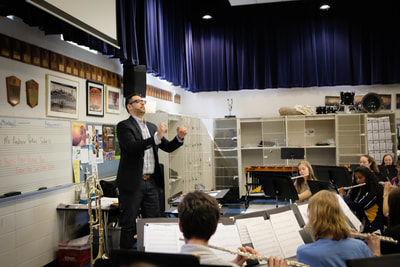
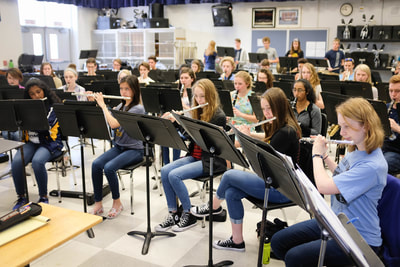
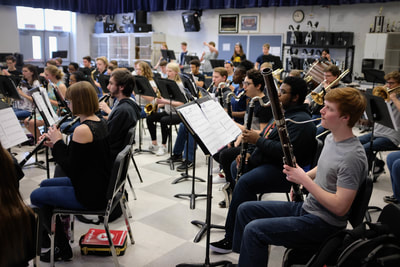
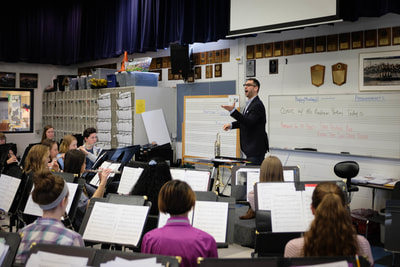
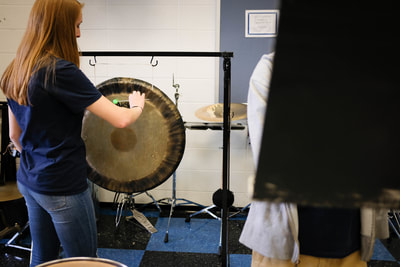
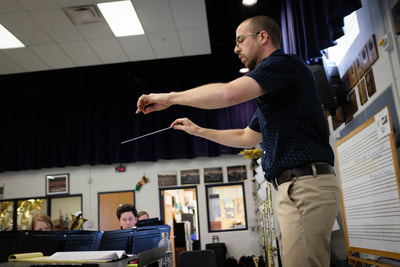
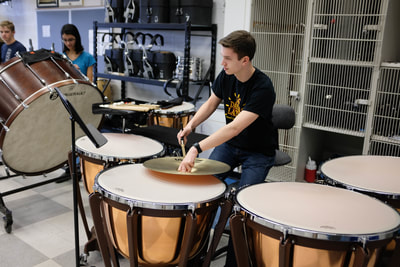
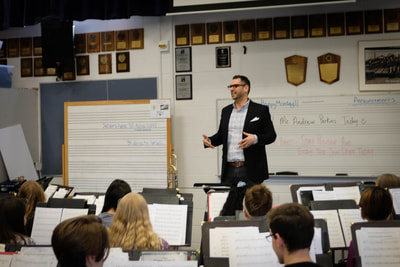
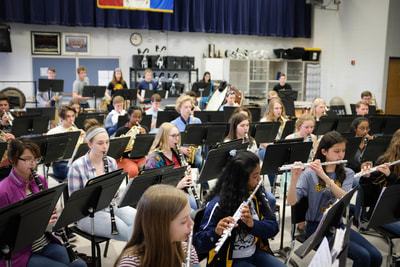
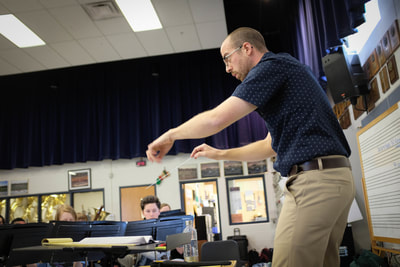
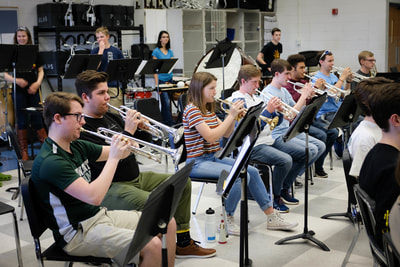
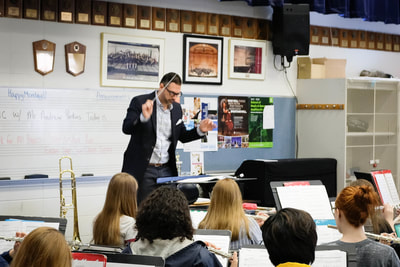
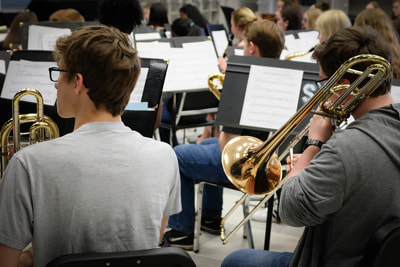
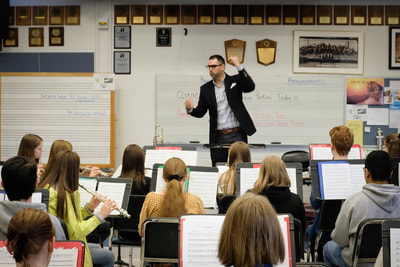
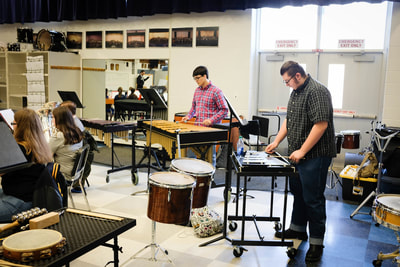
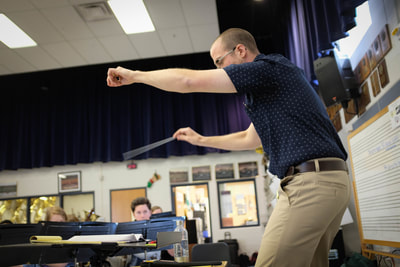
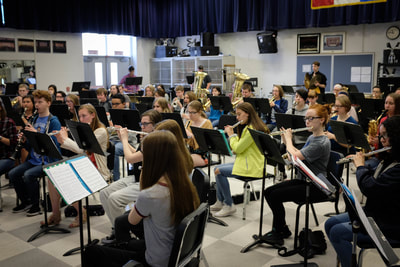
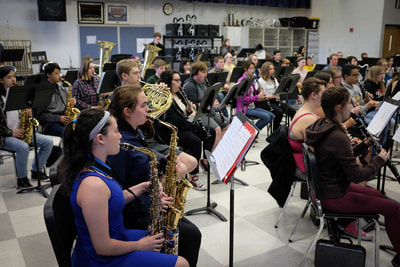
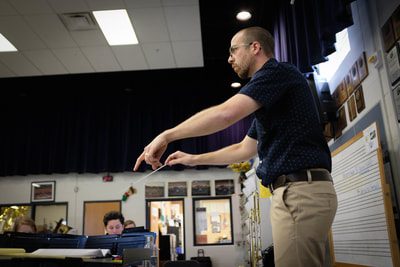
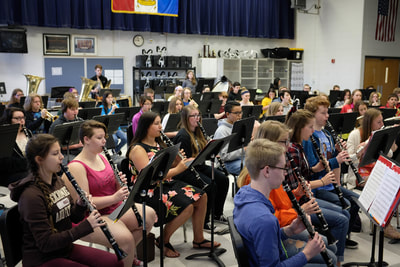
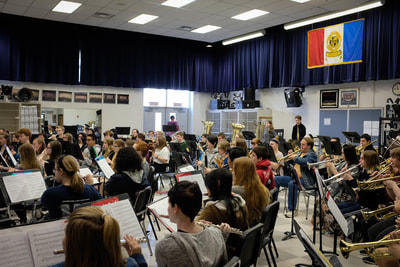
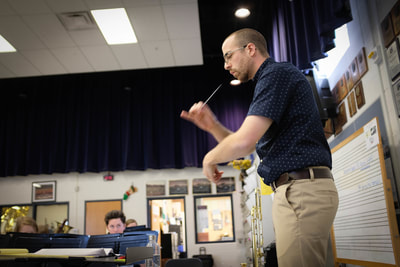
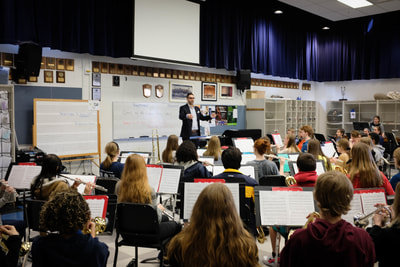
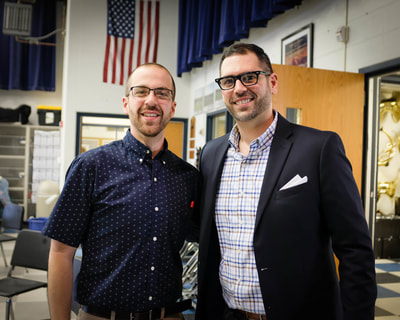
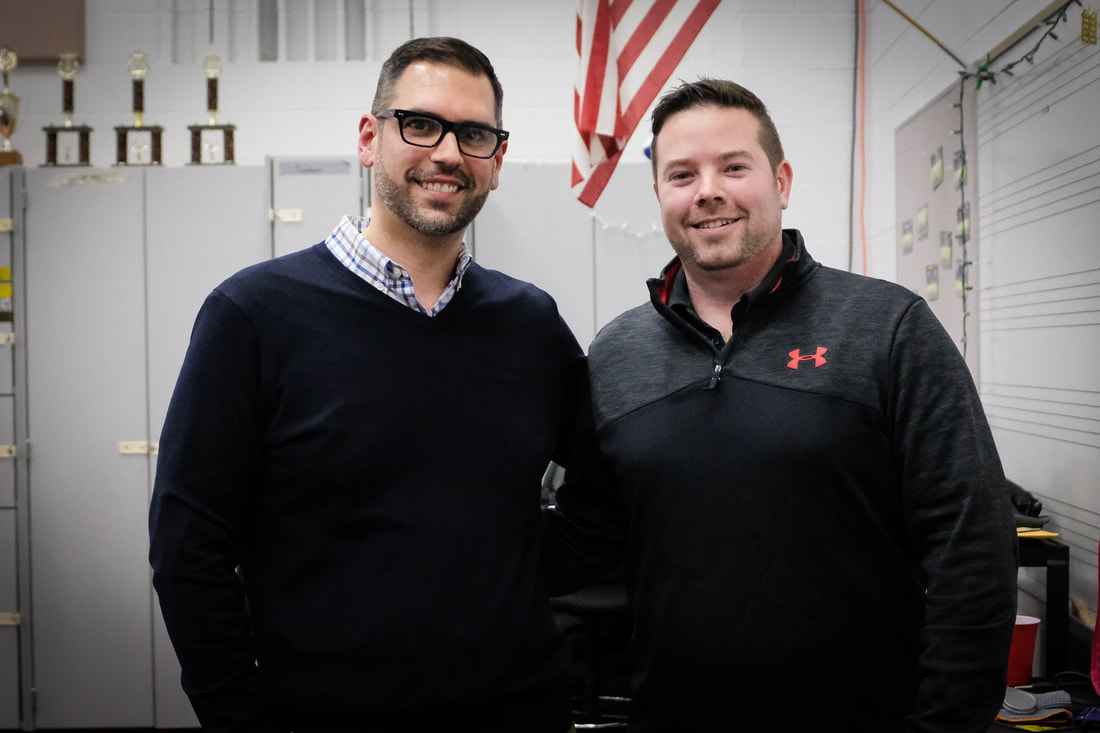
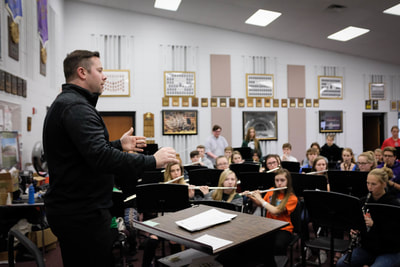
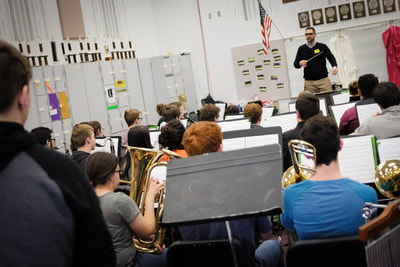
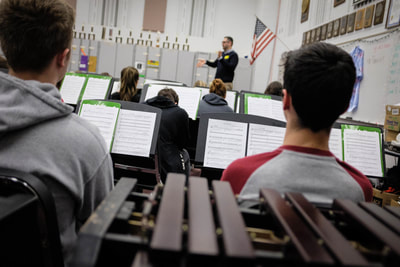
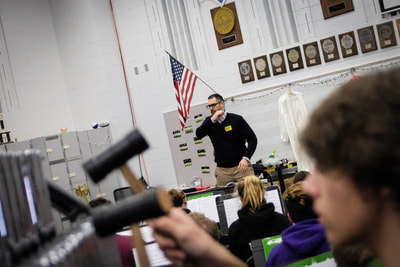
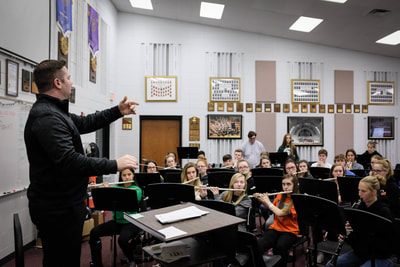
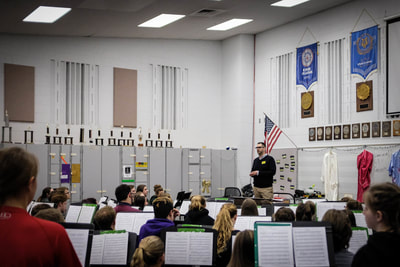
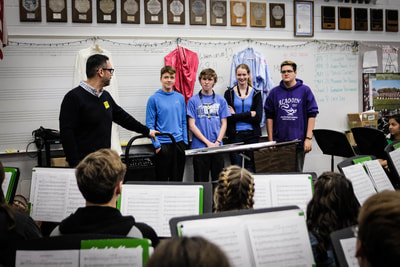
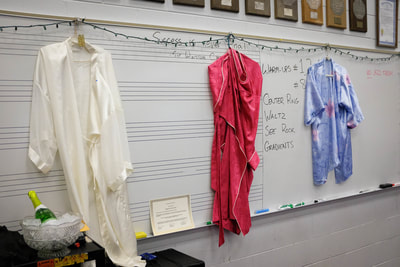
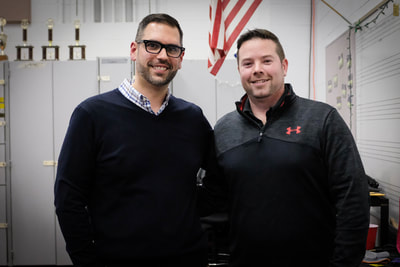
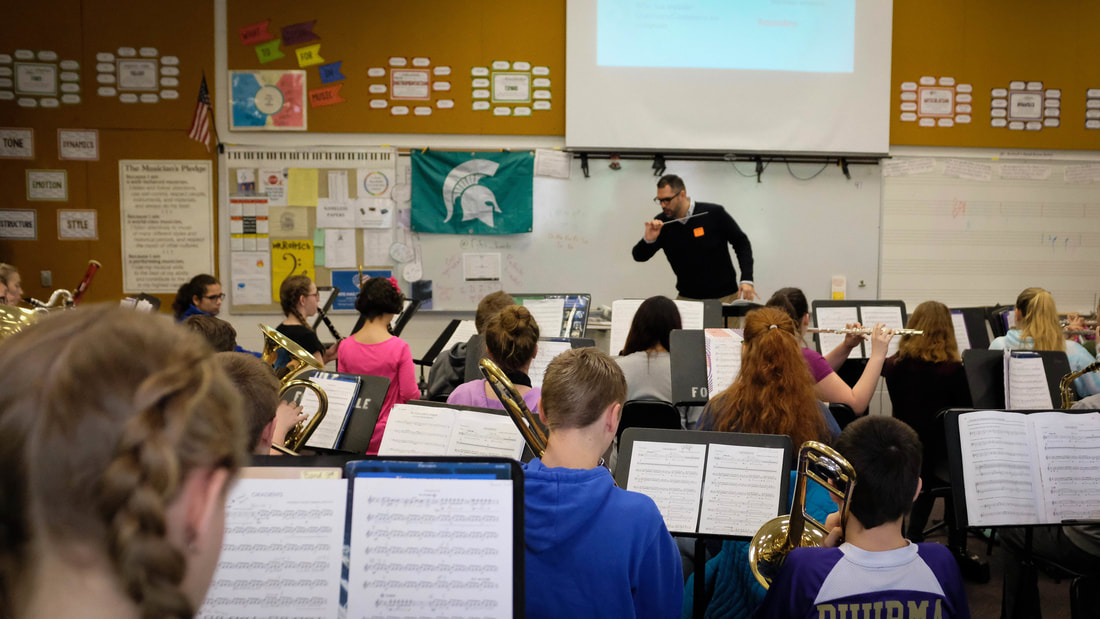
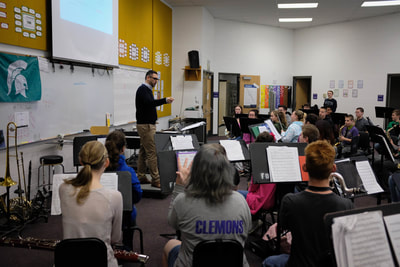
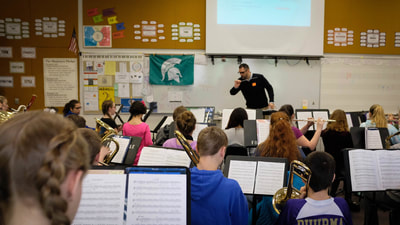
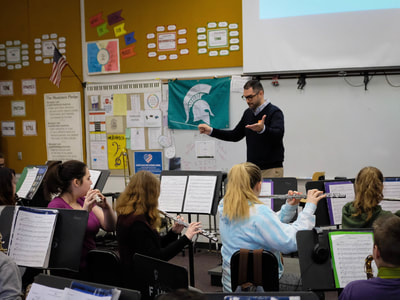
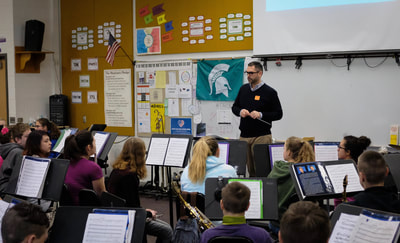
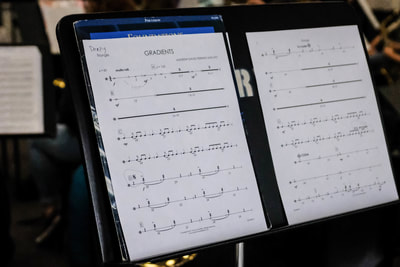
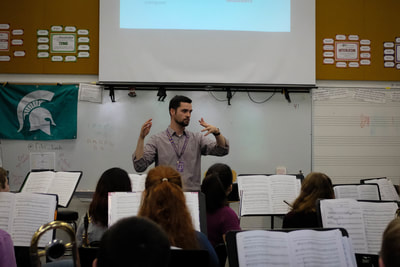
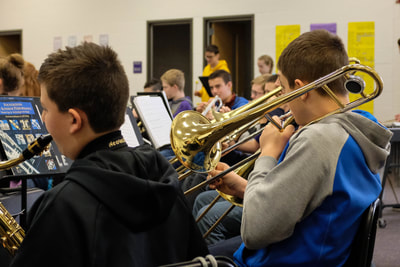
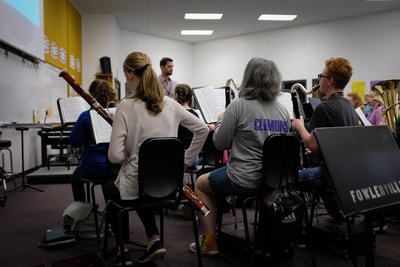
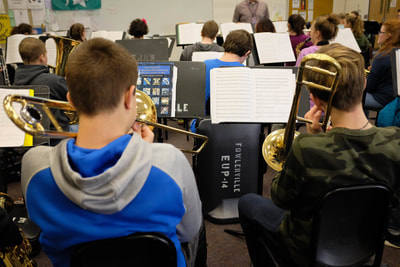
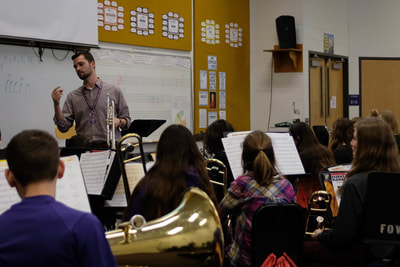
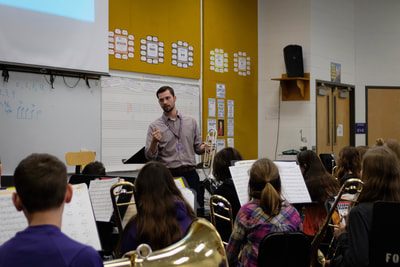
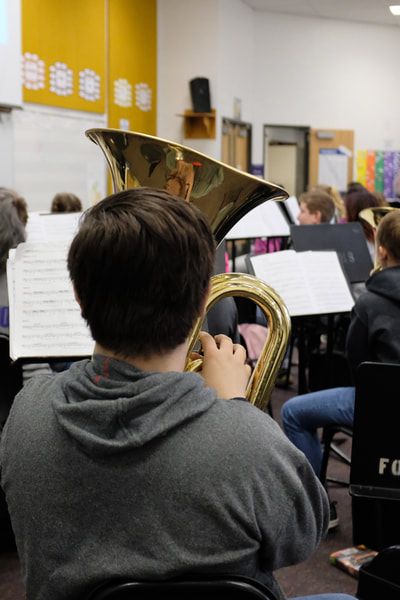
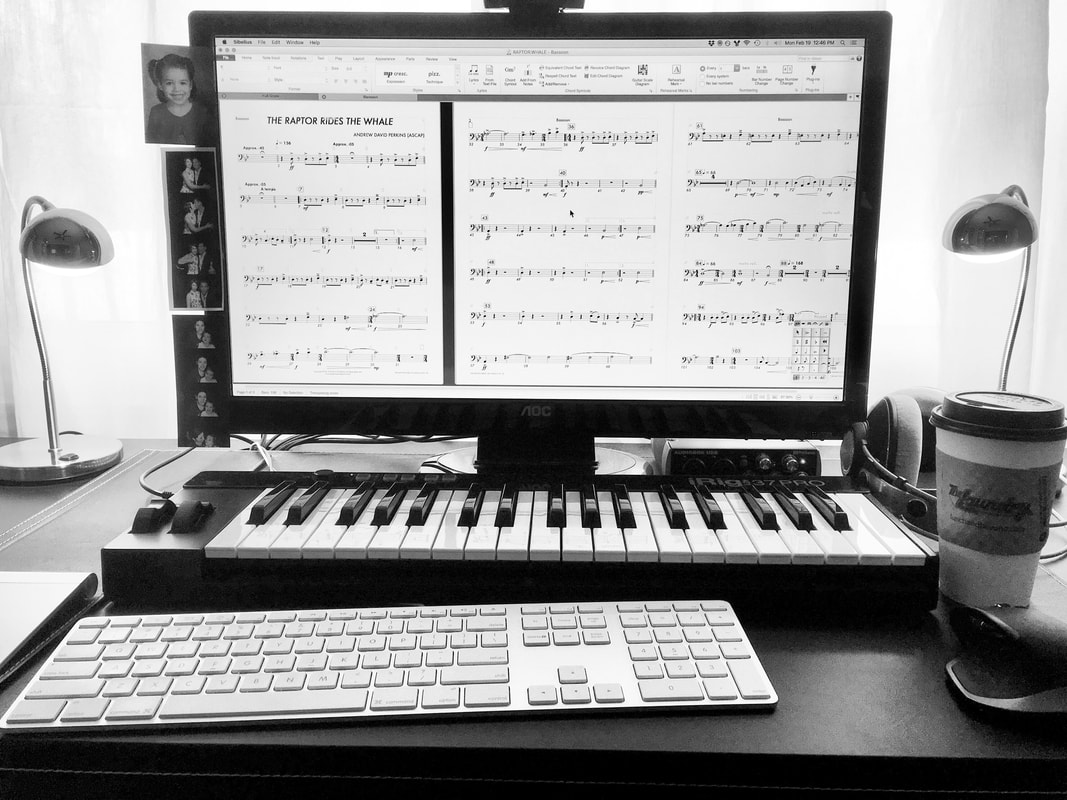
 RSS Feed
RSS Feed